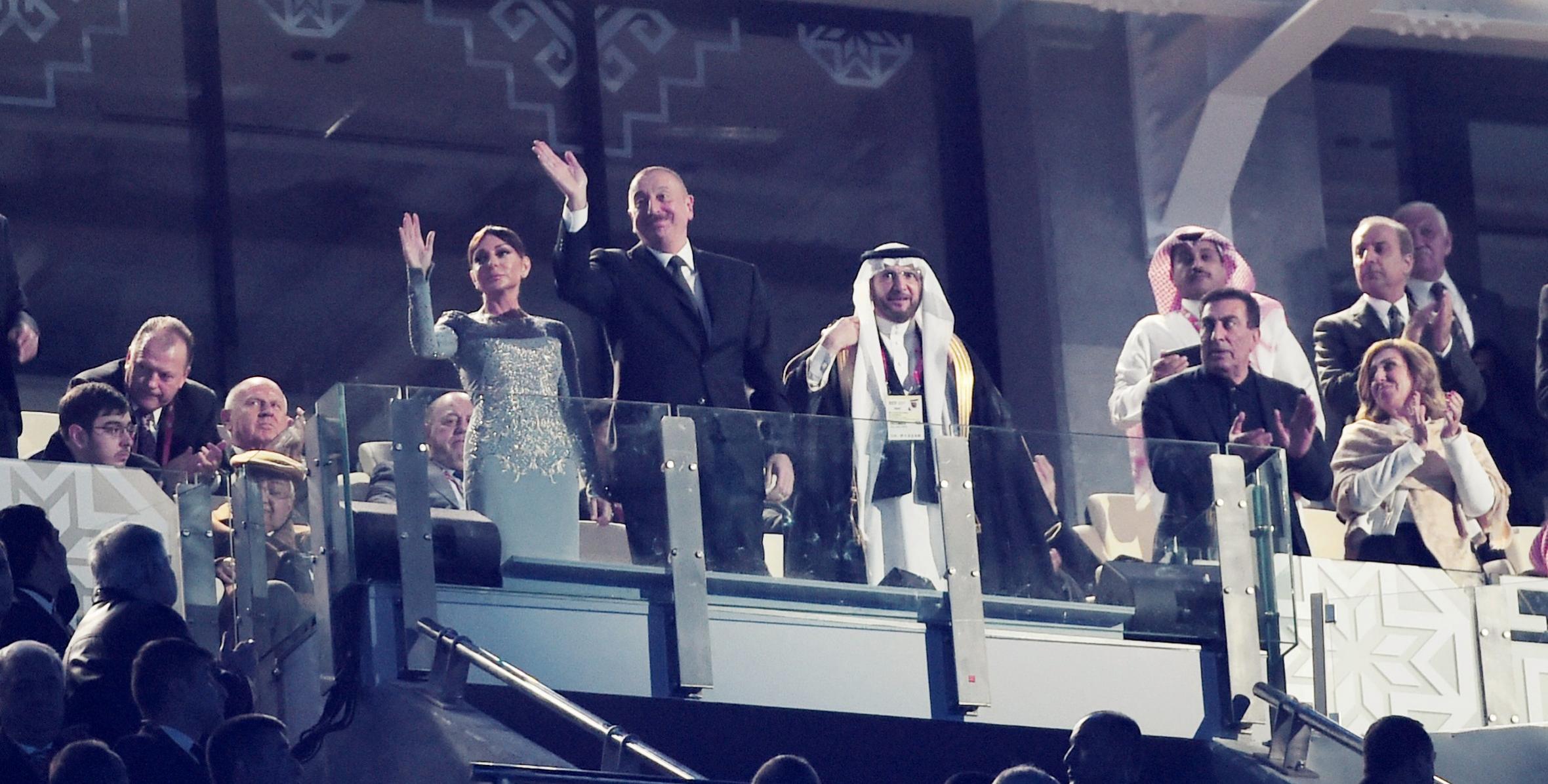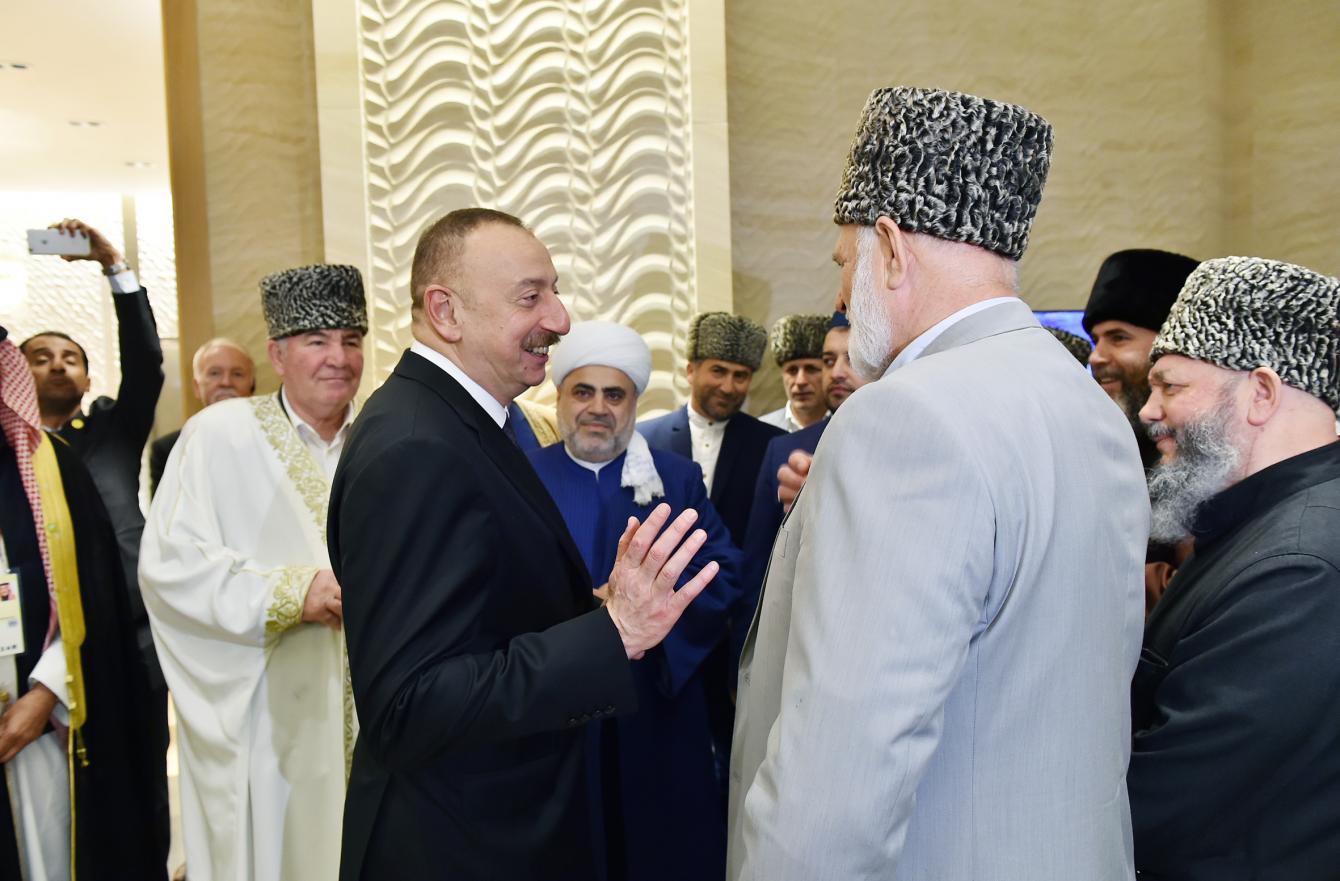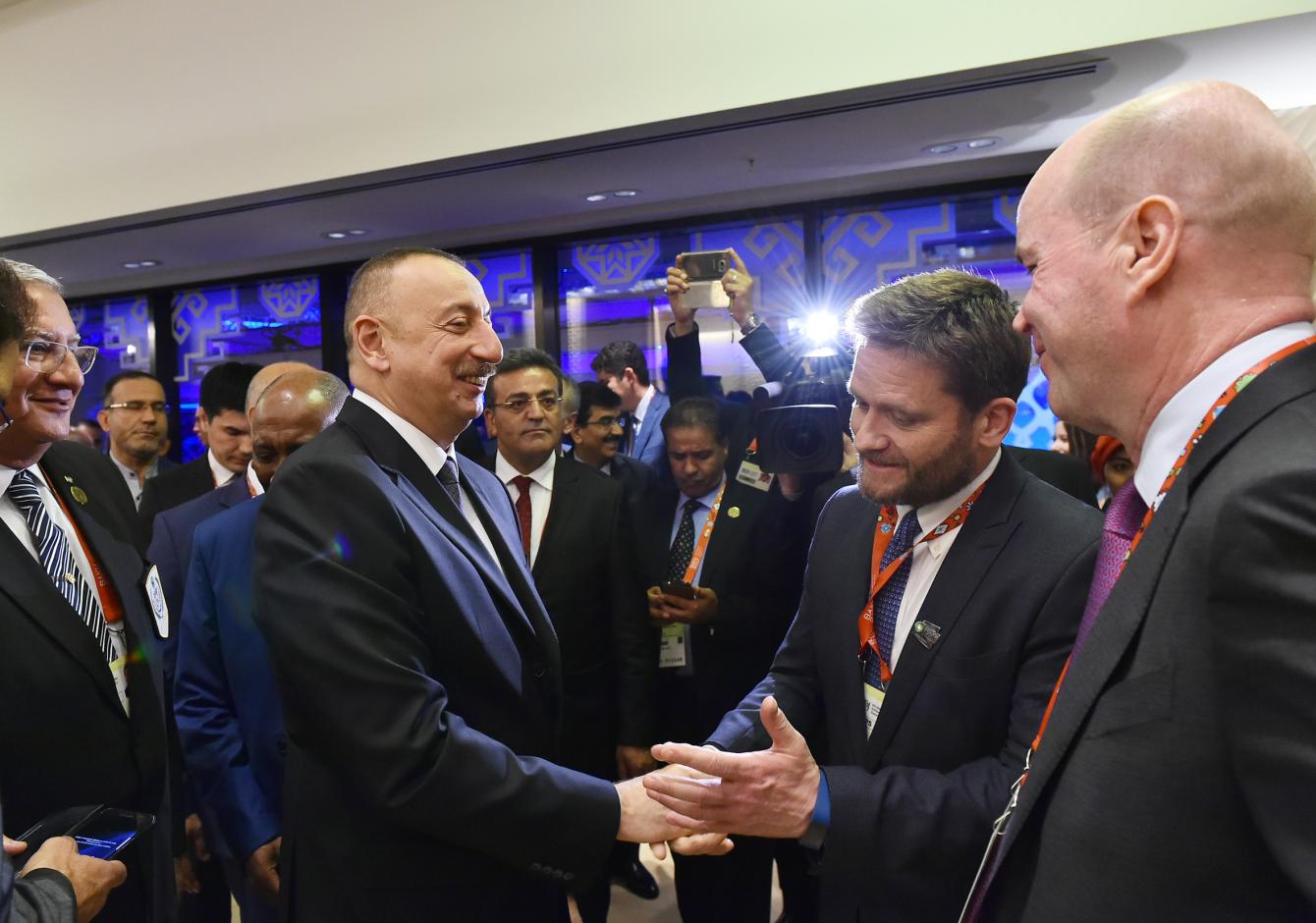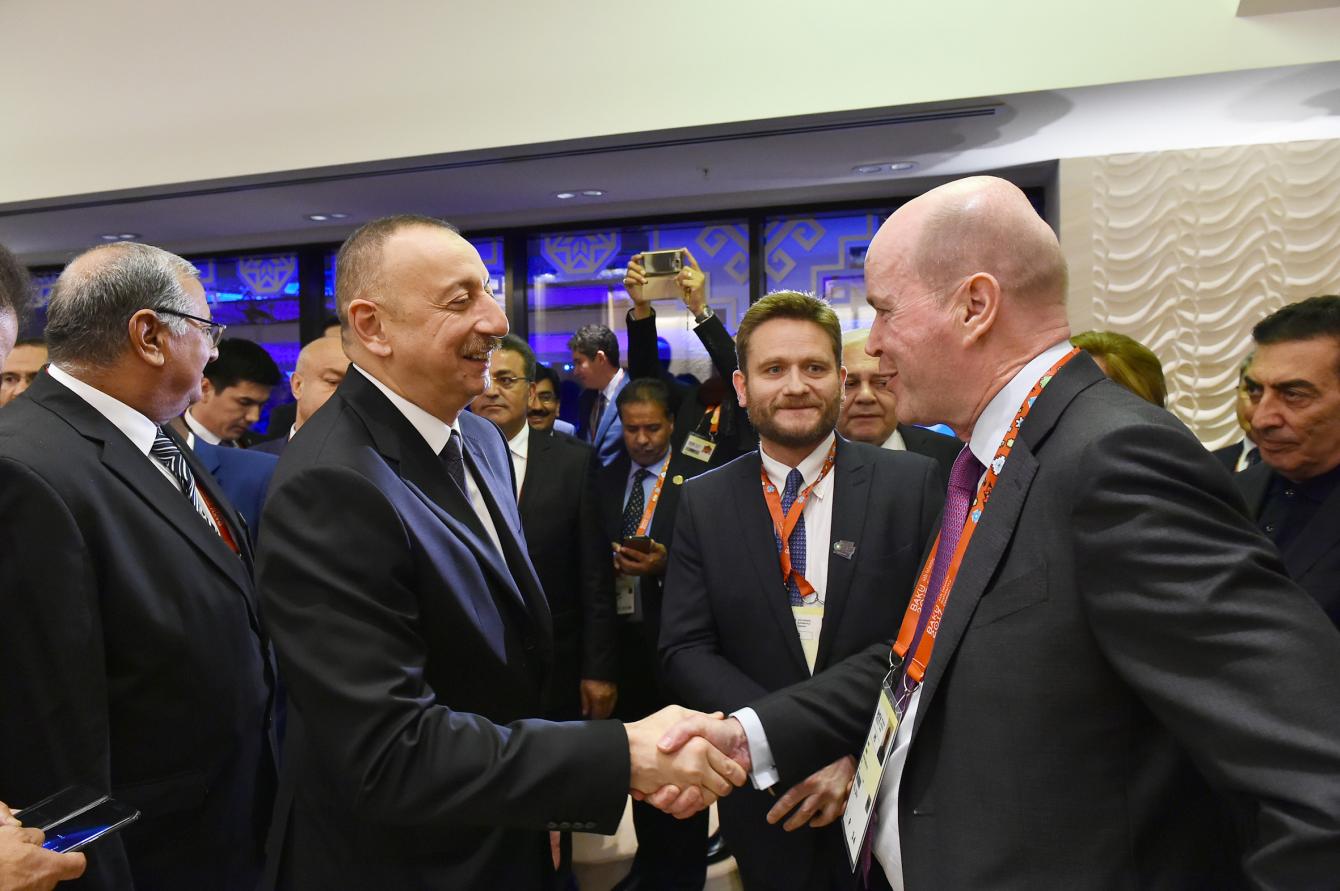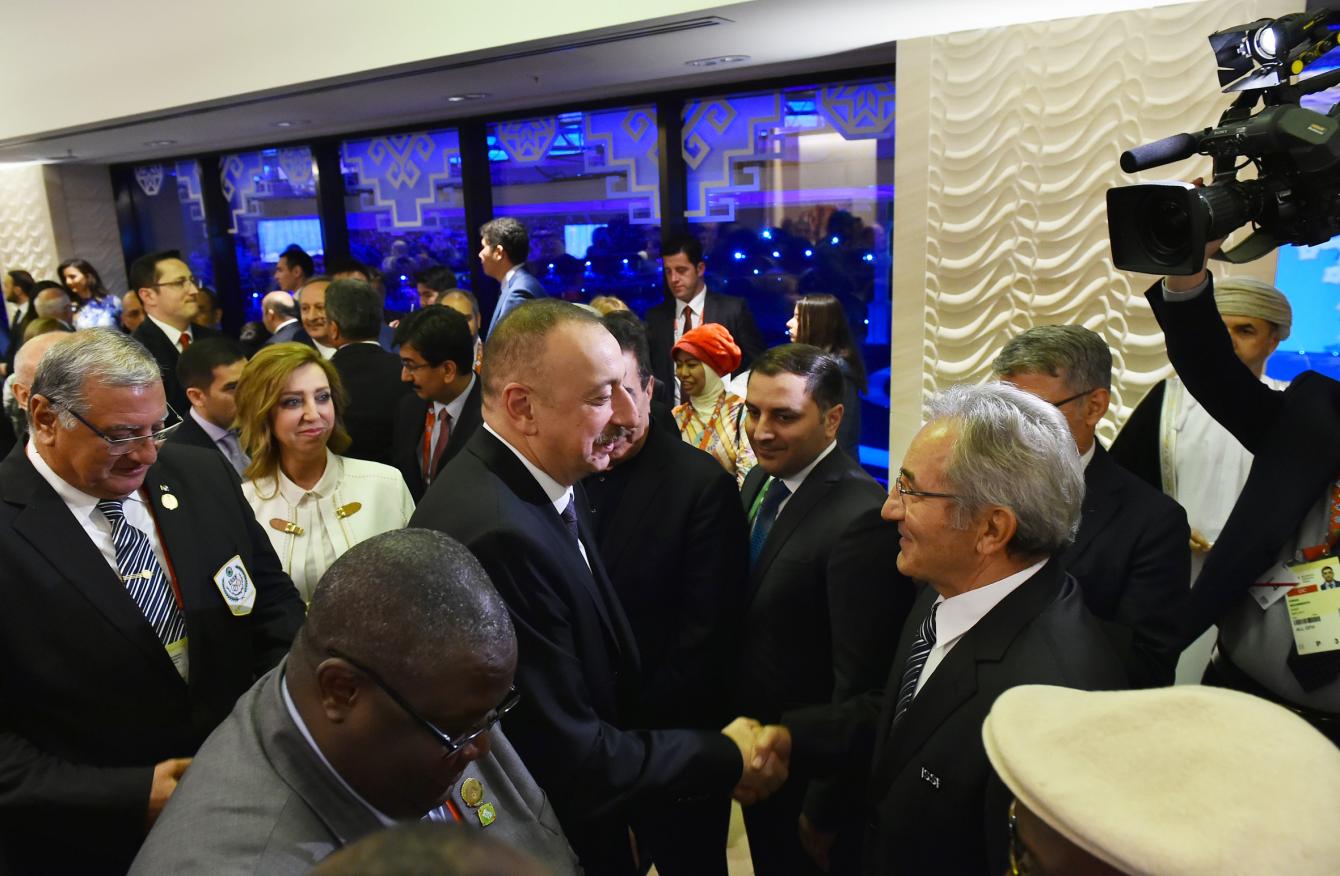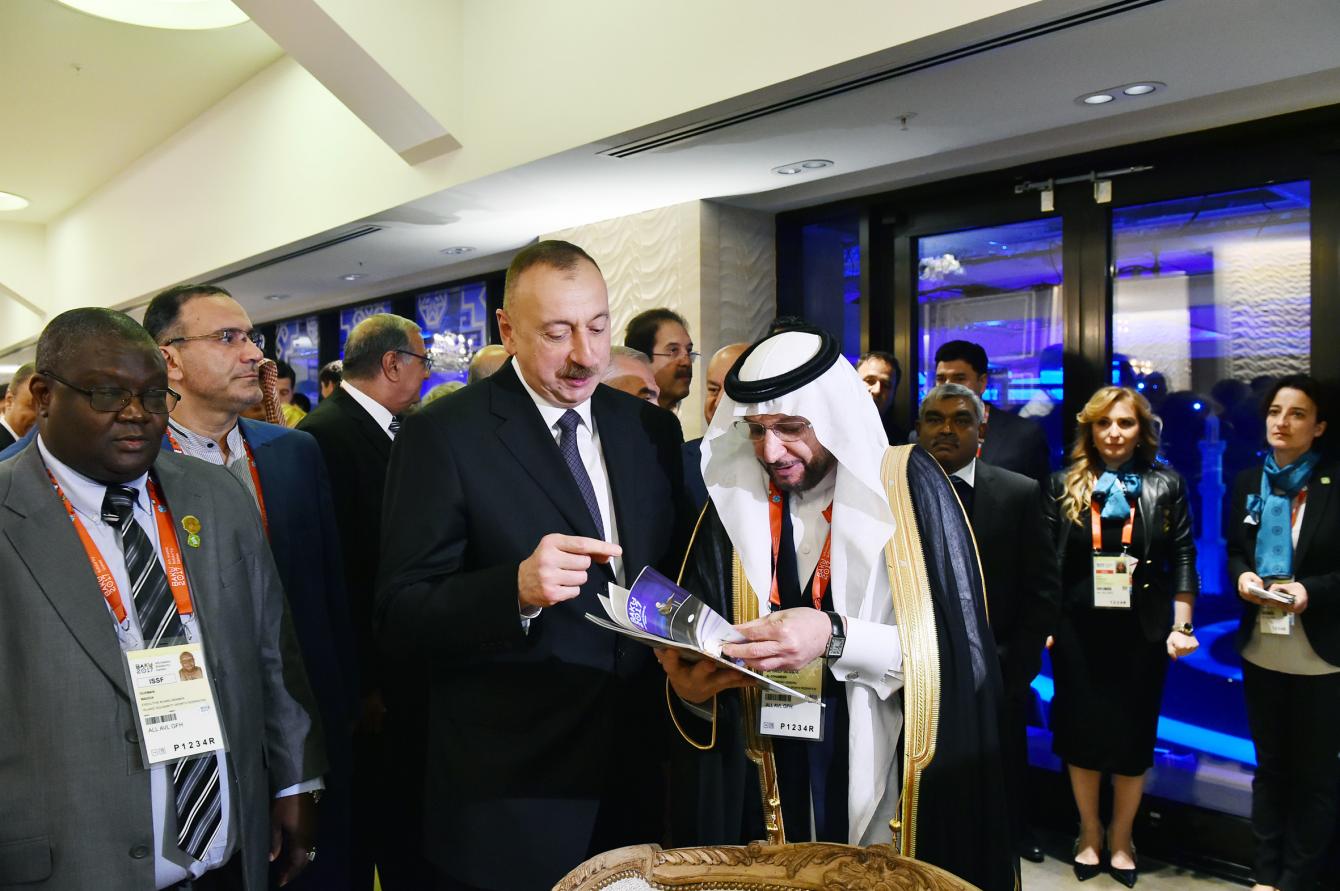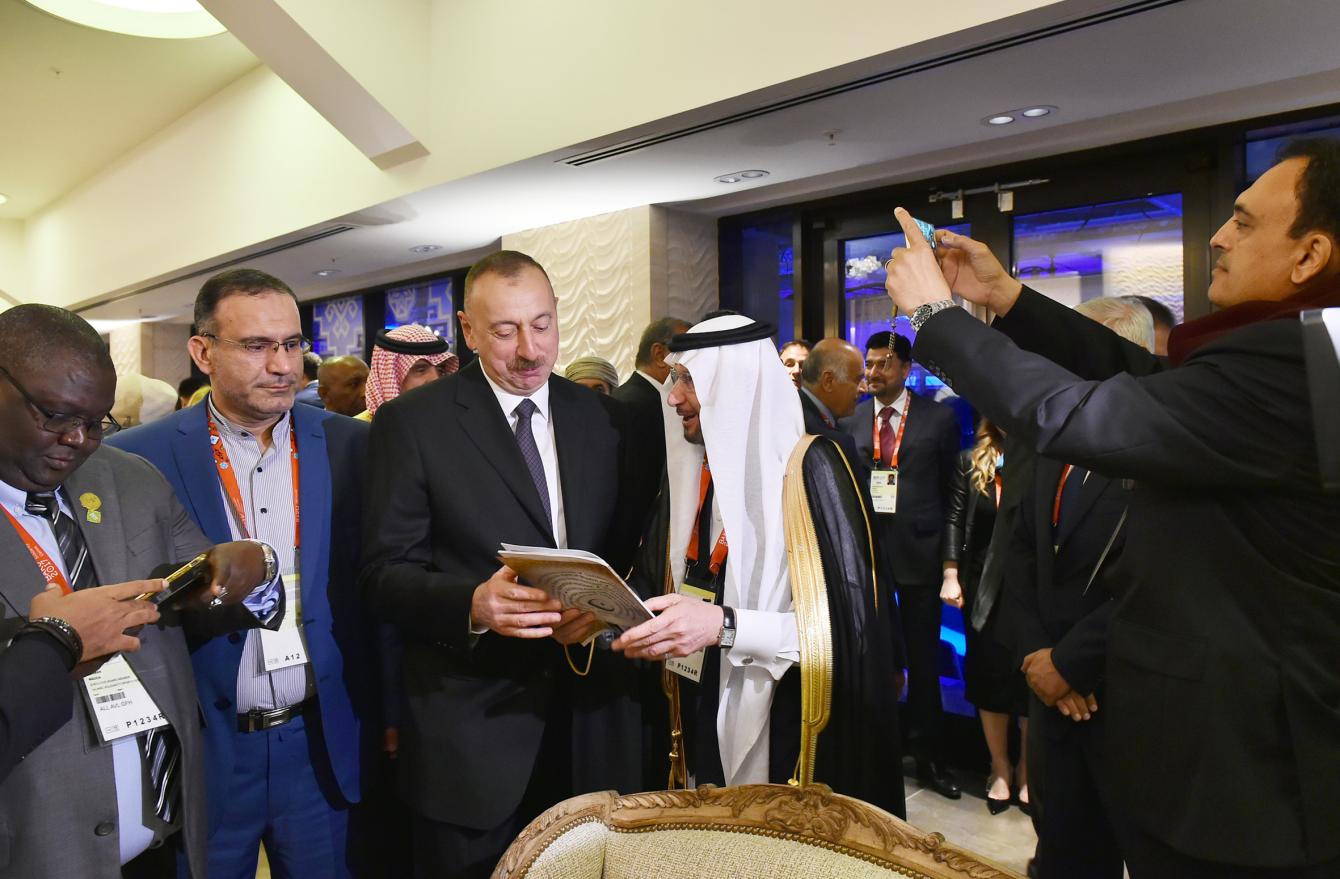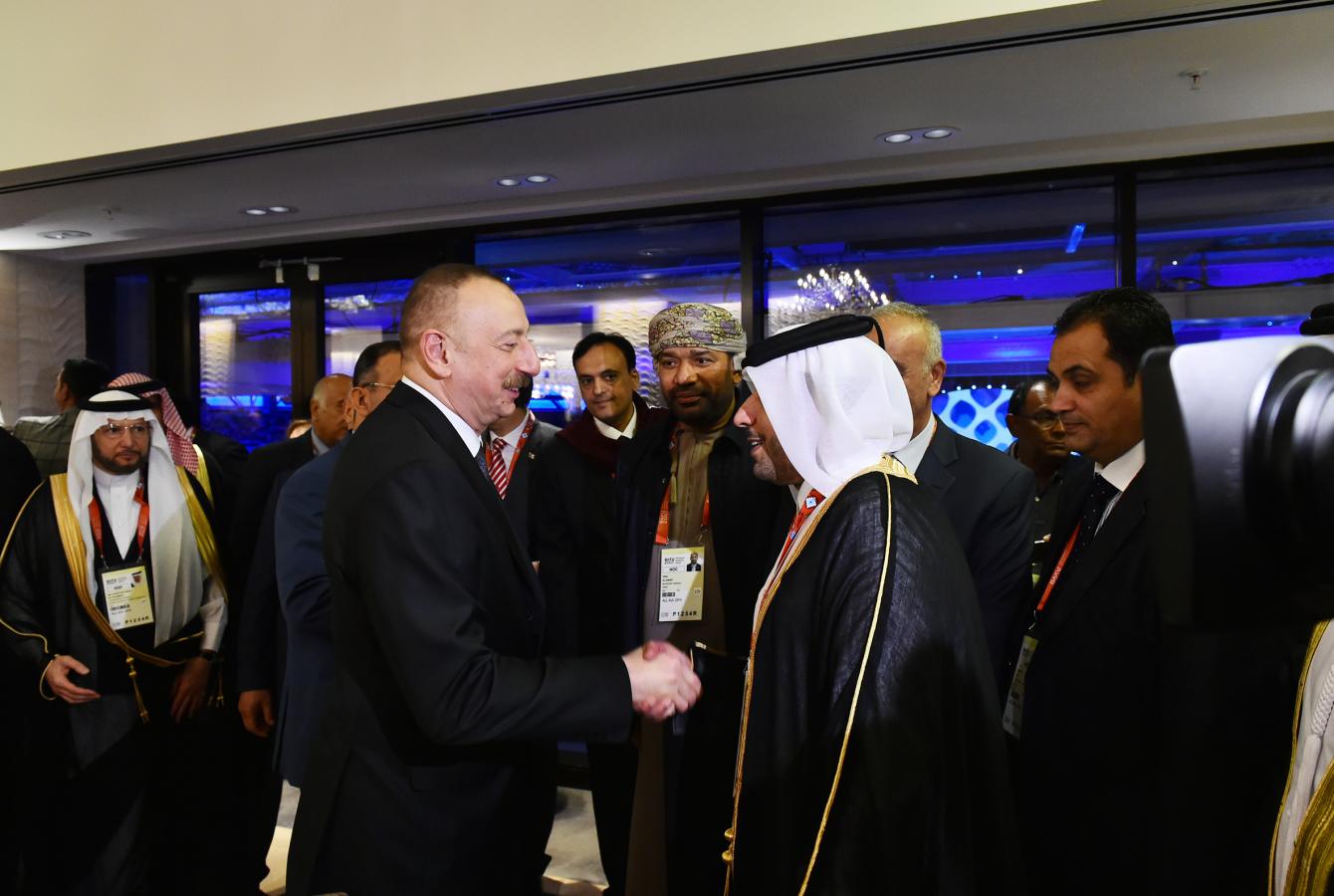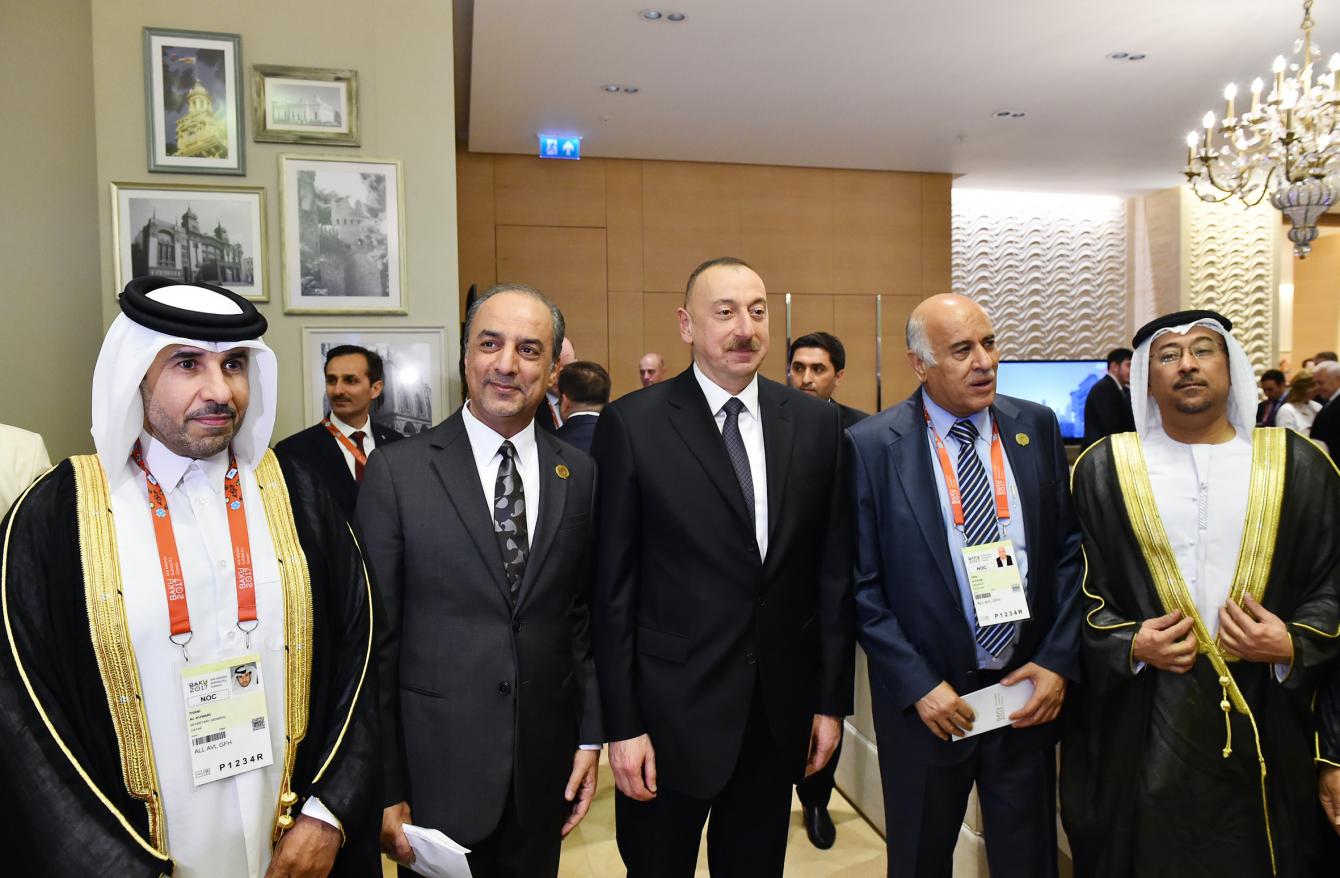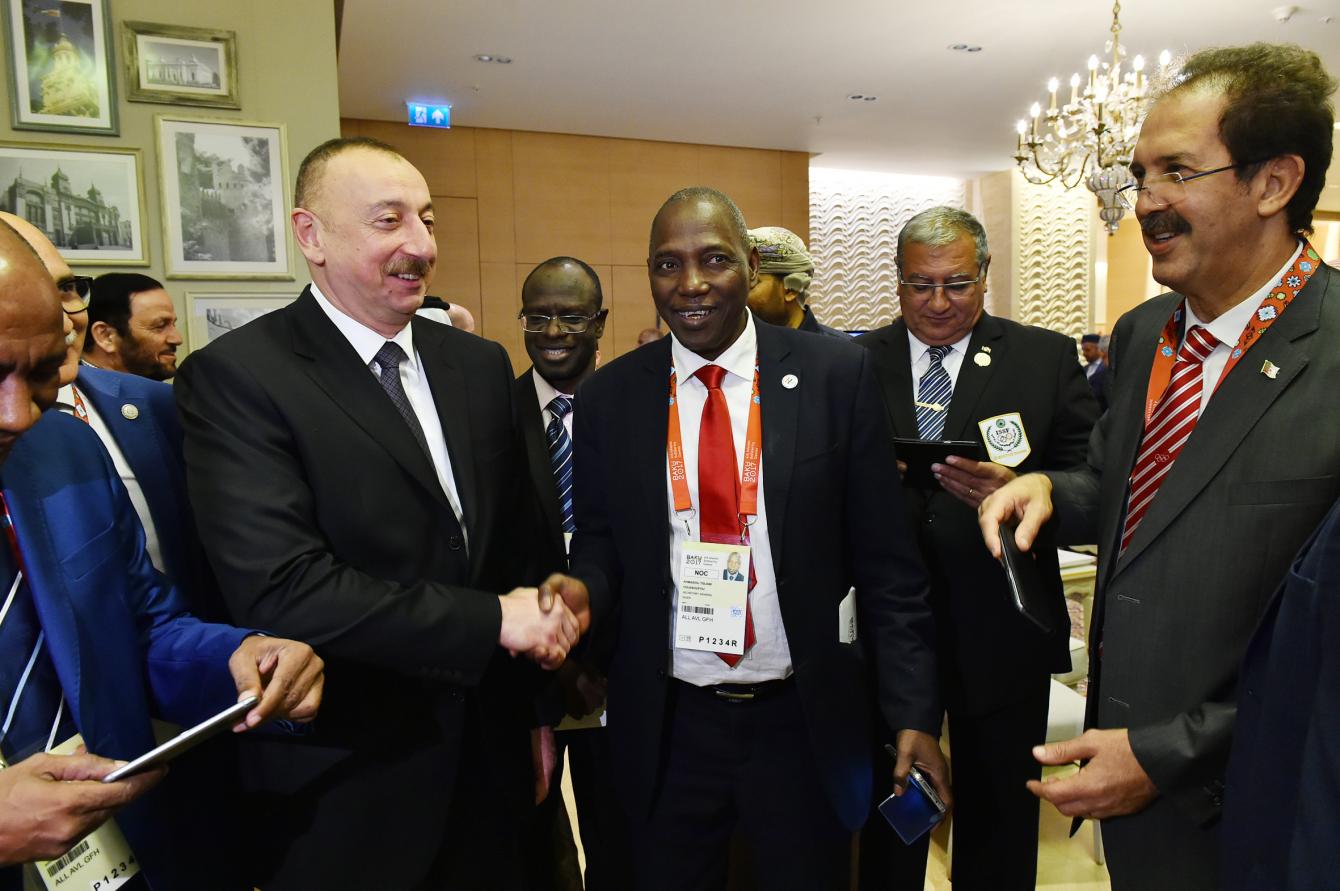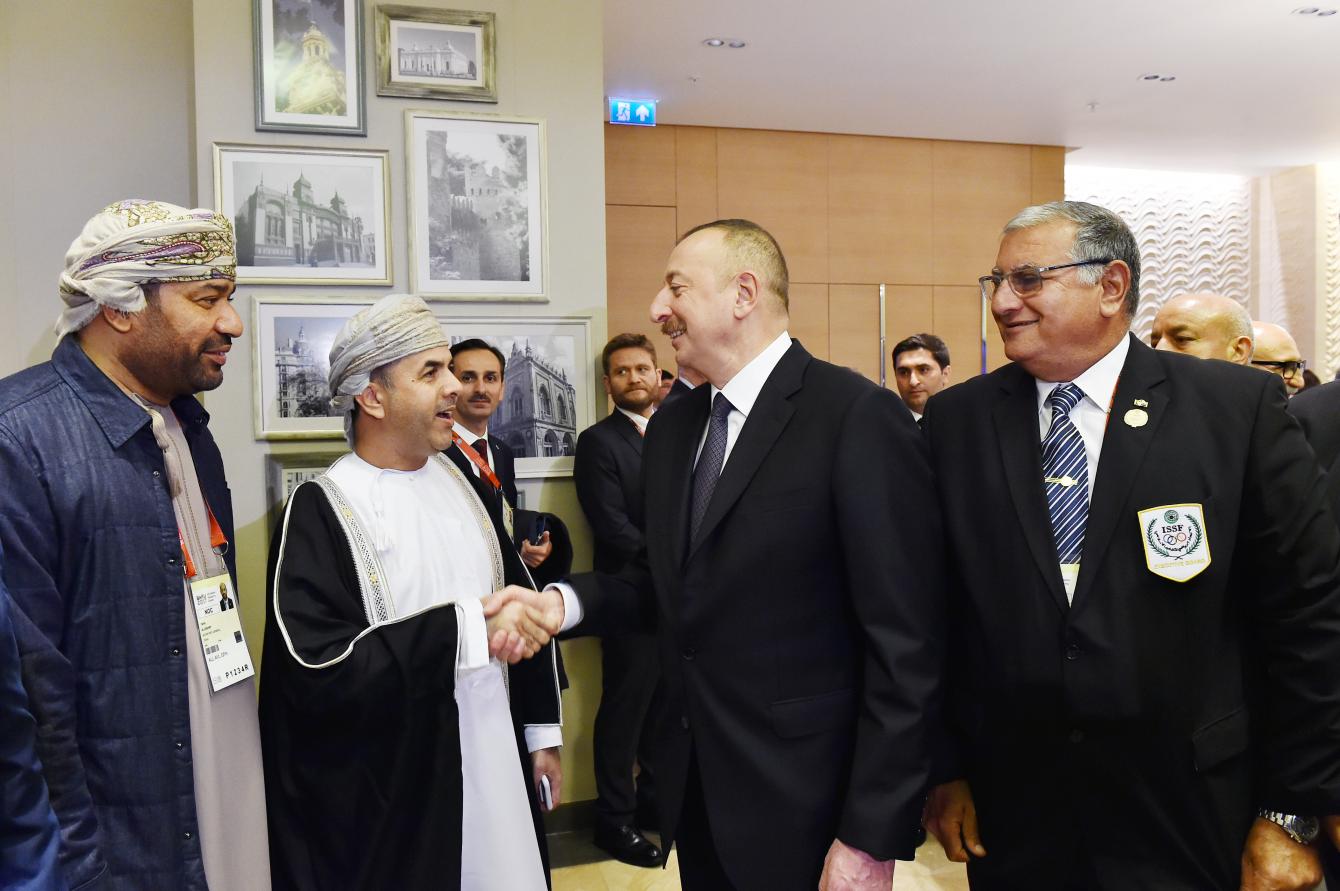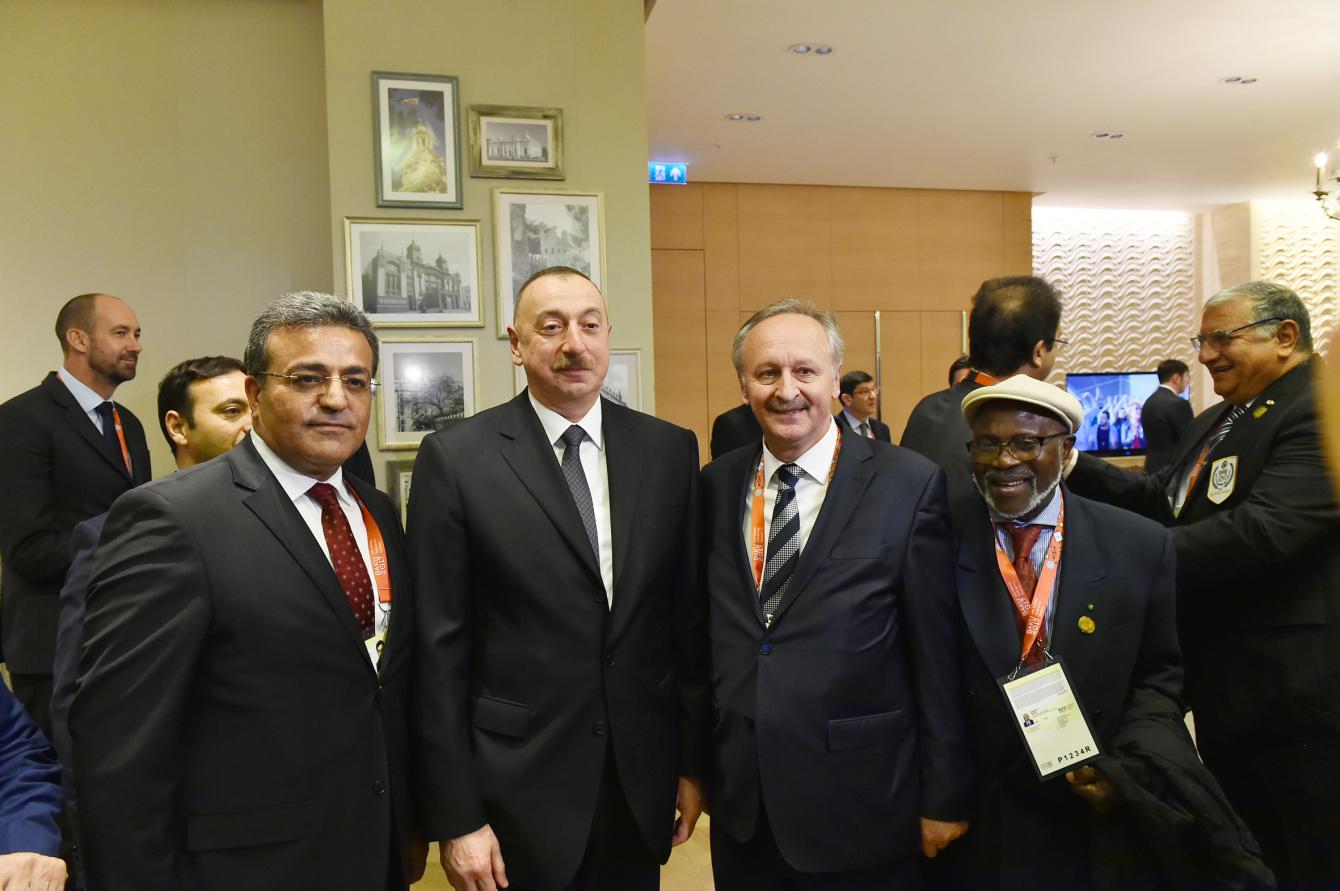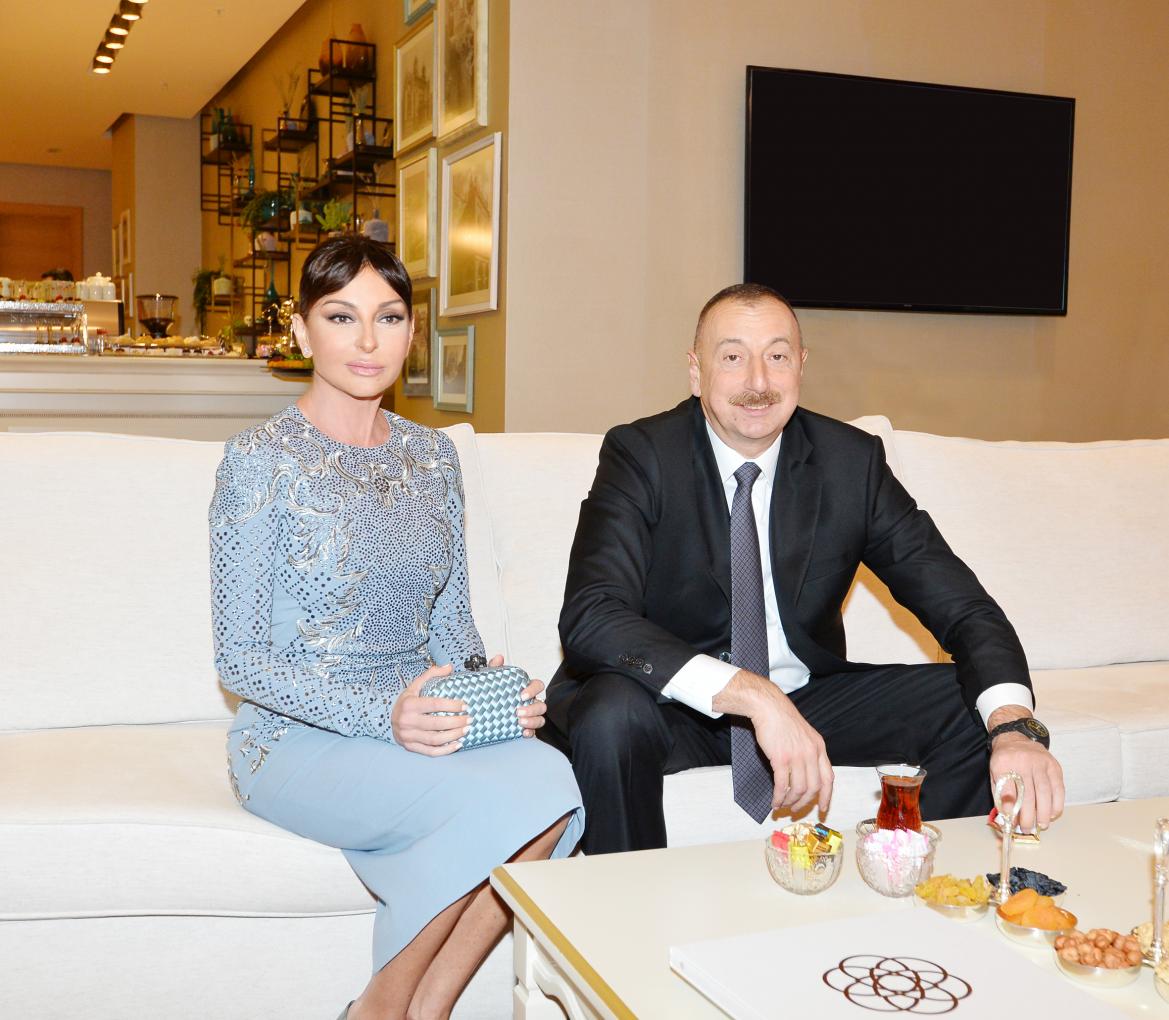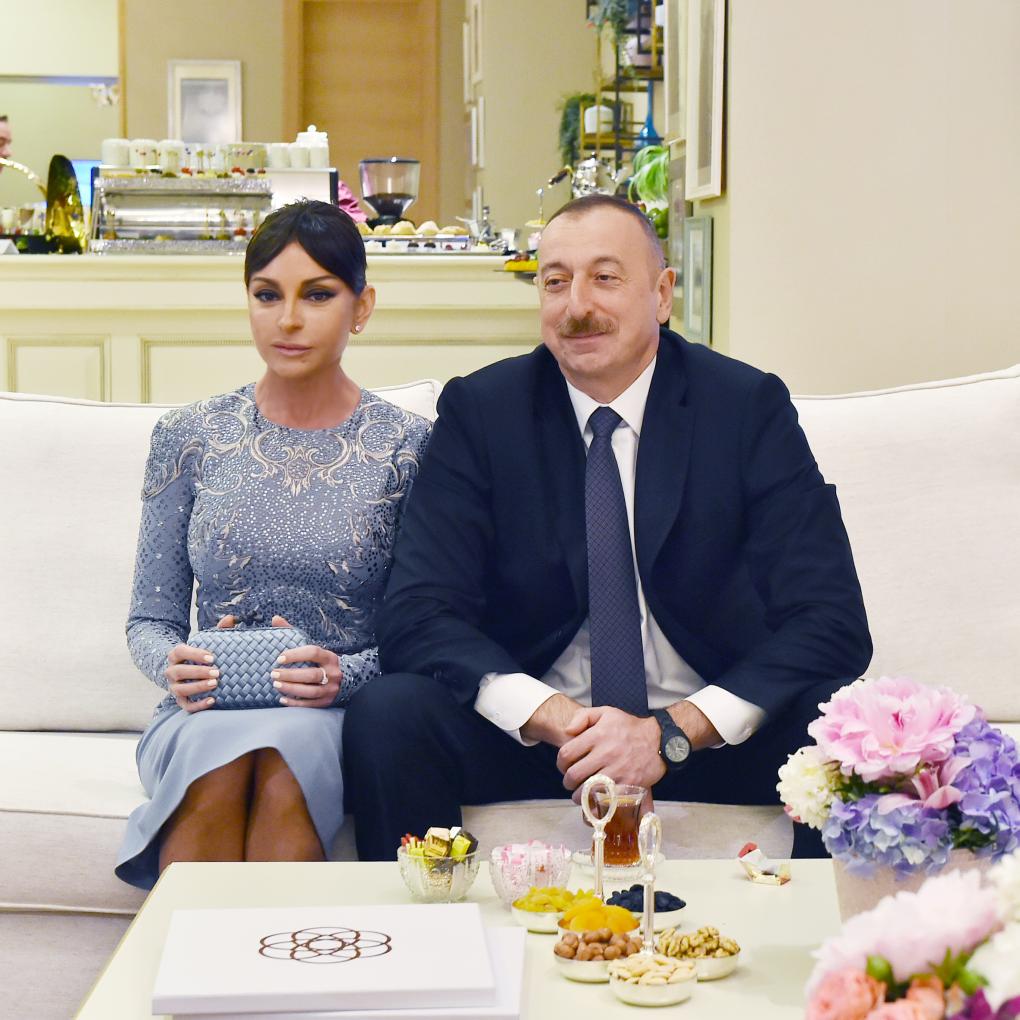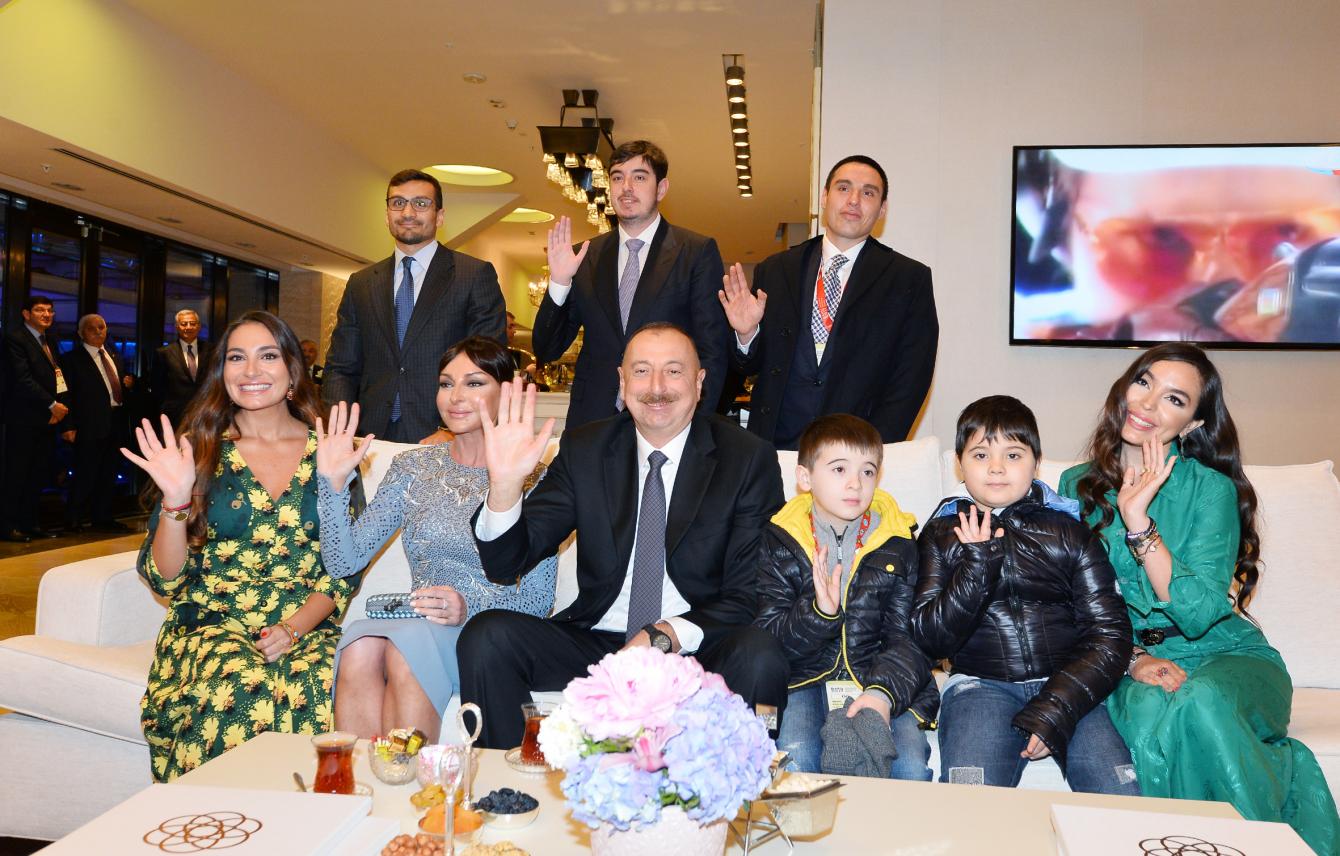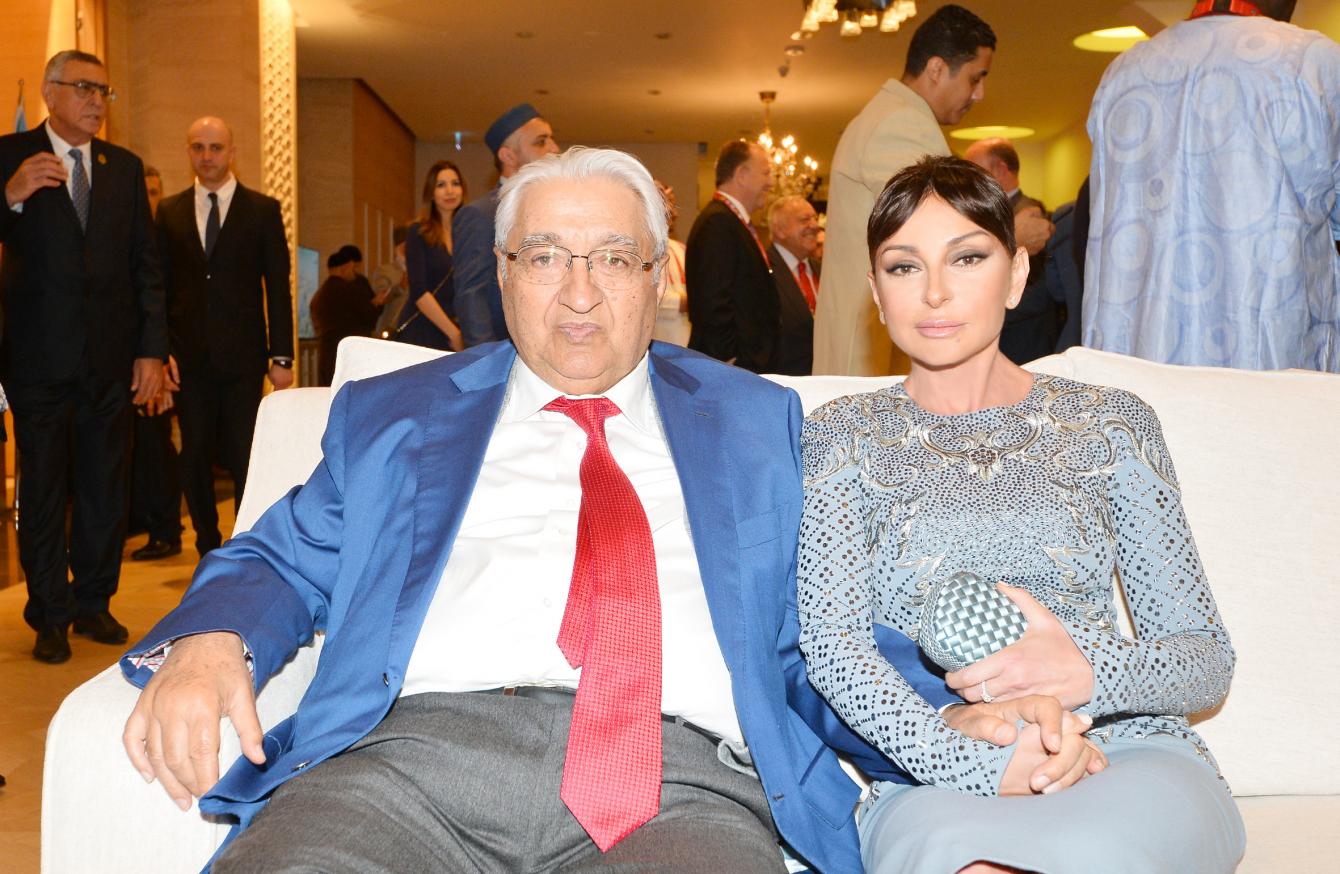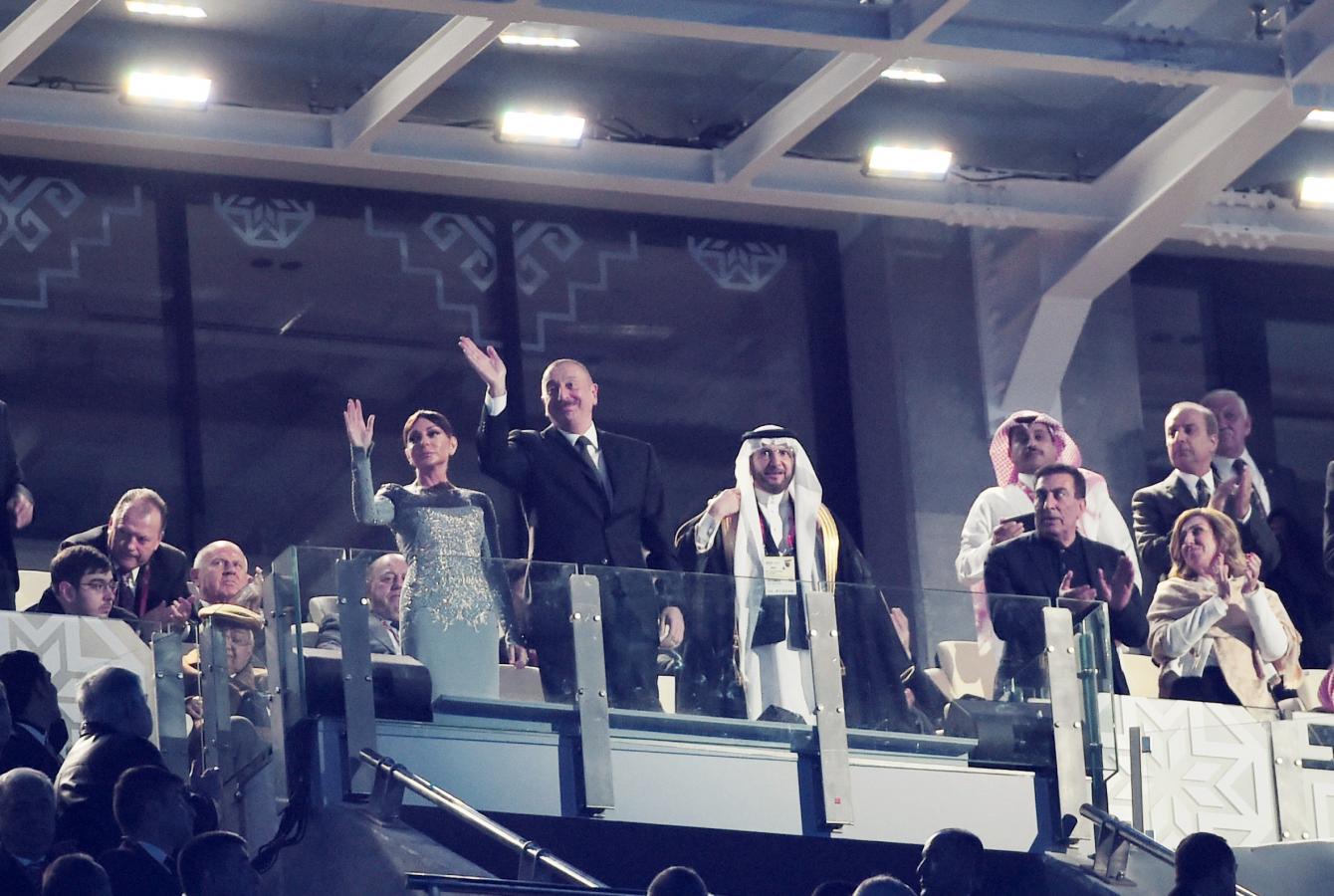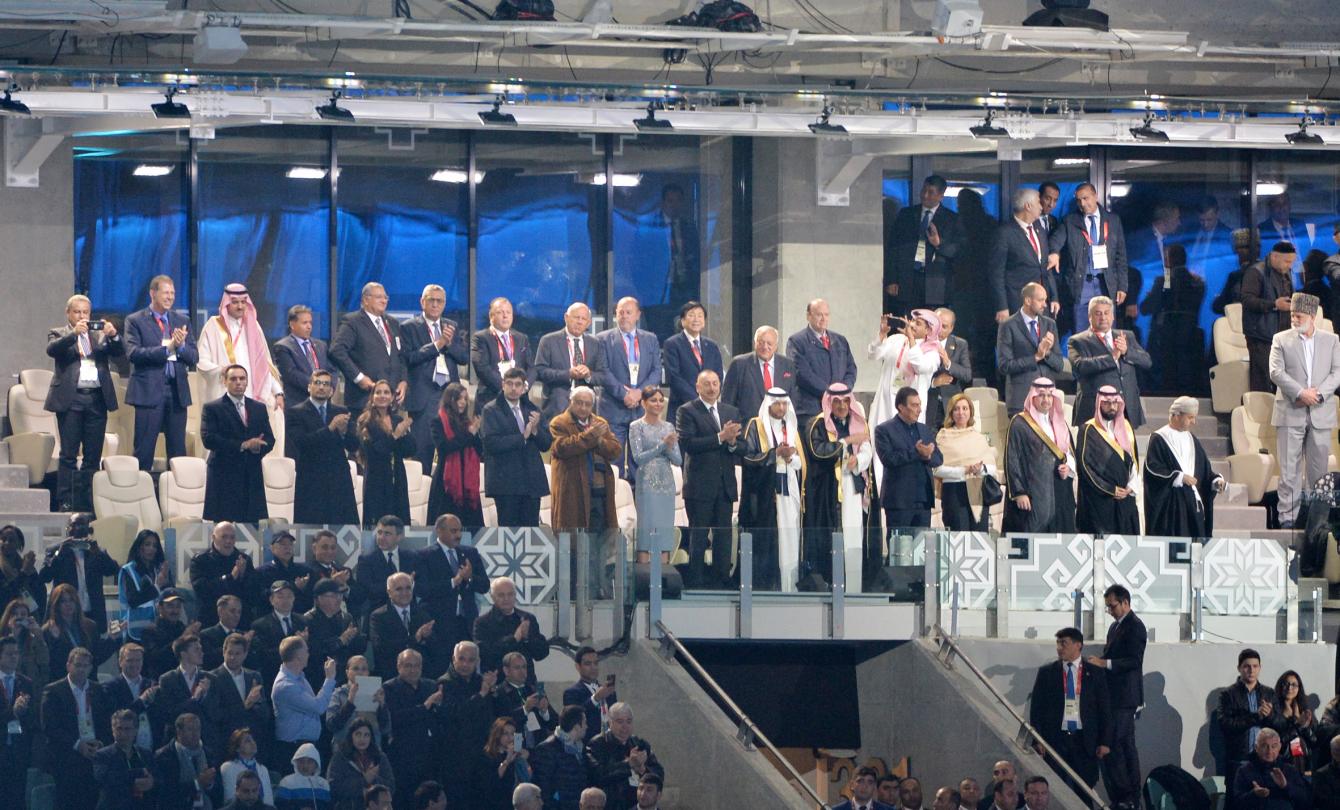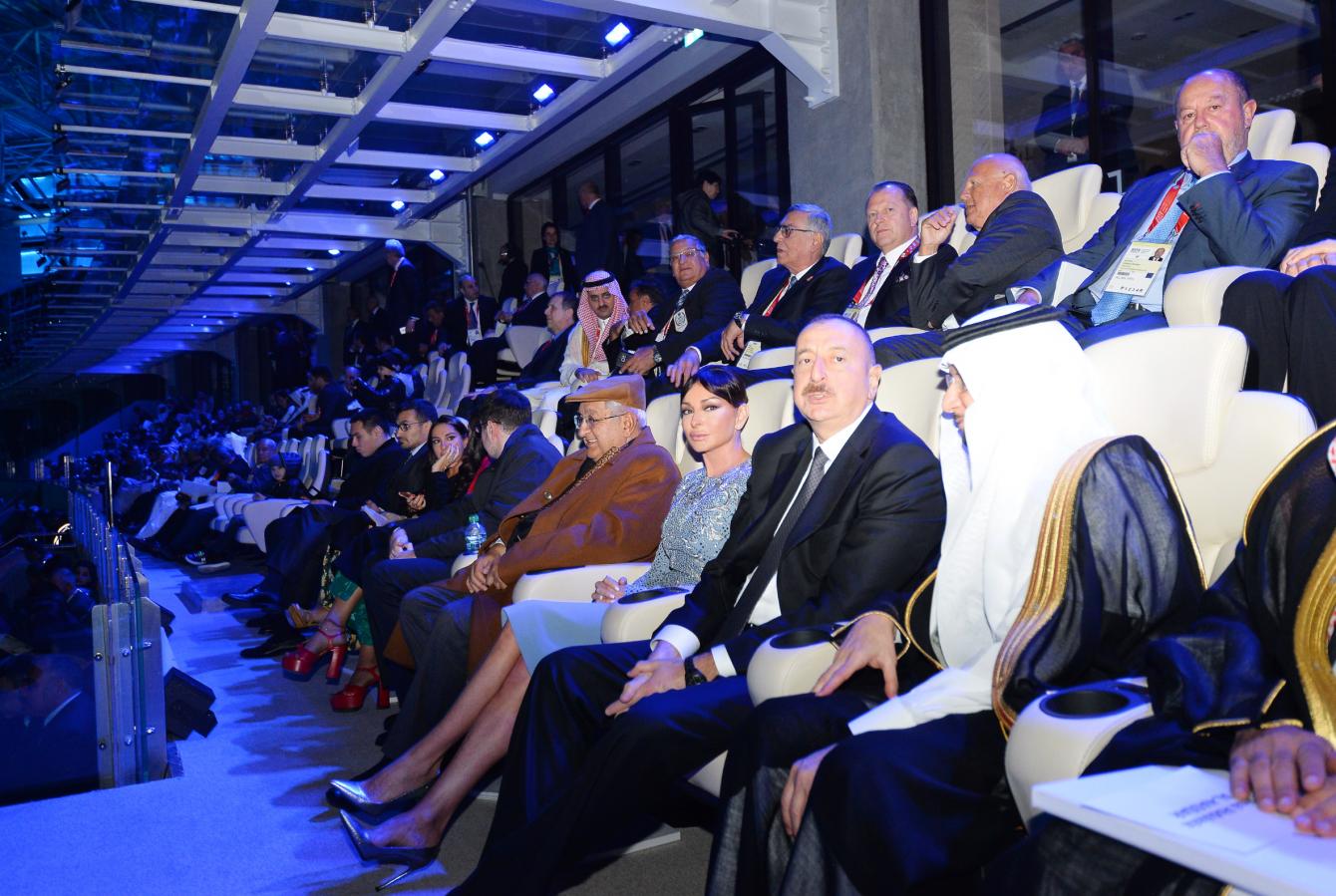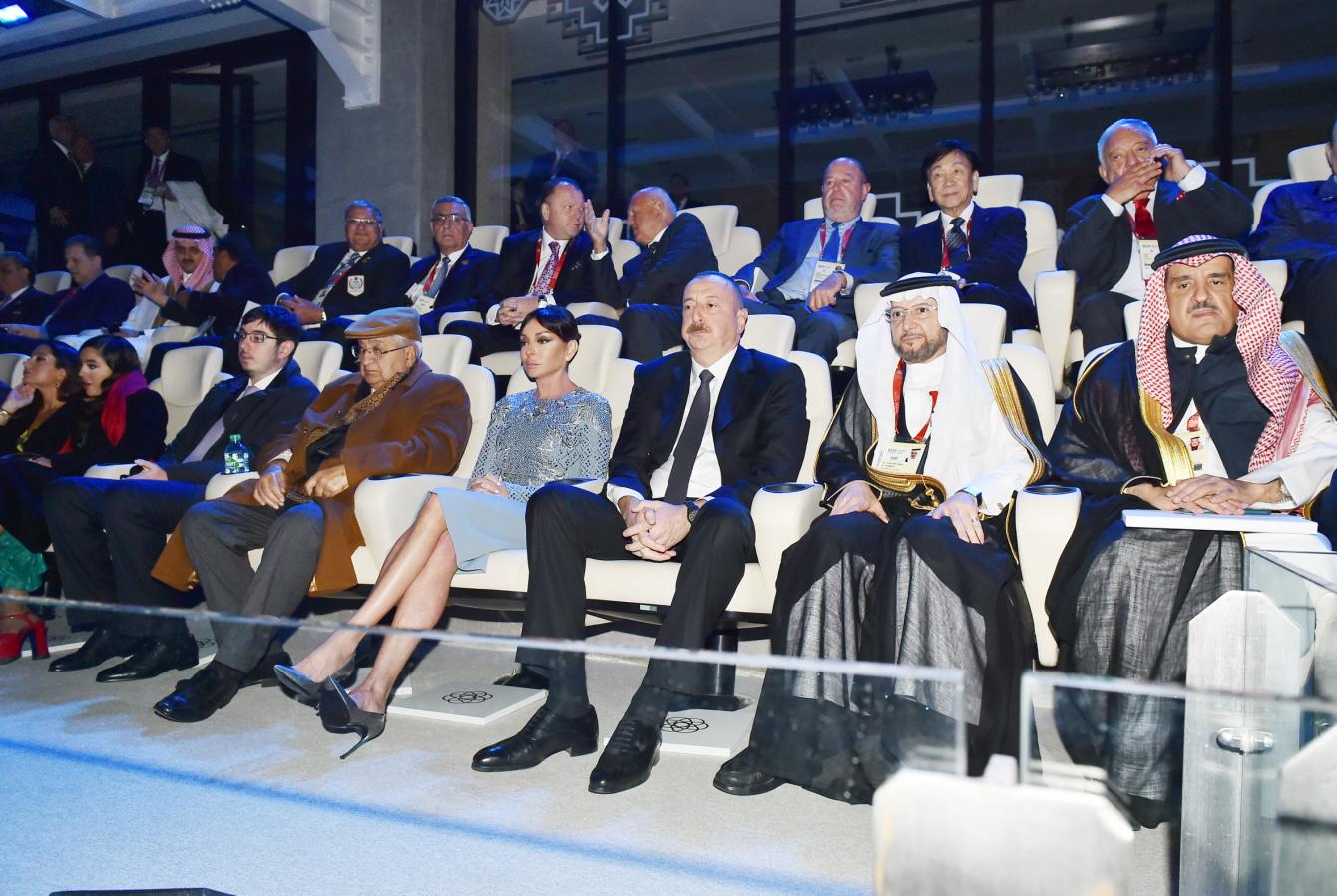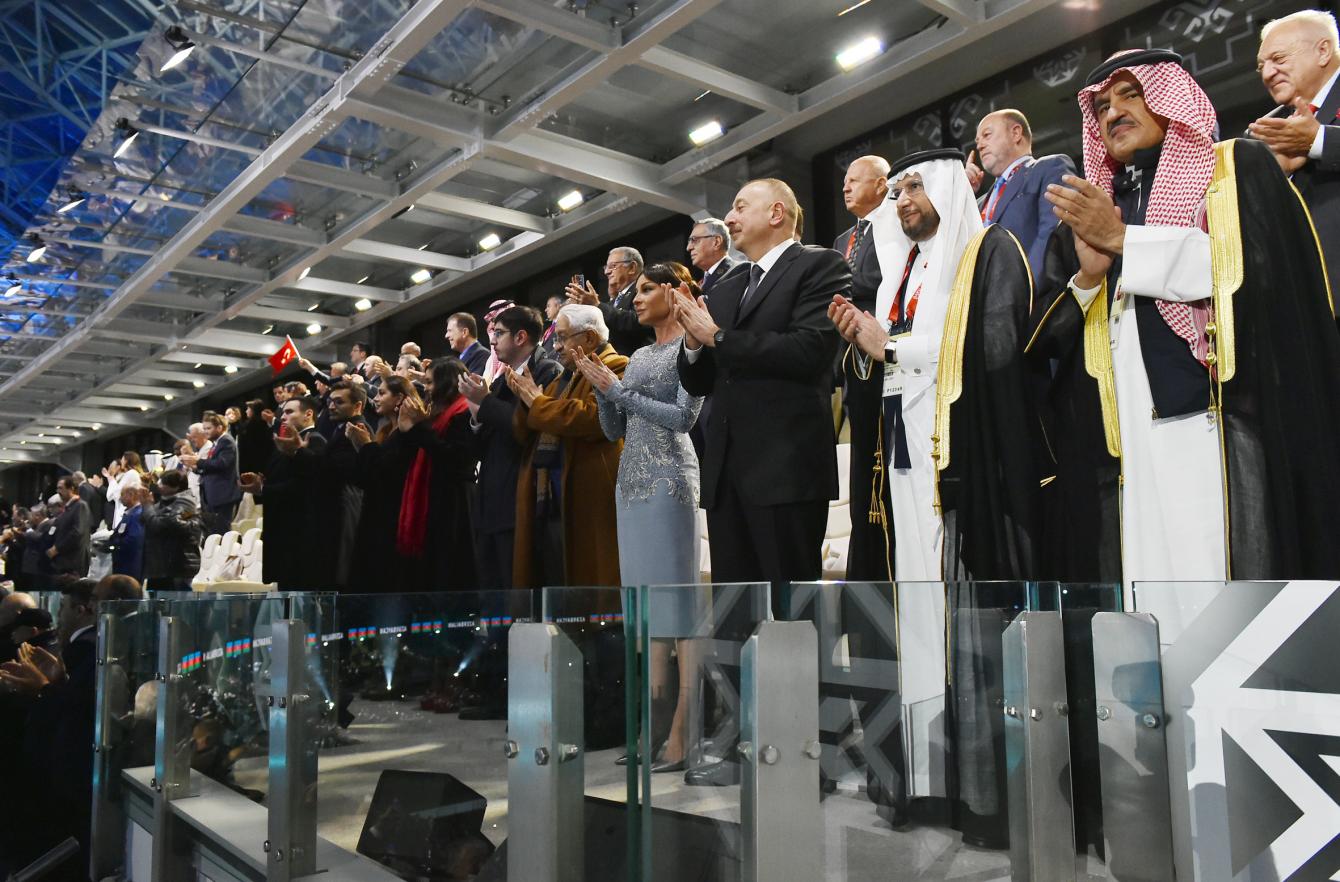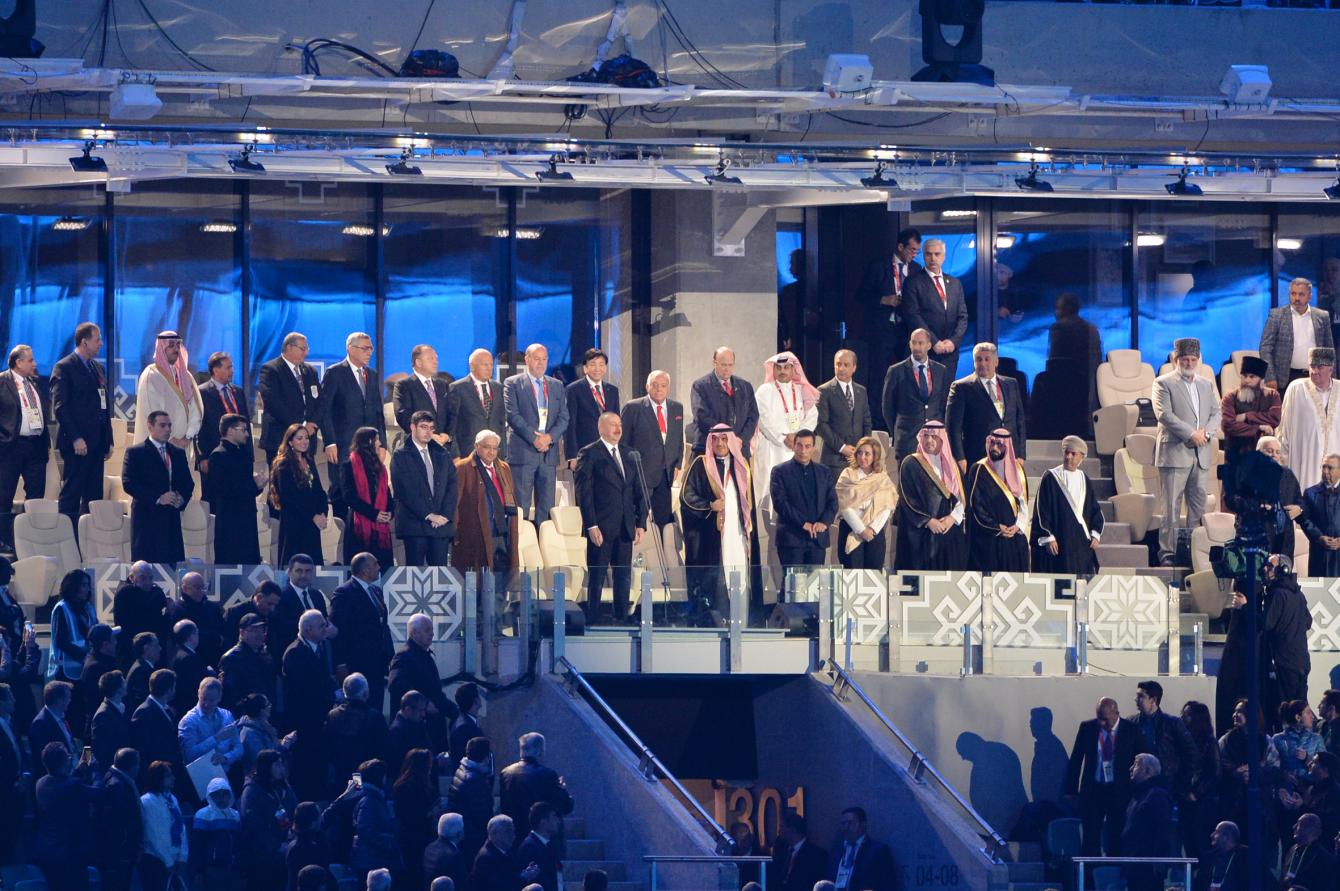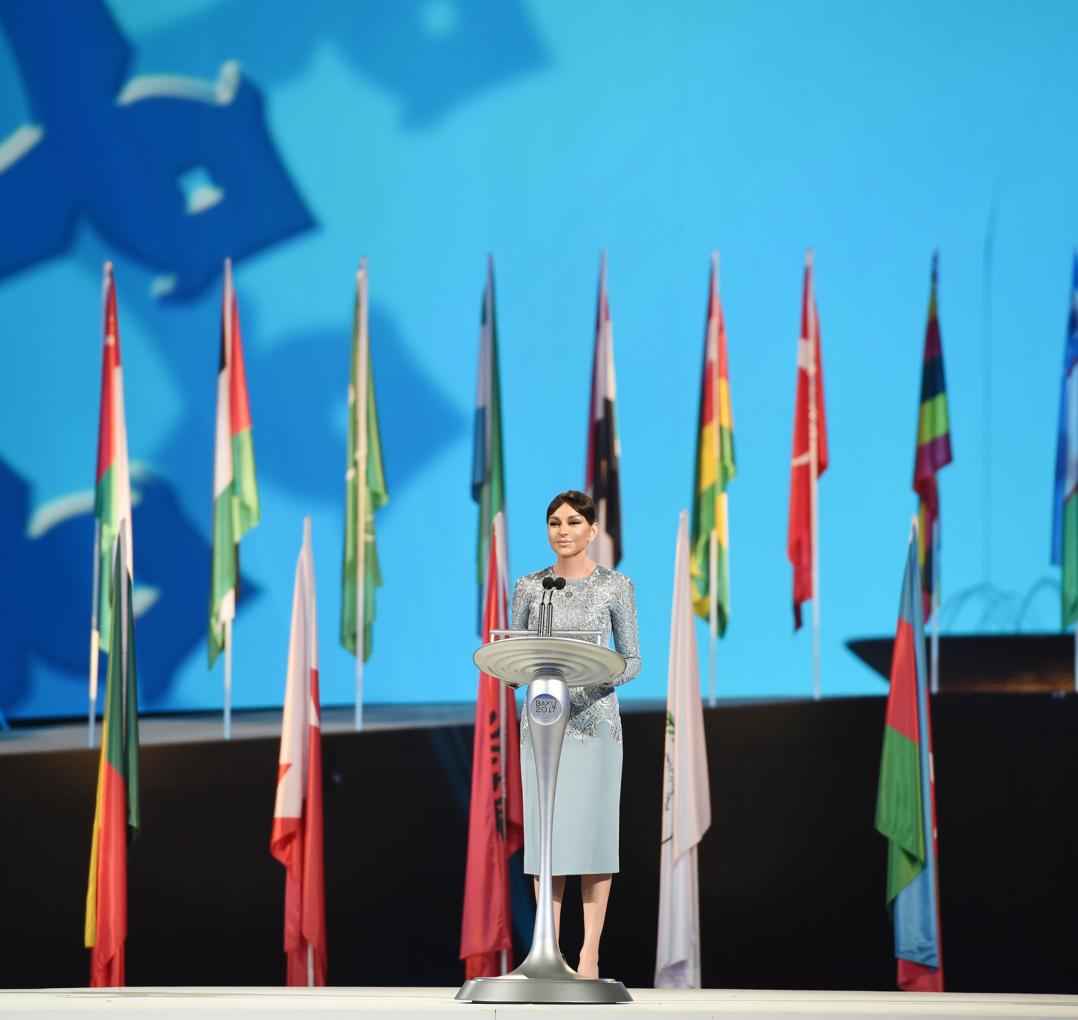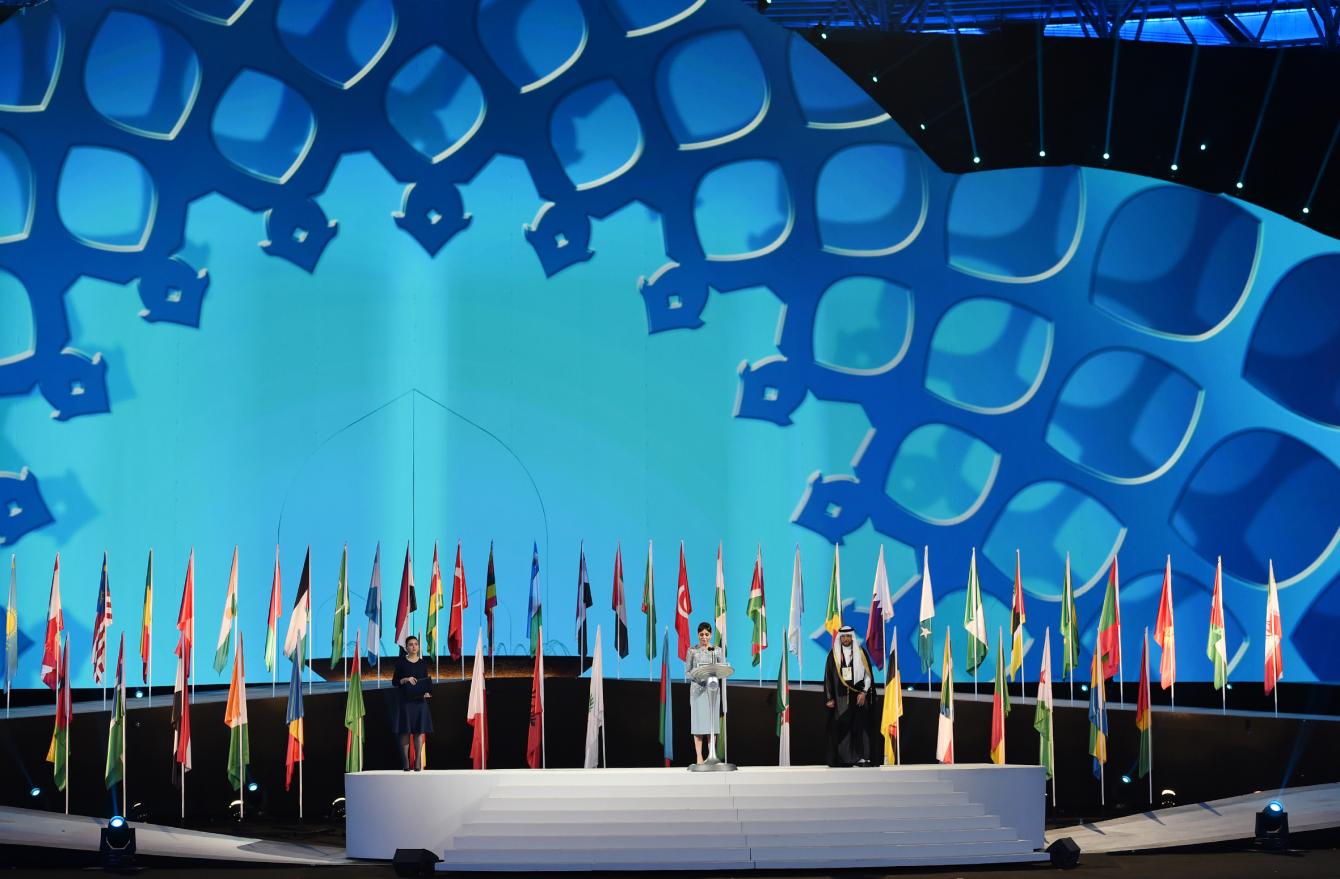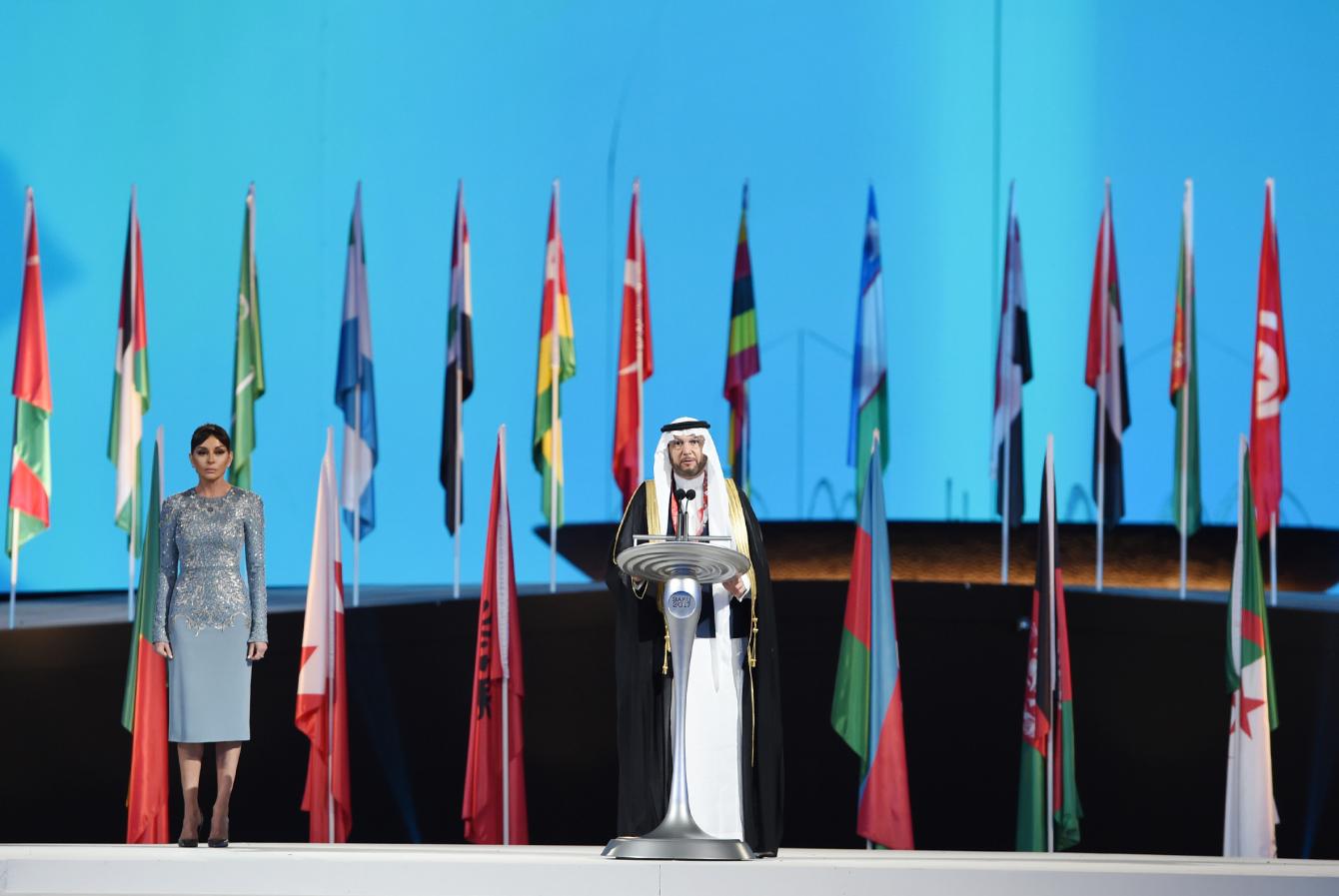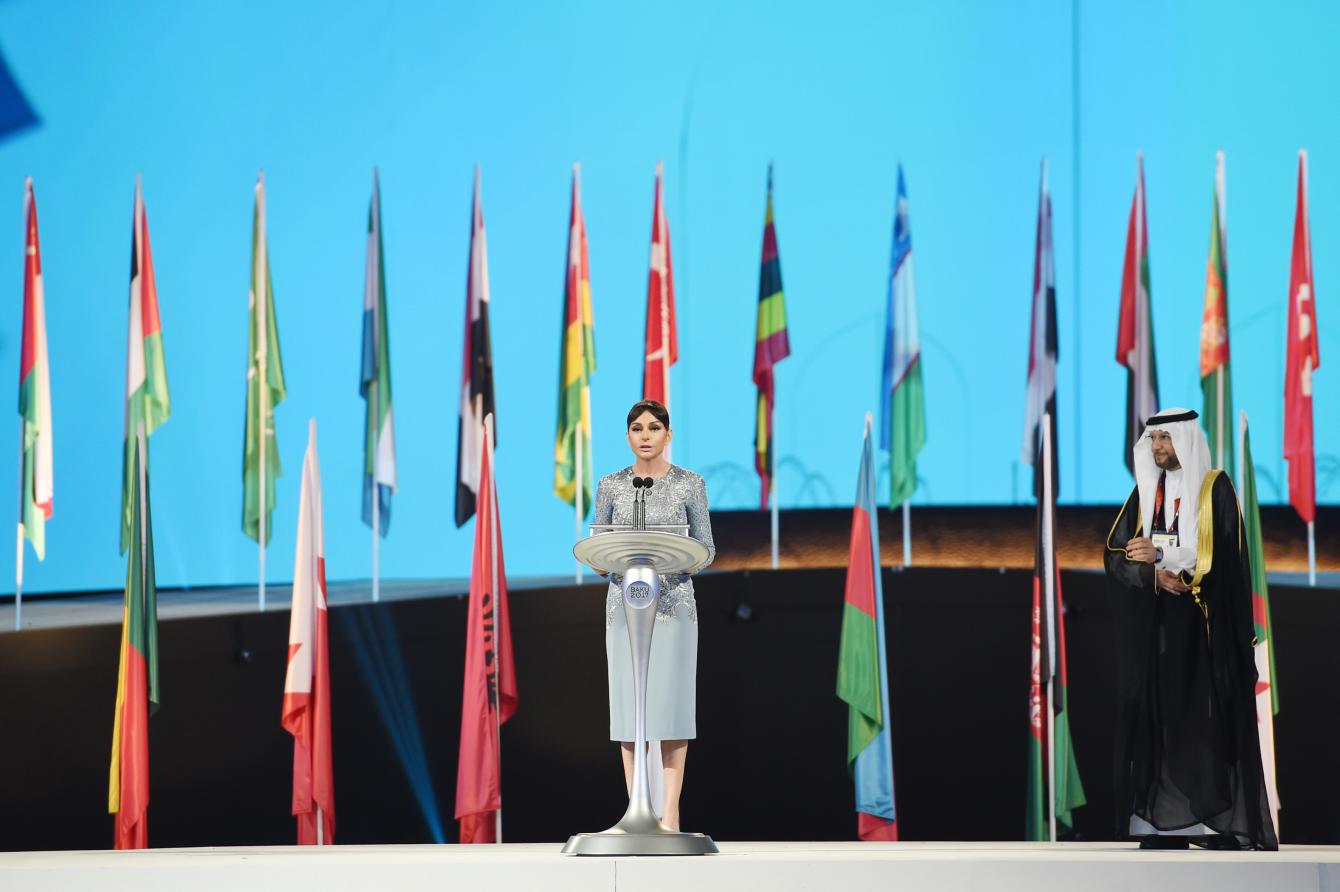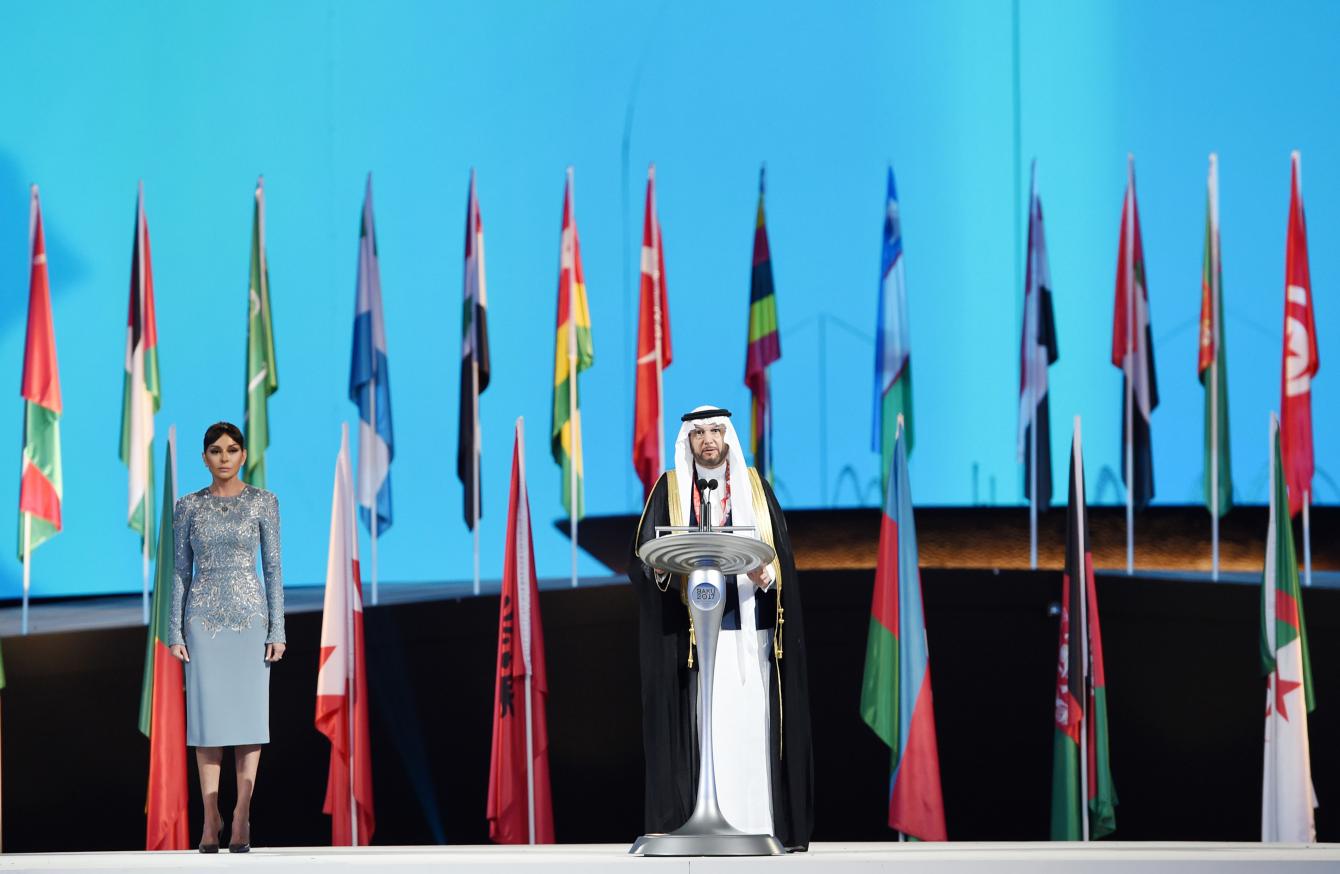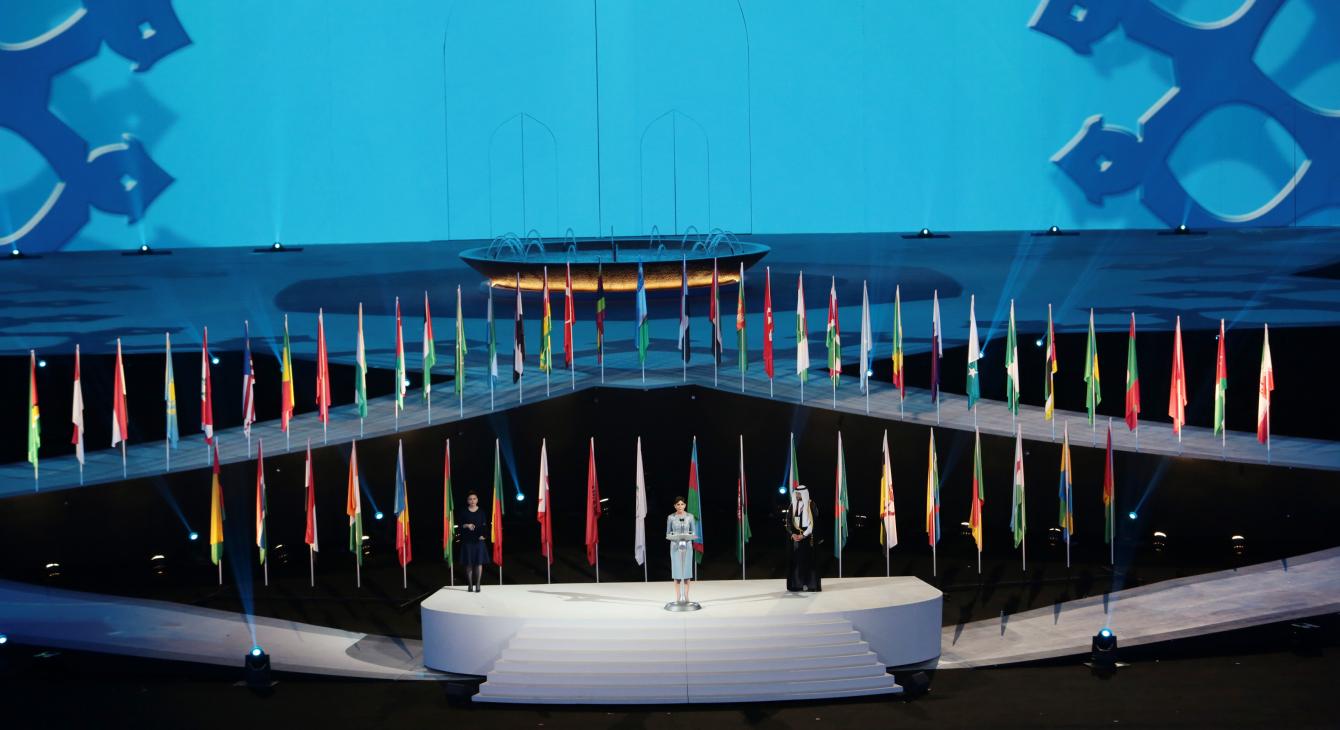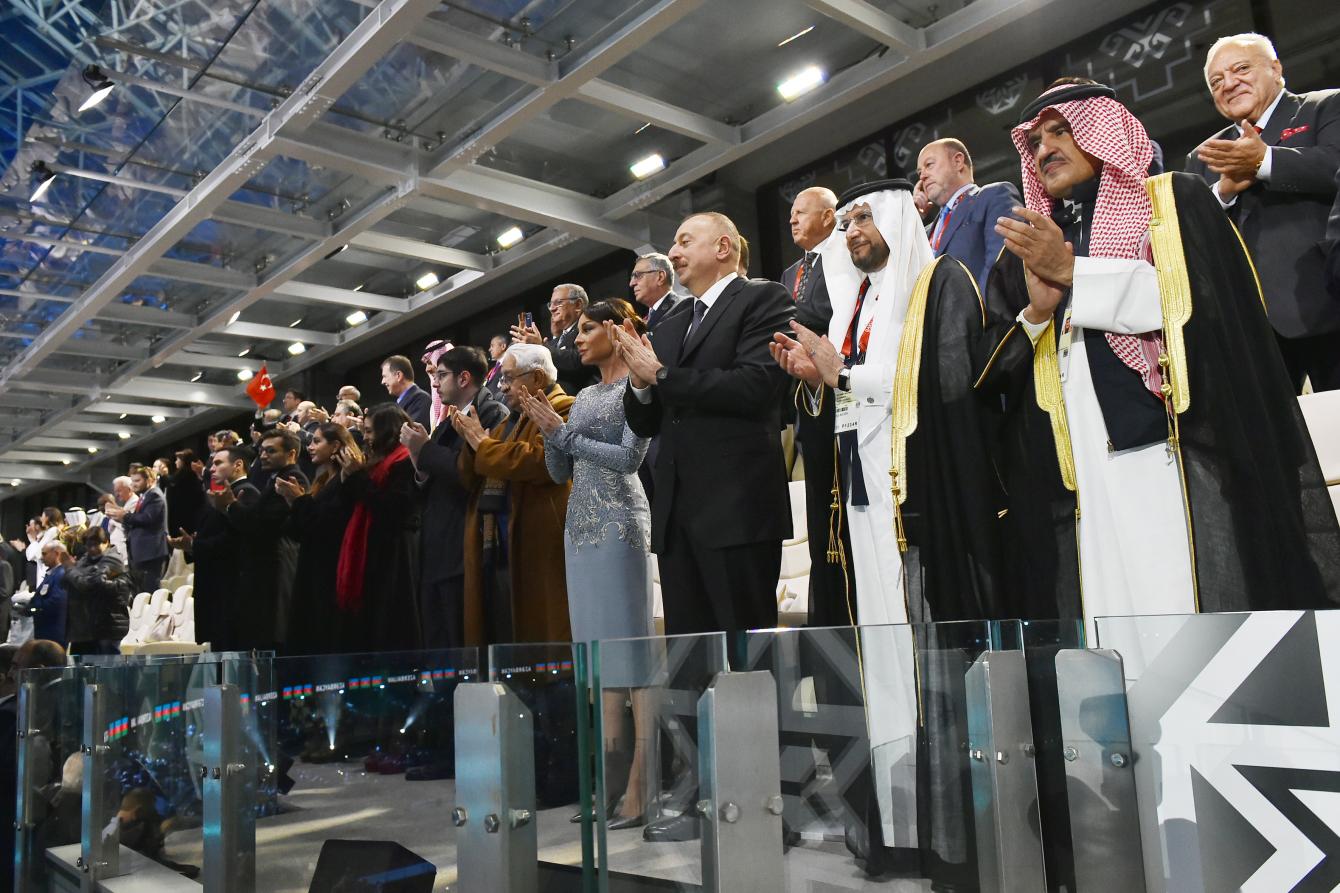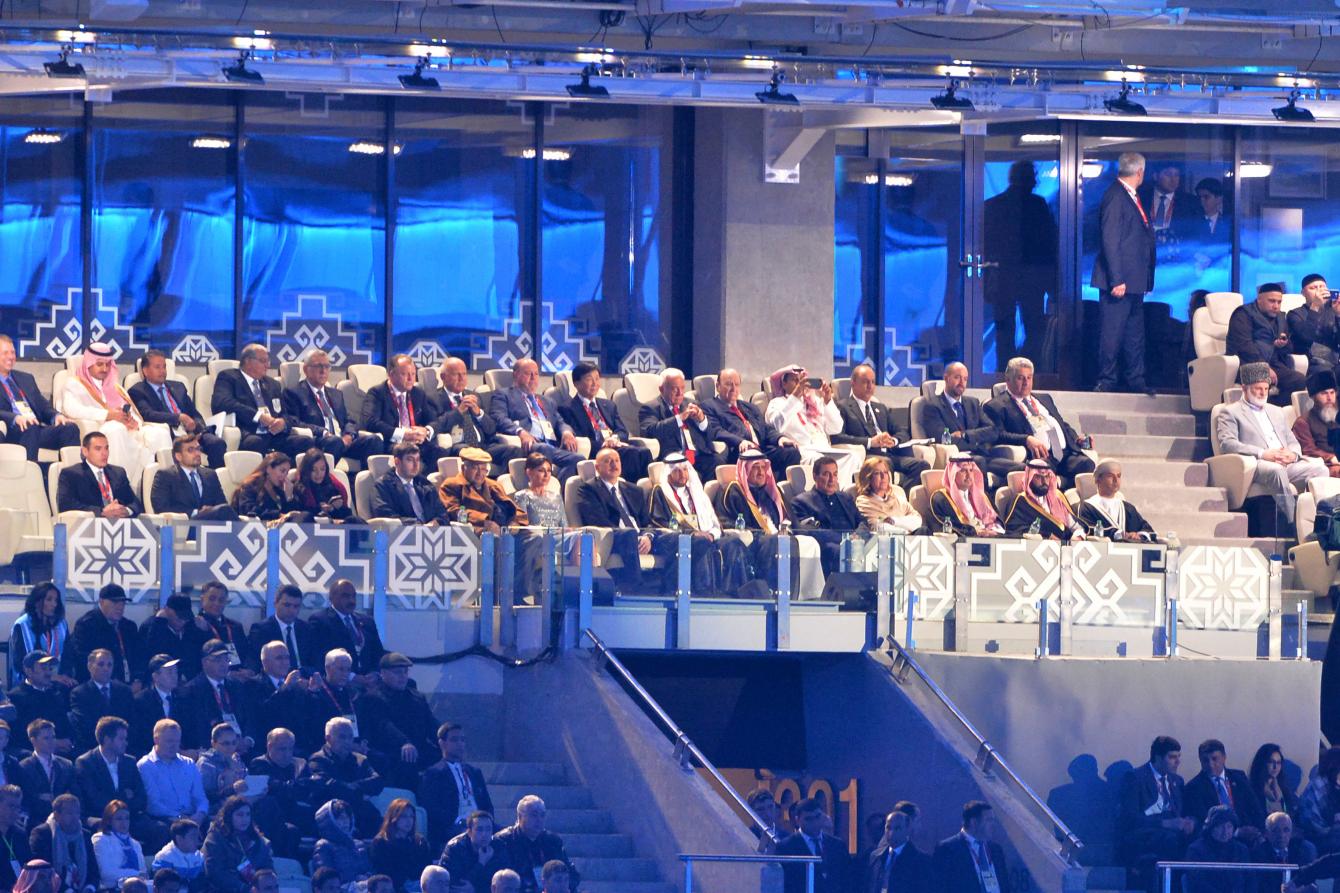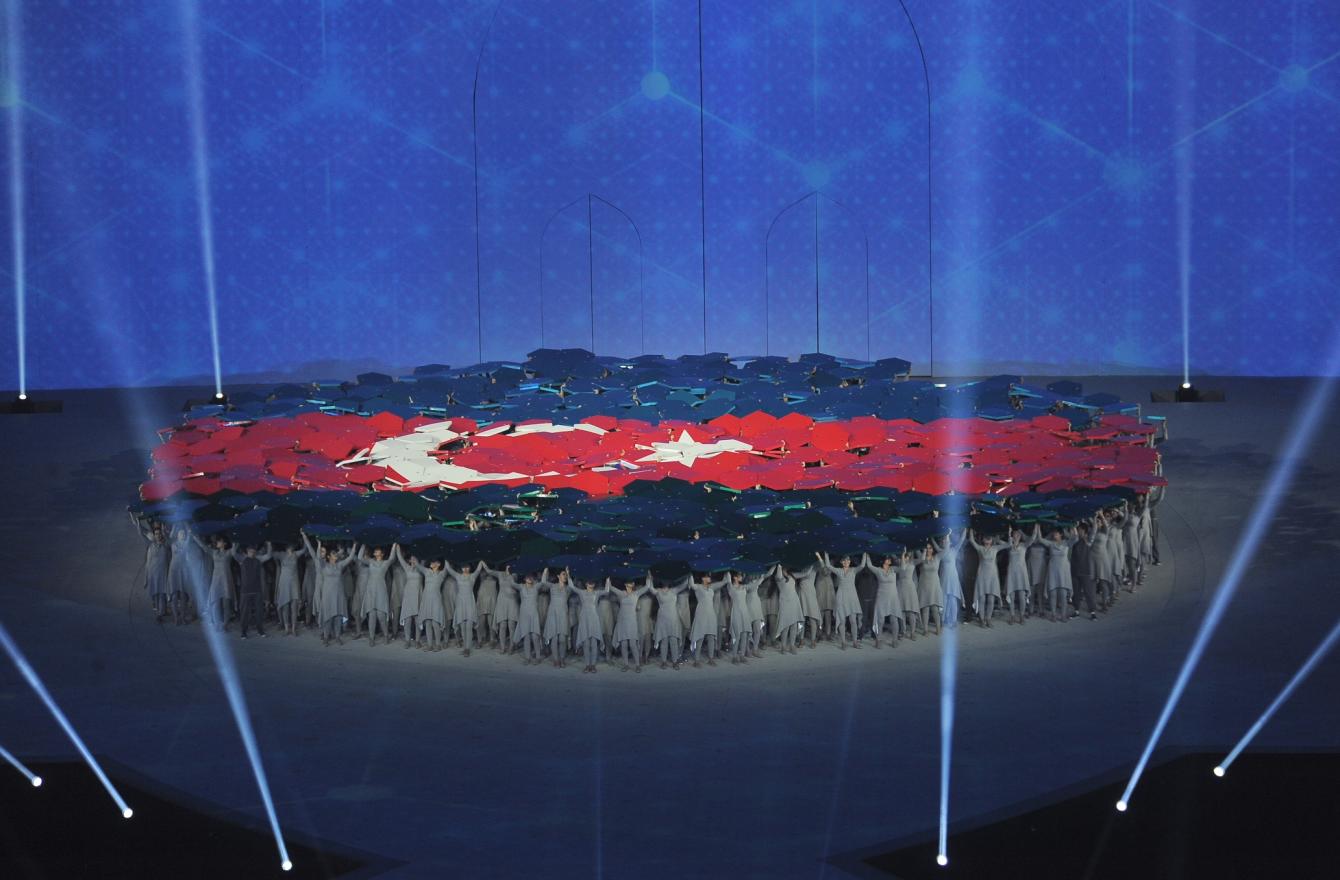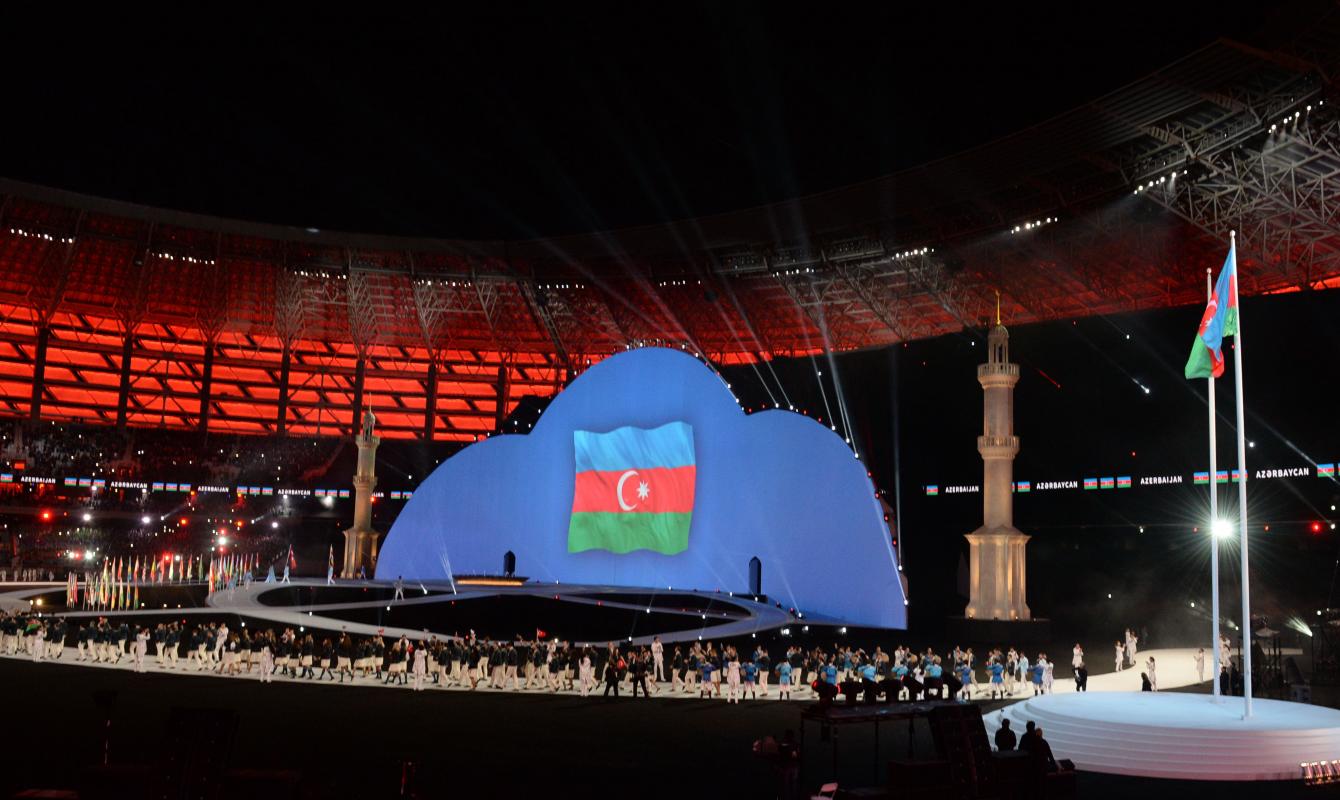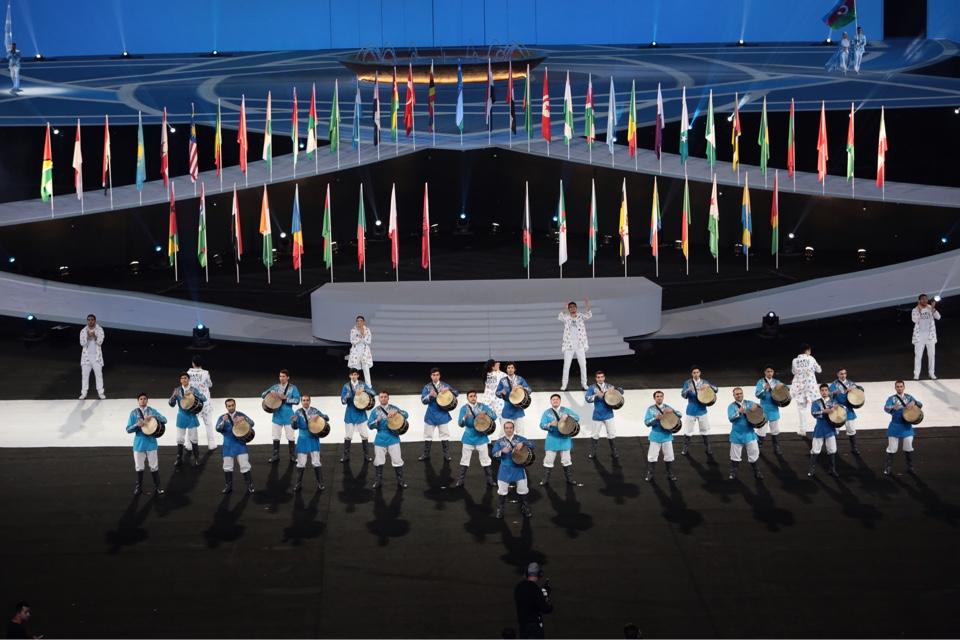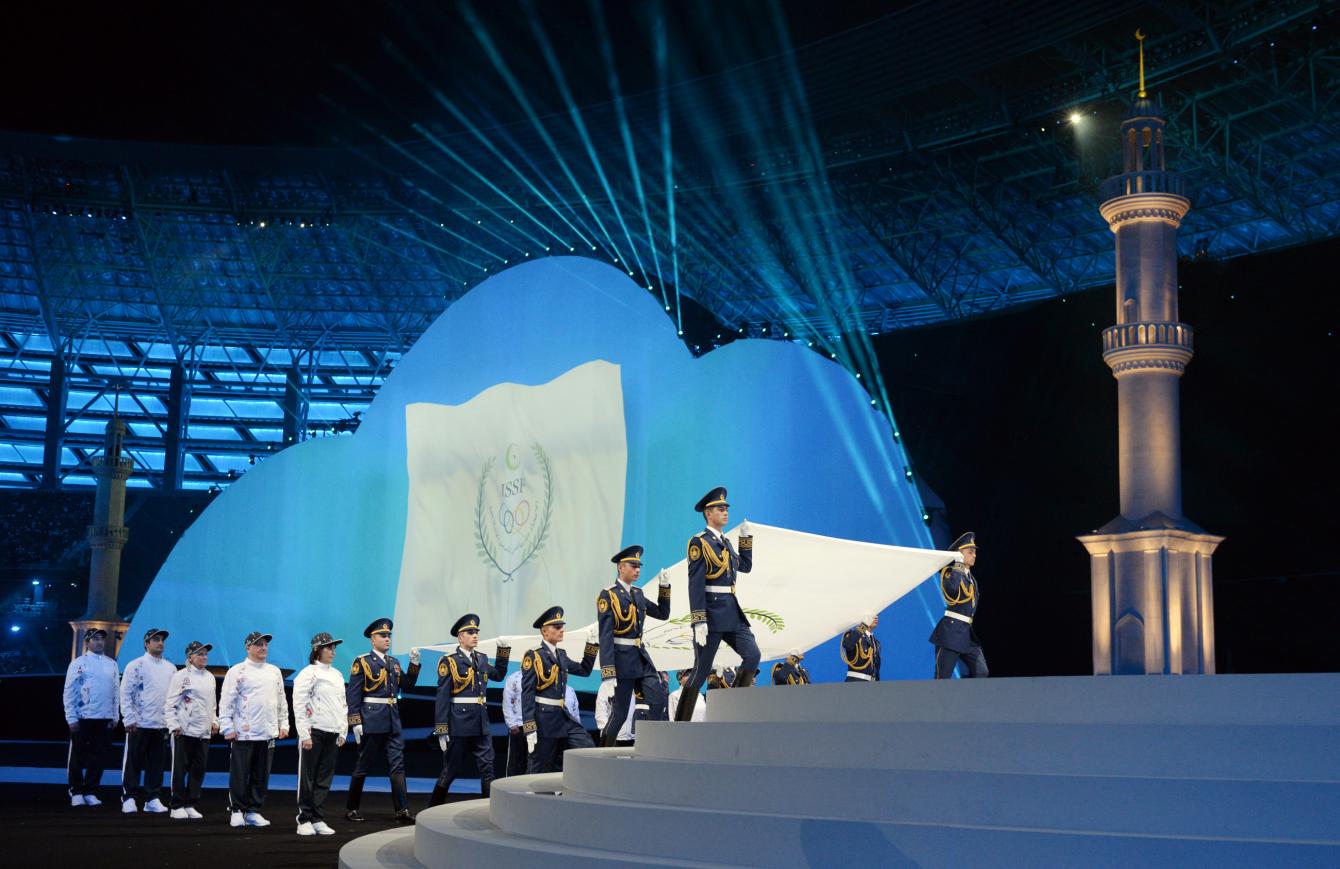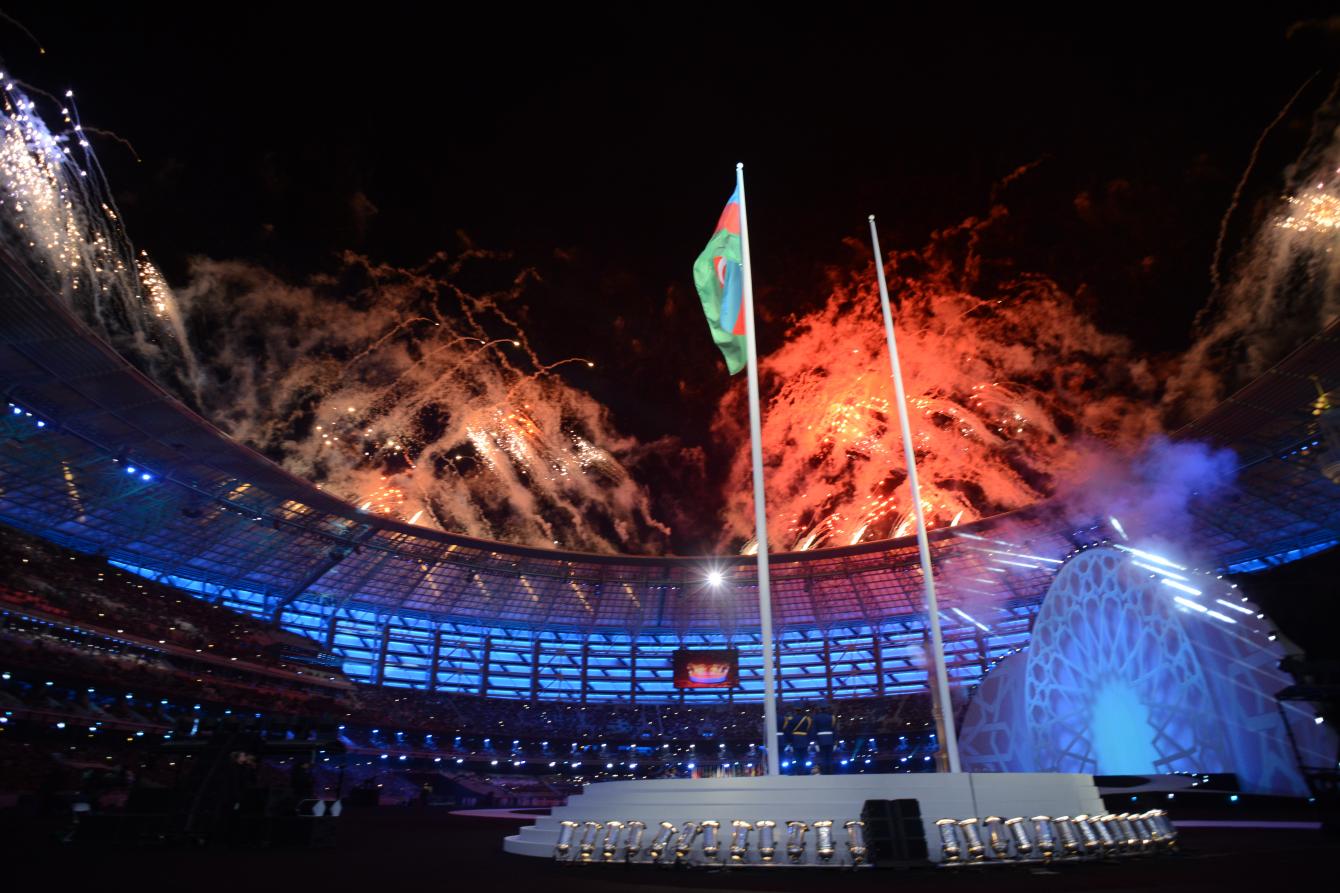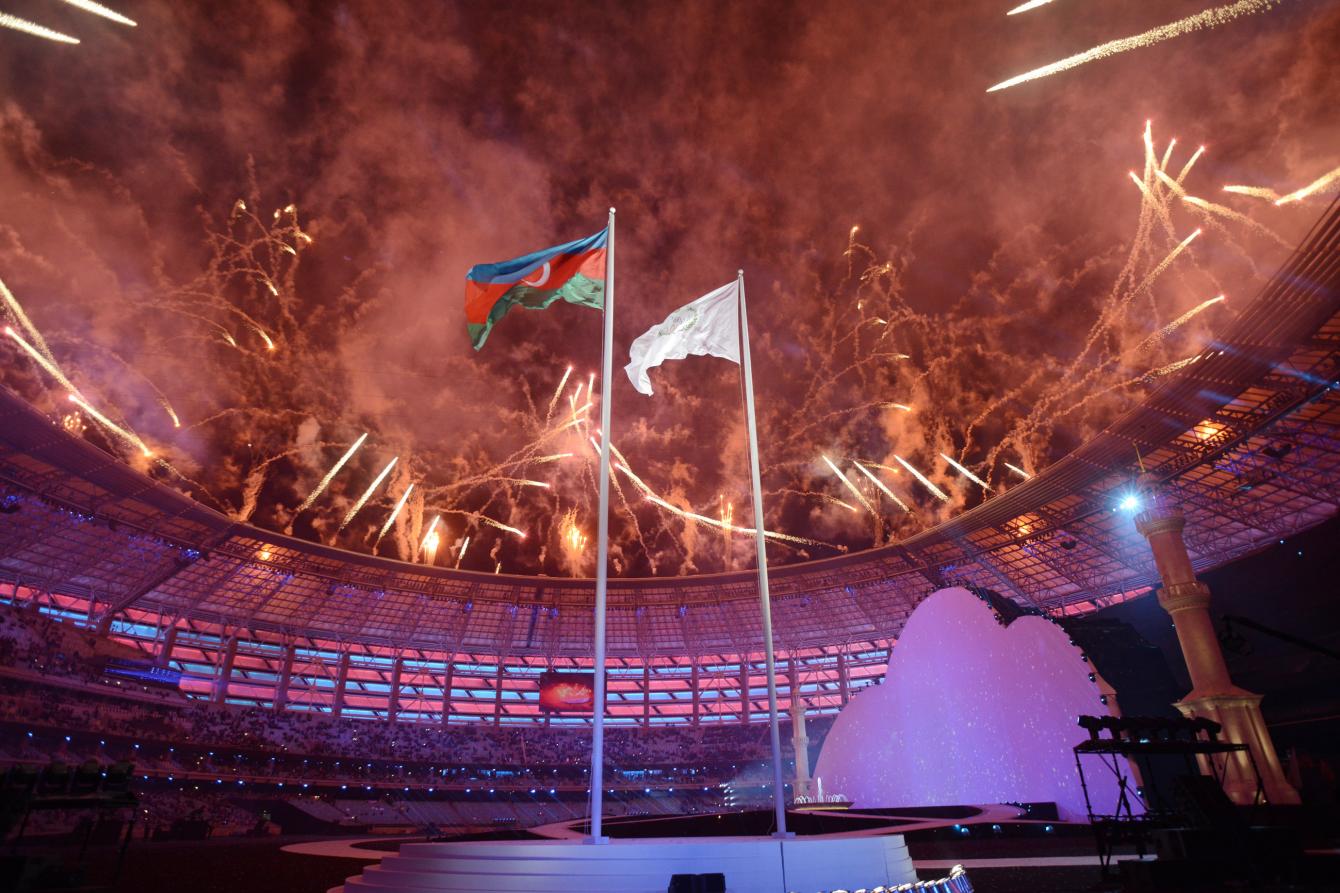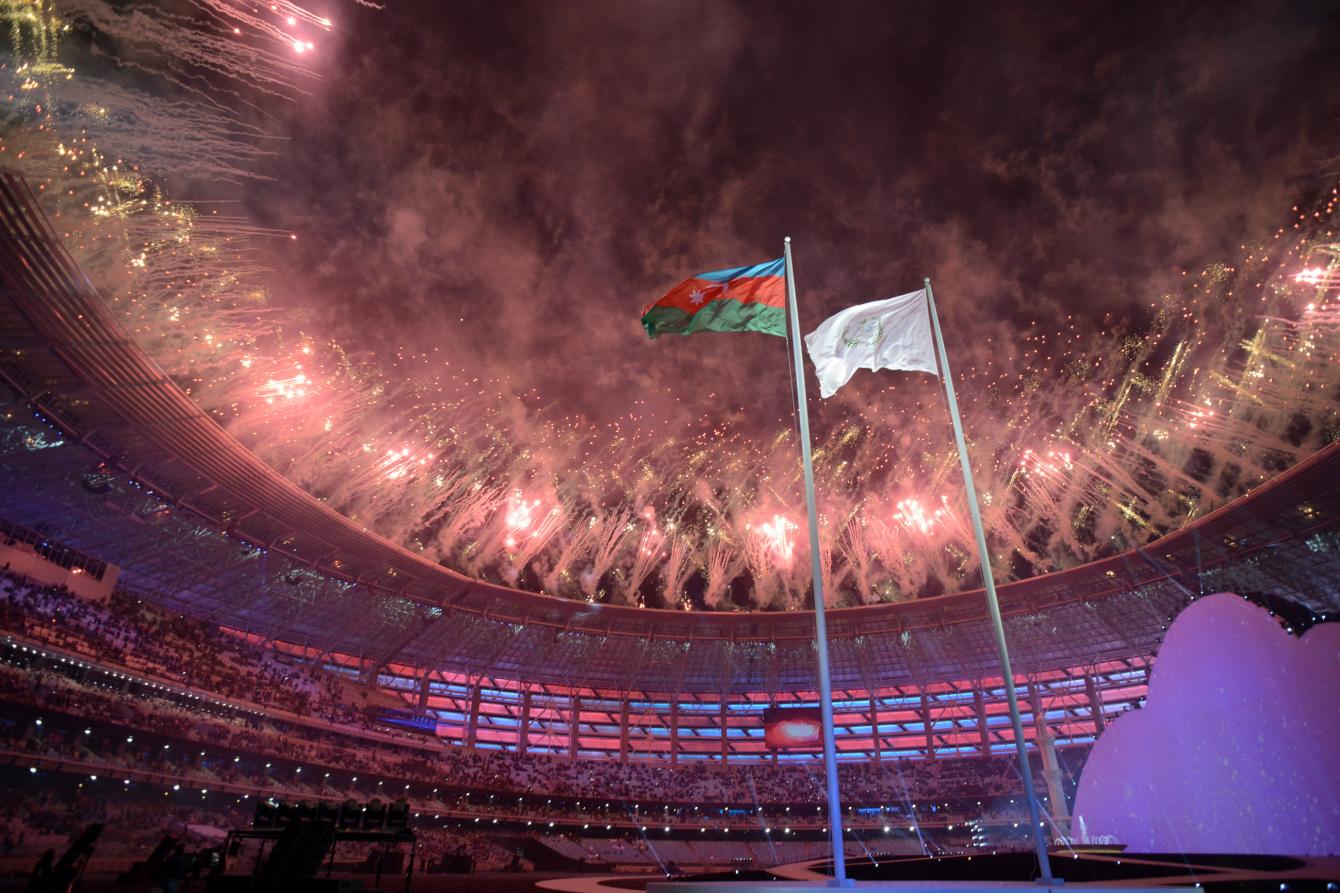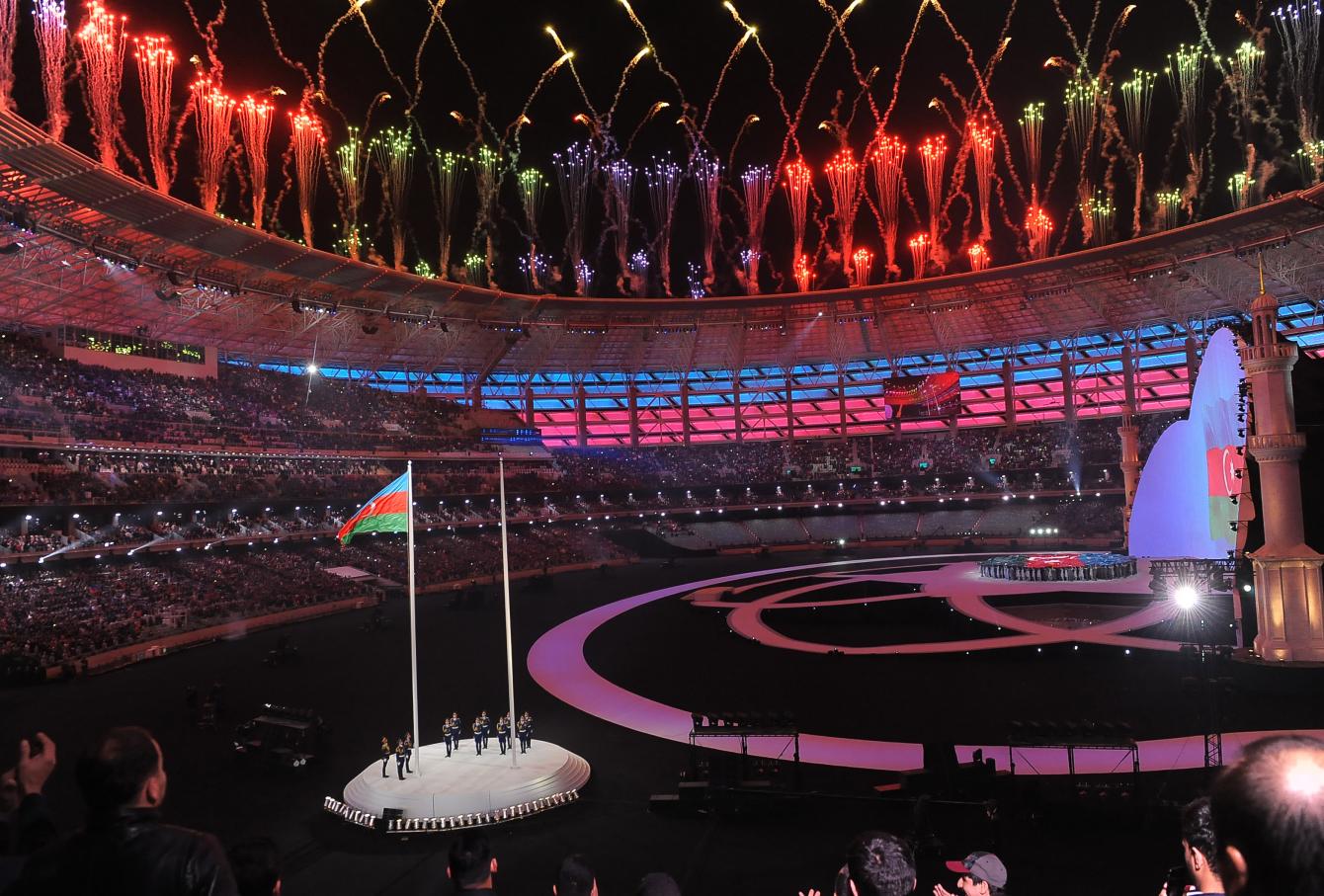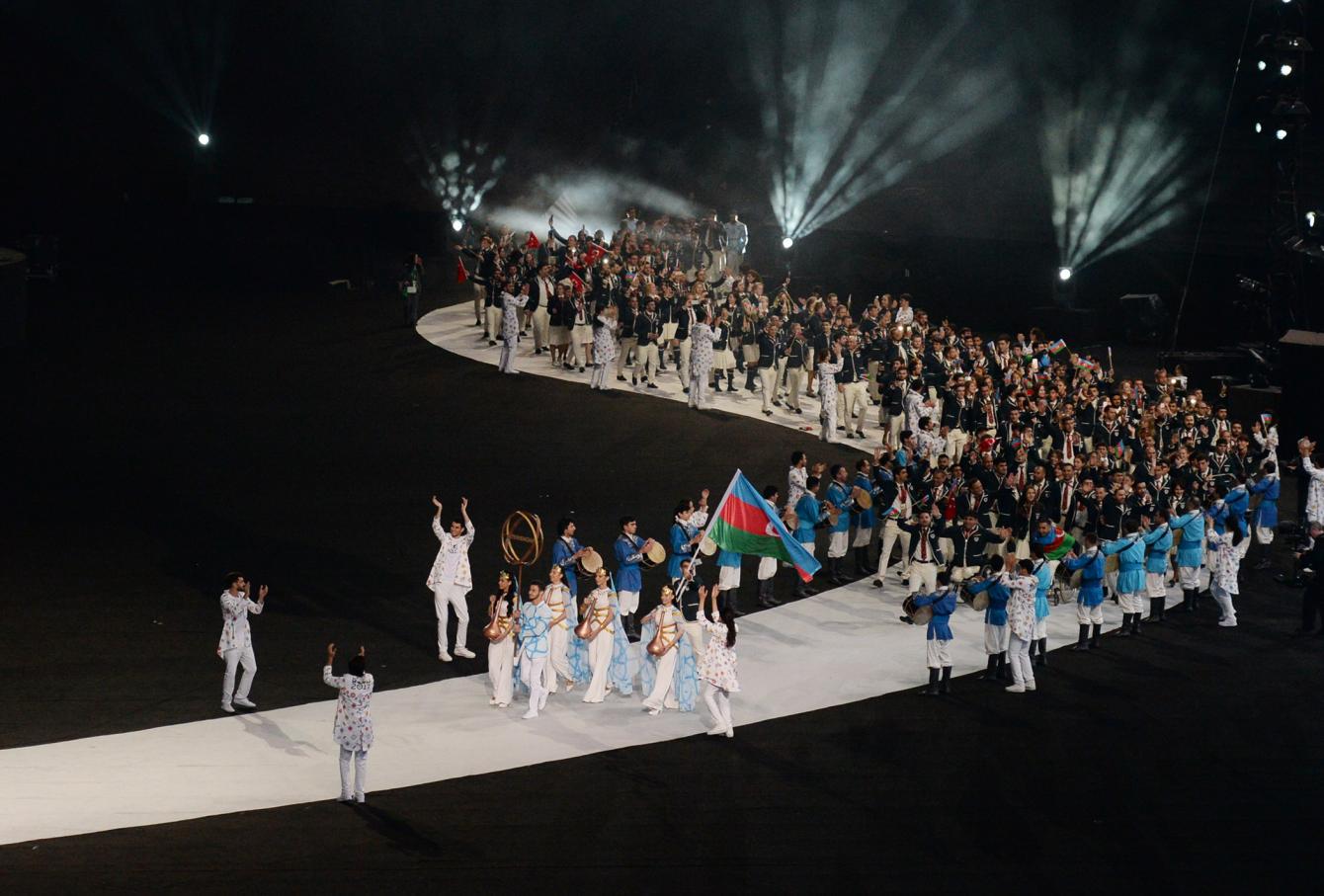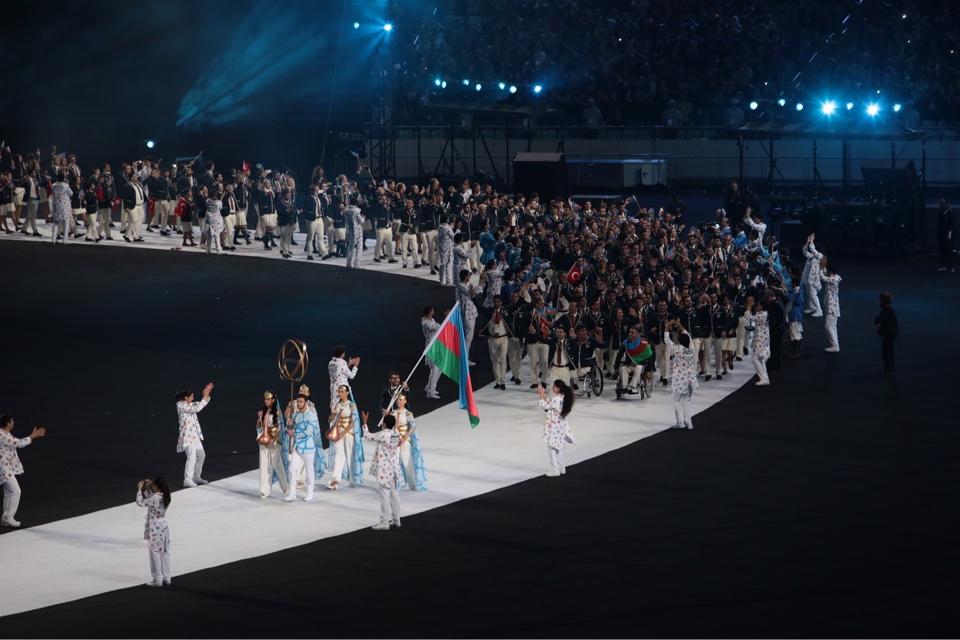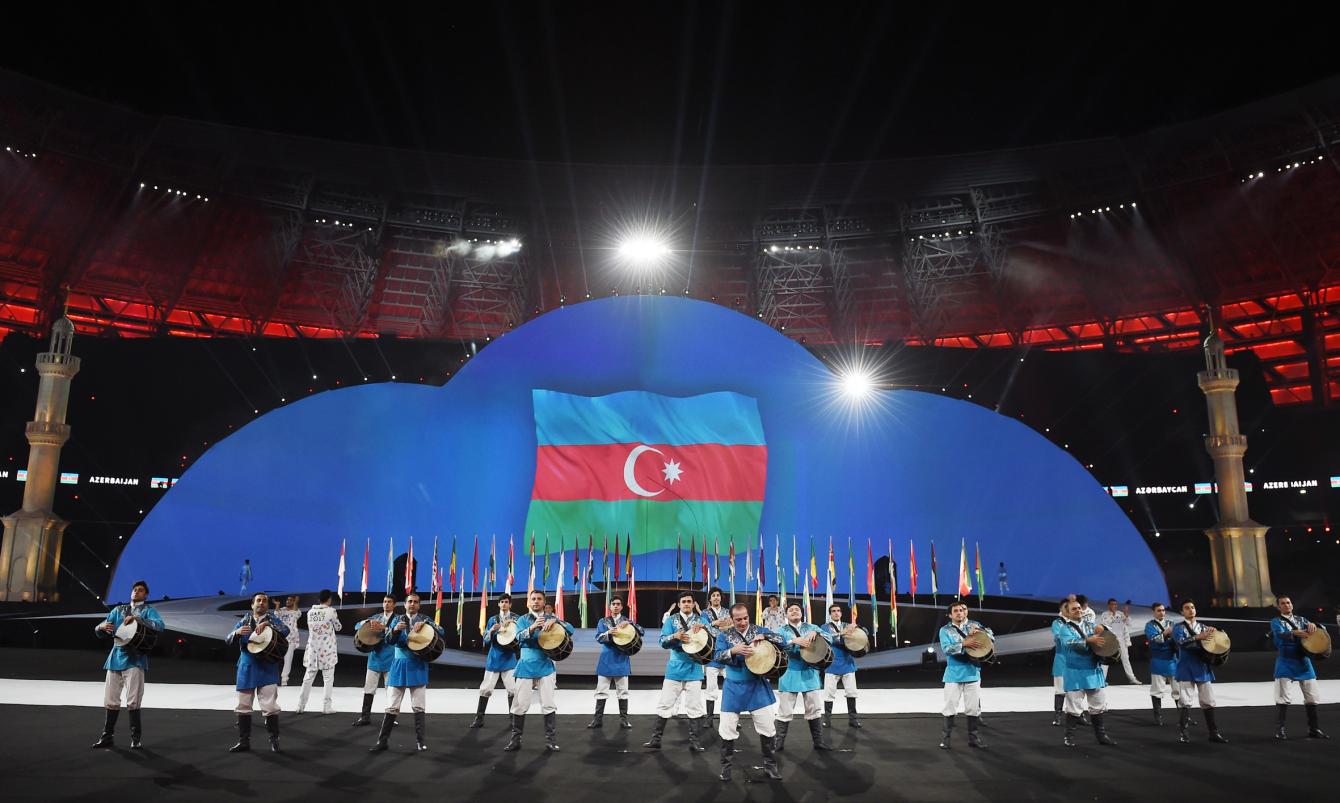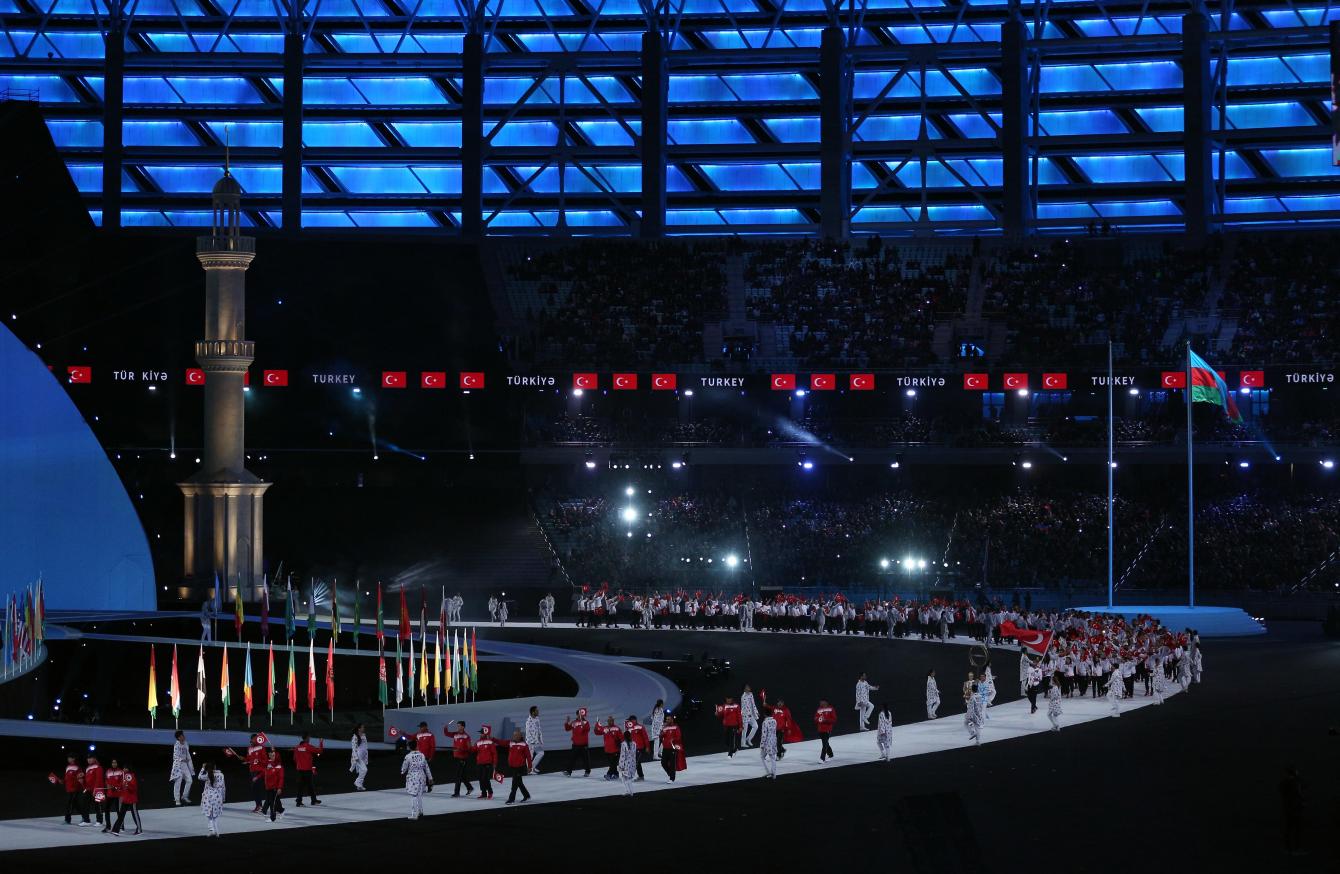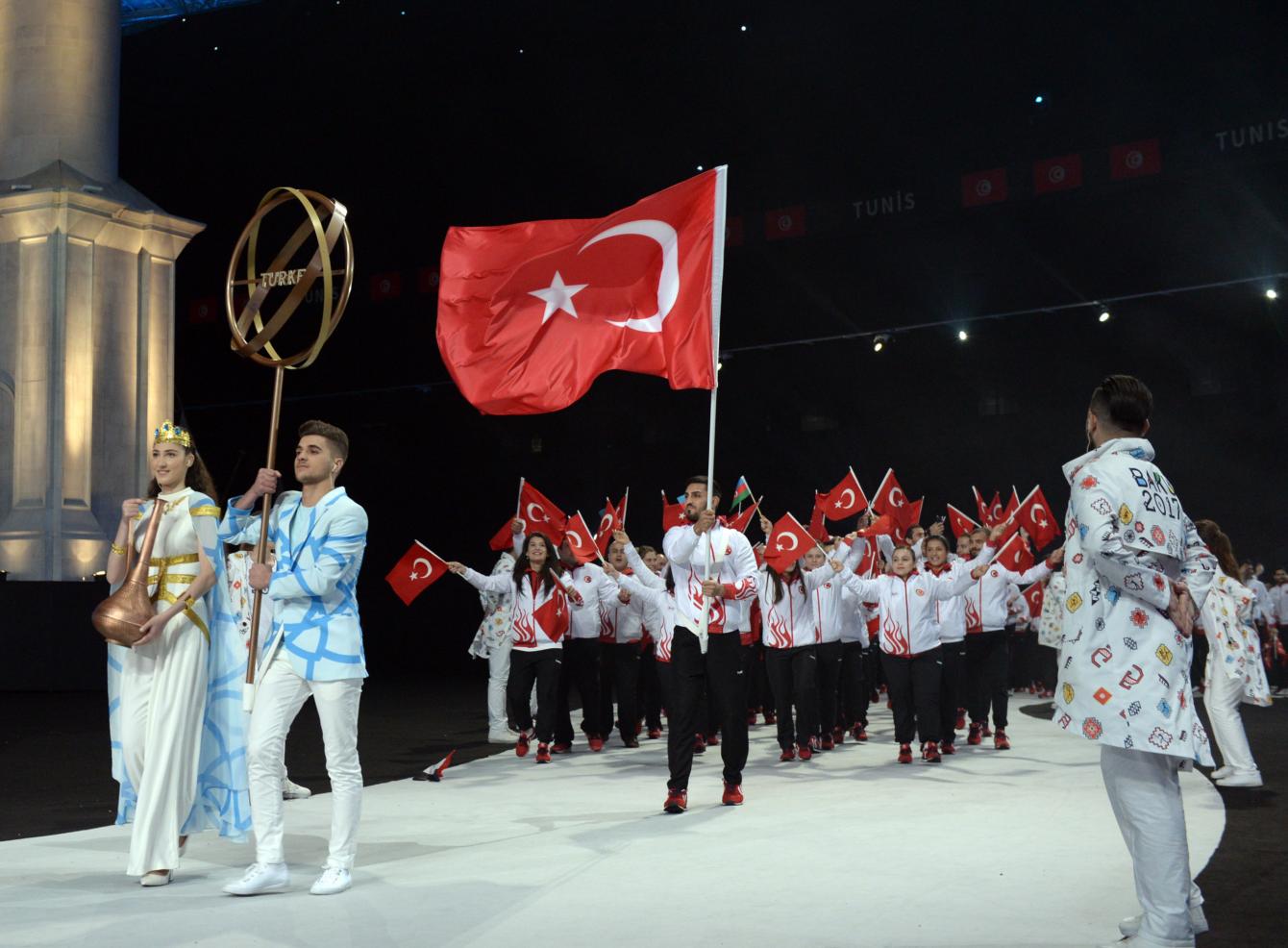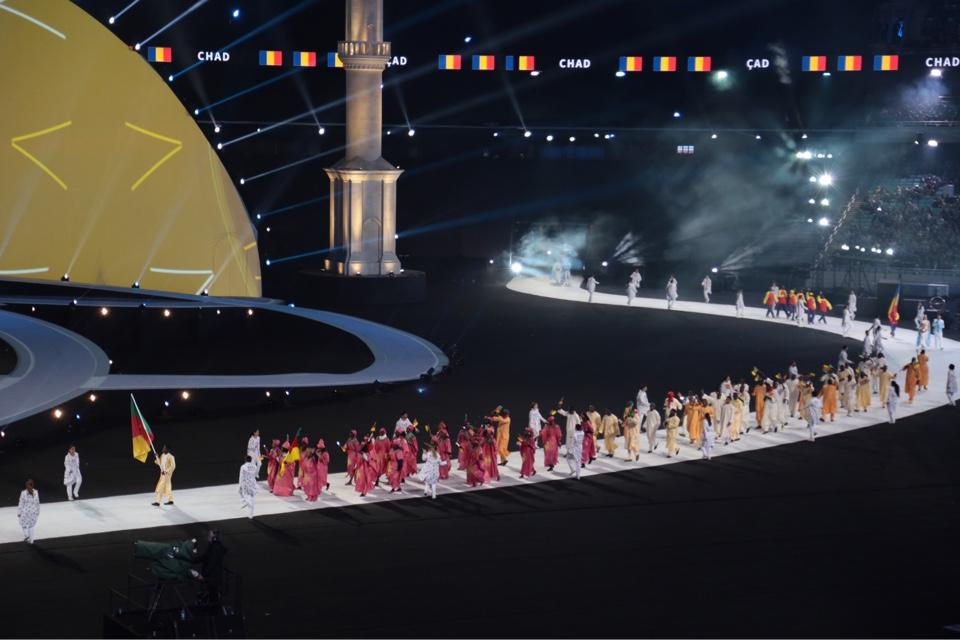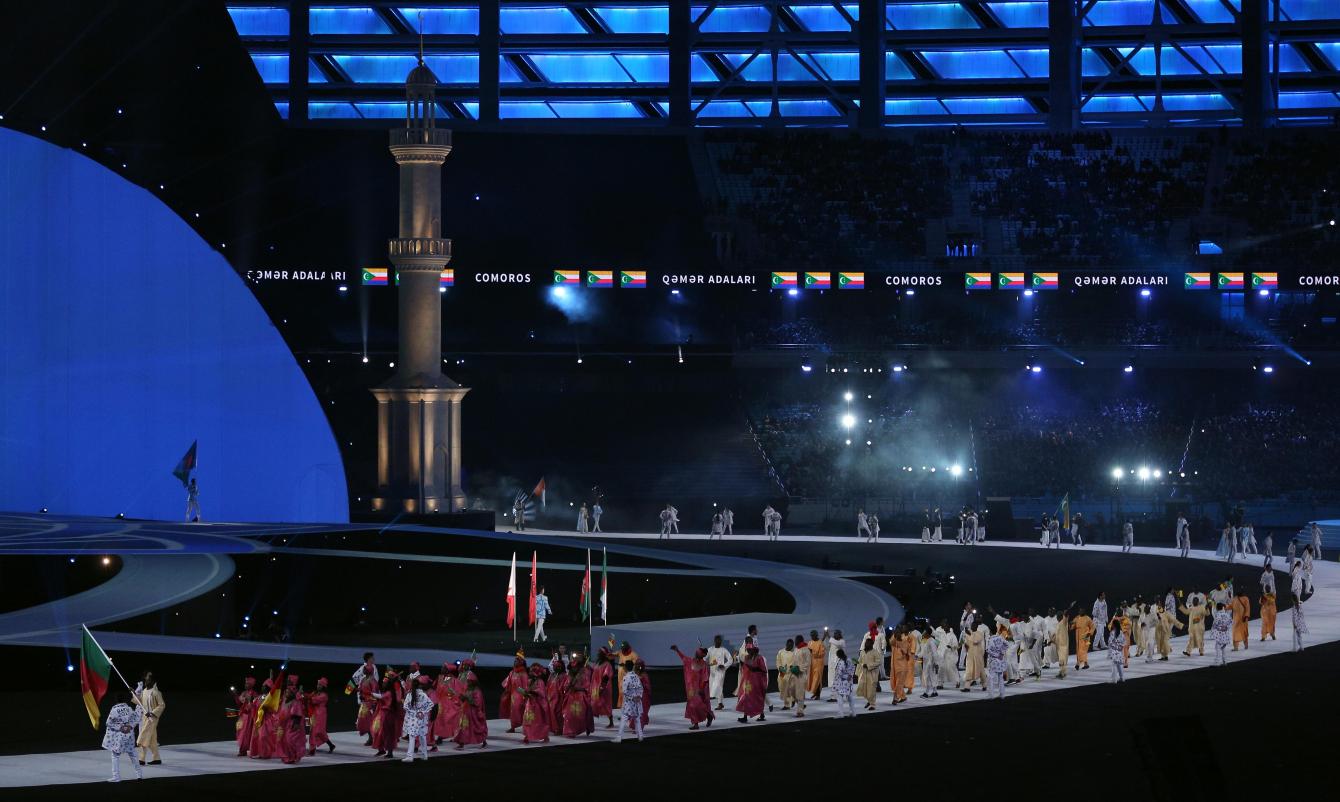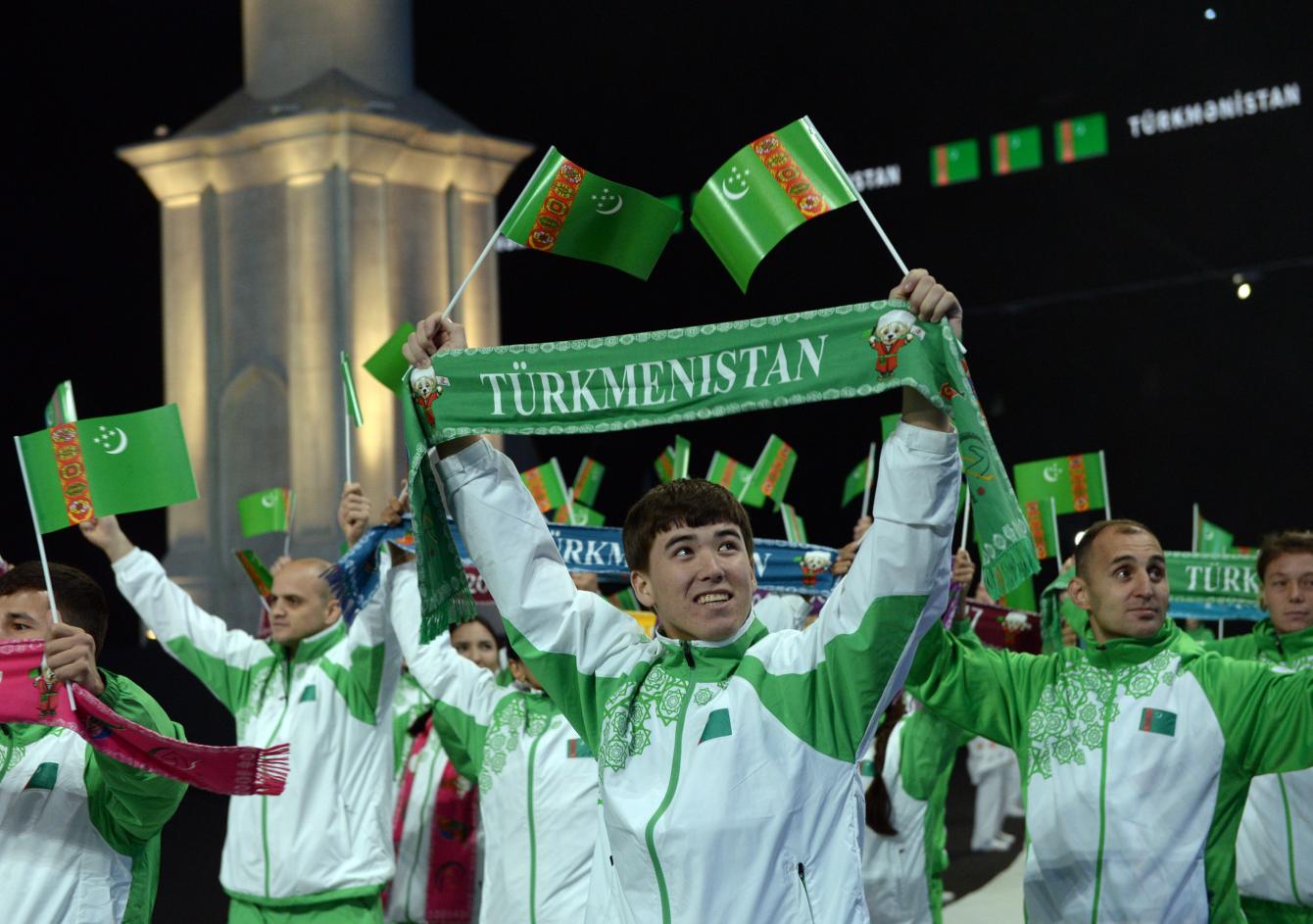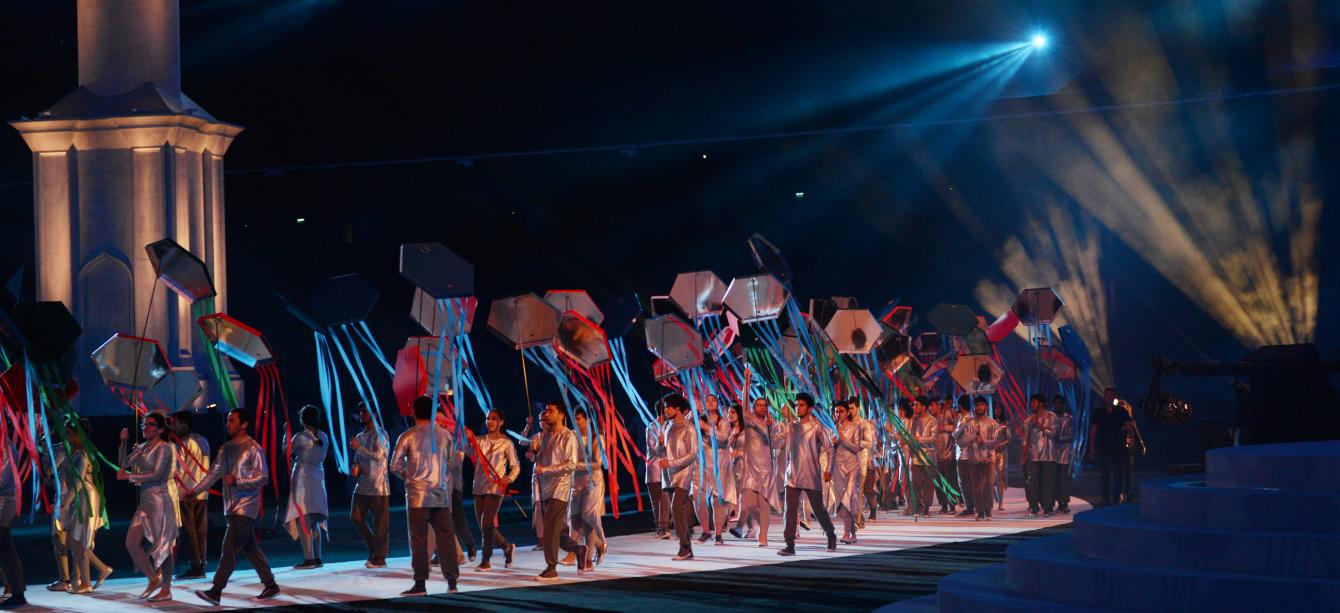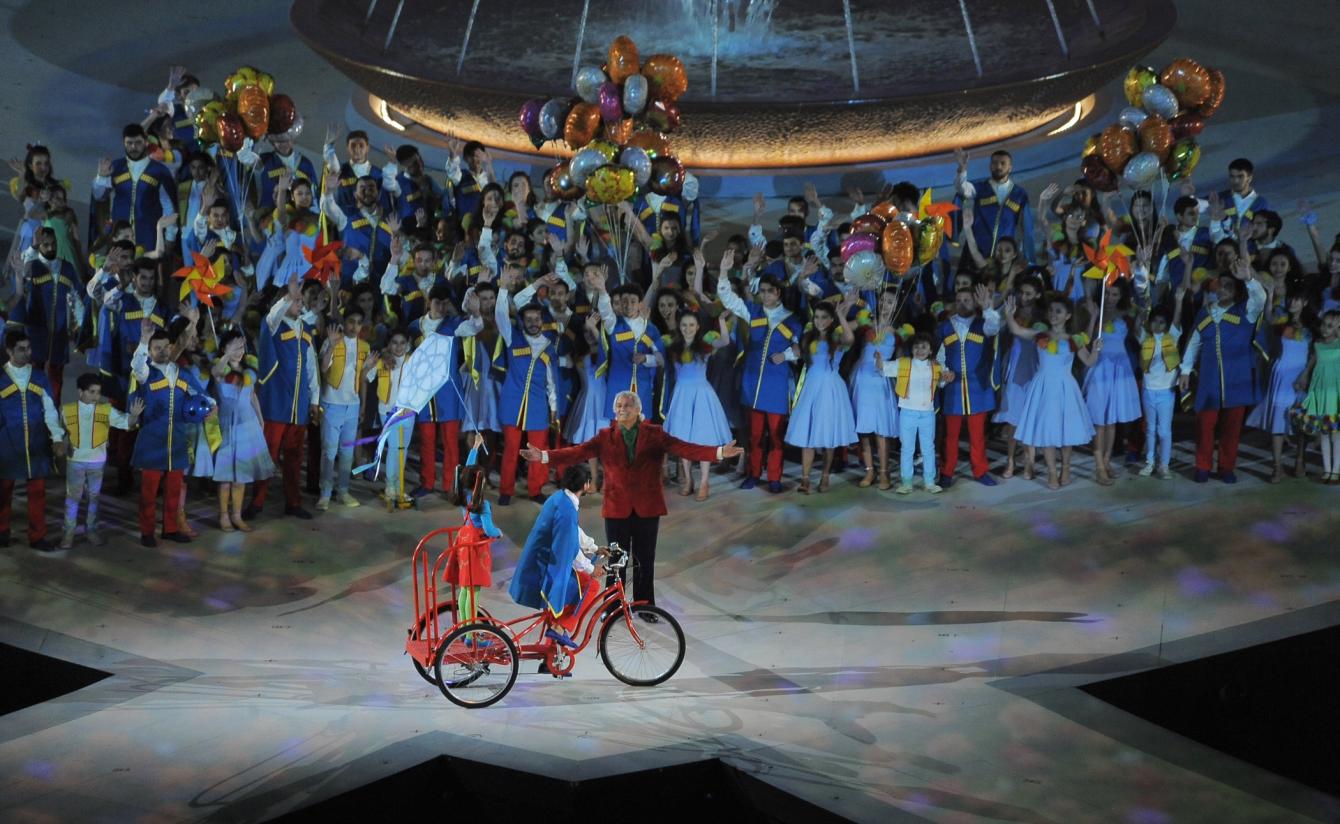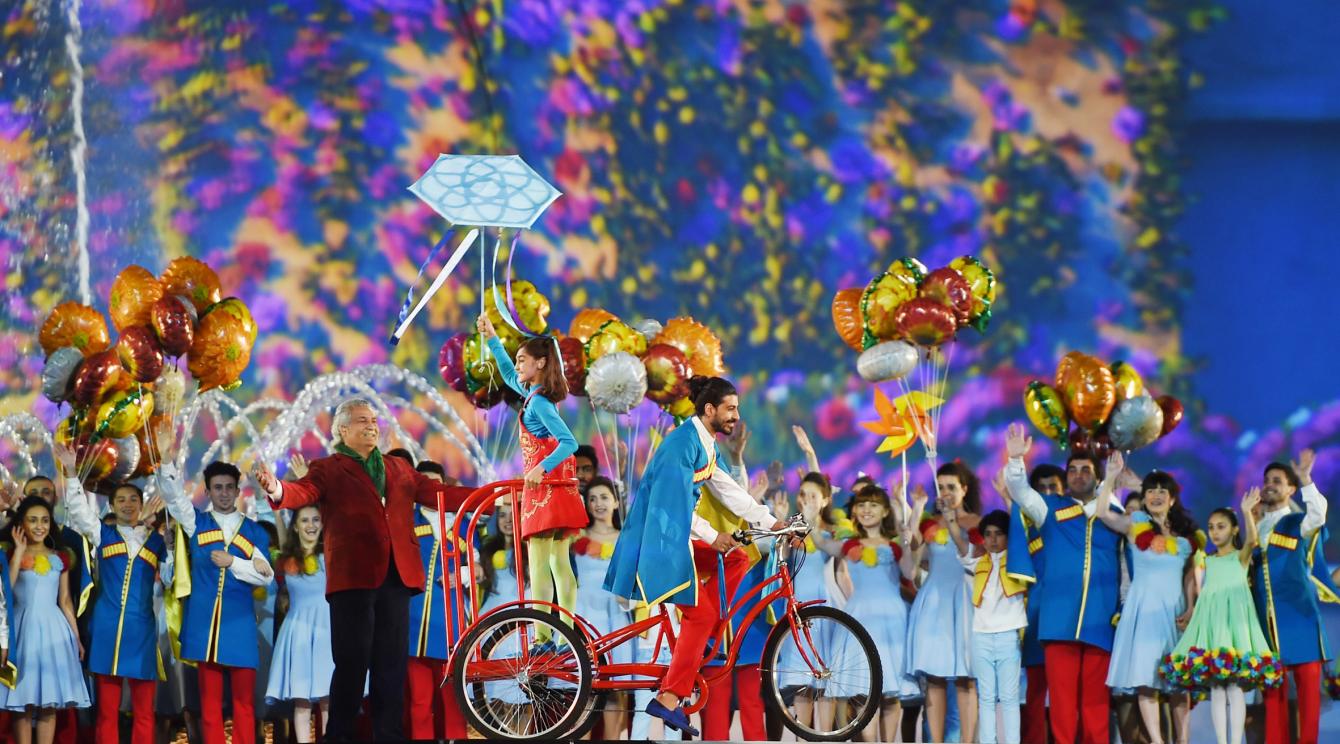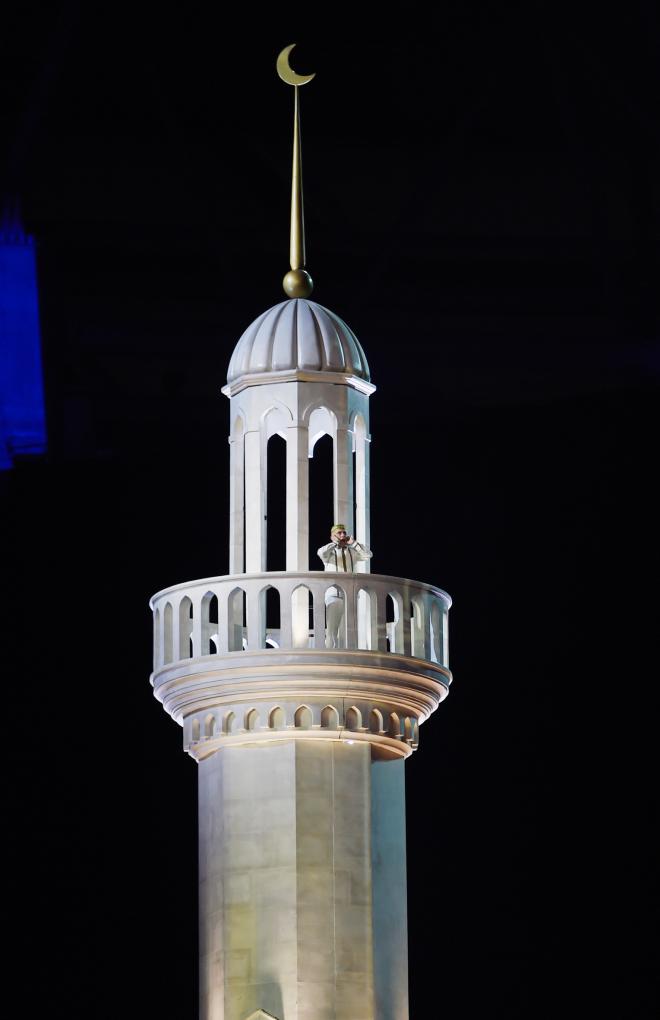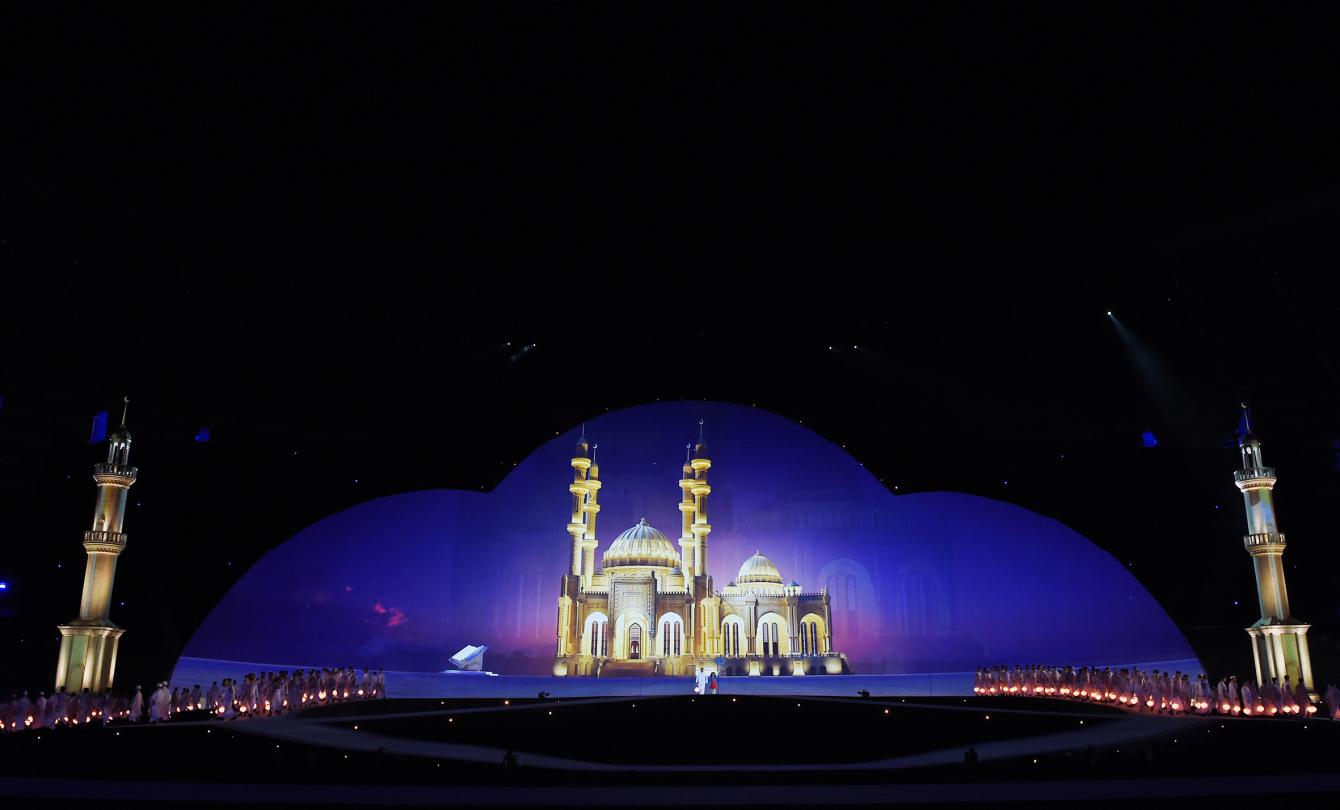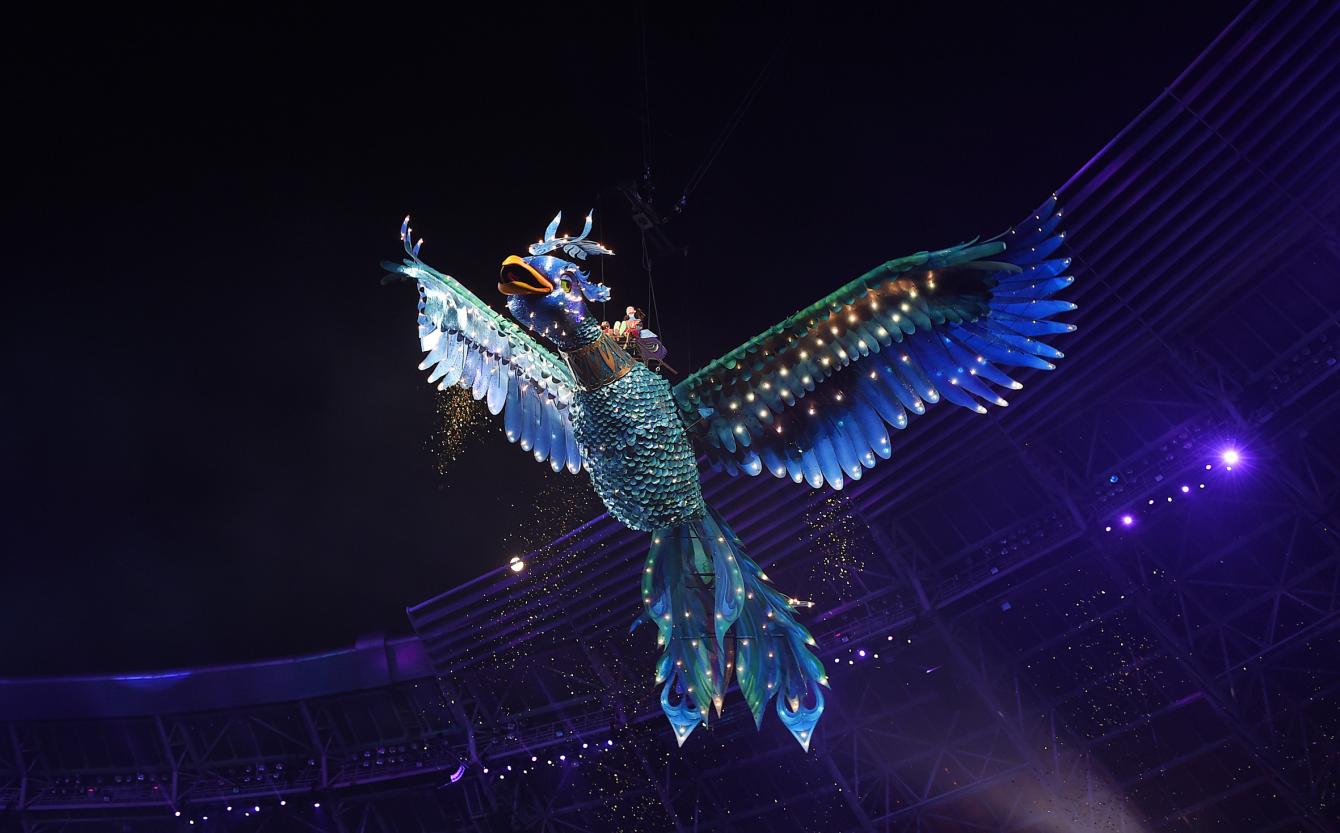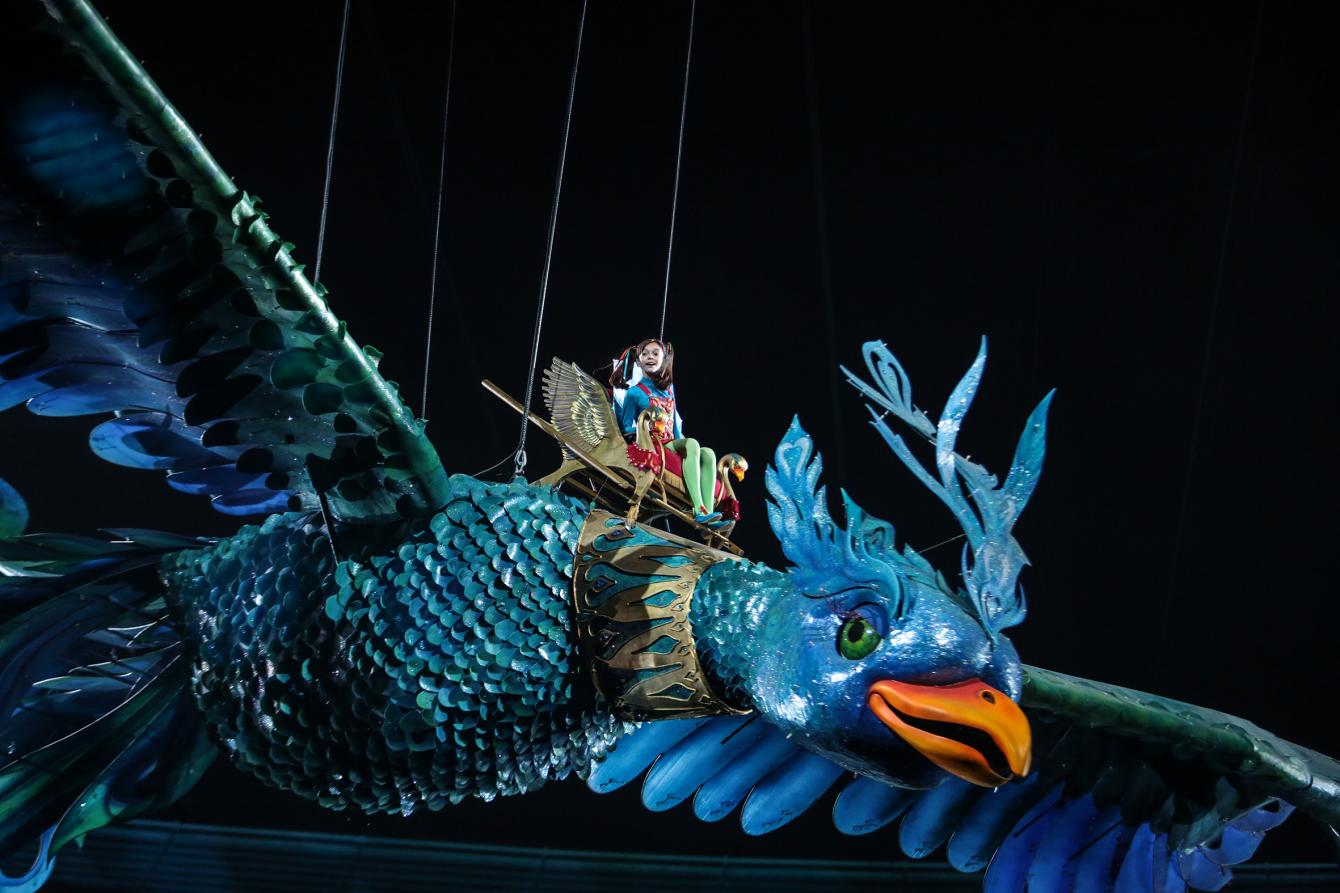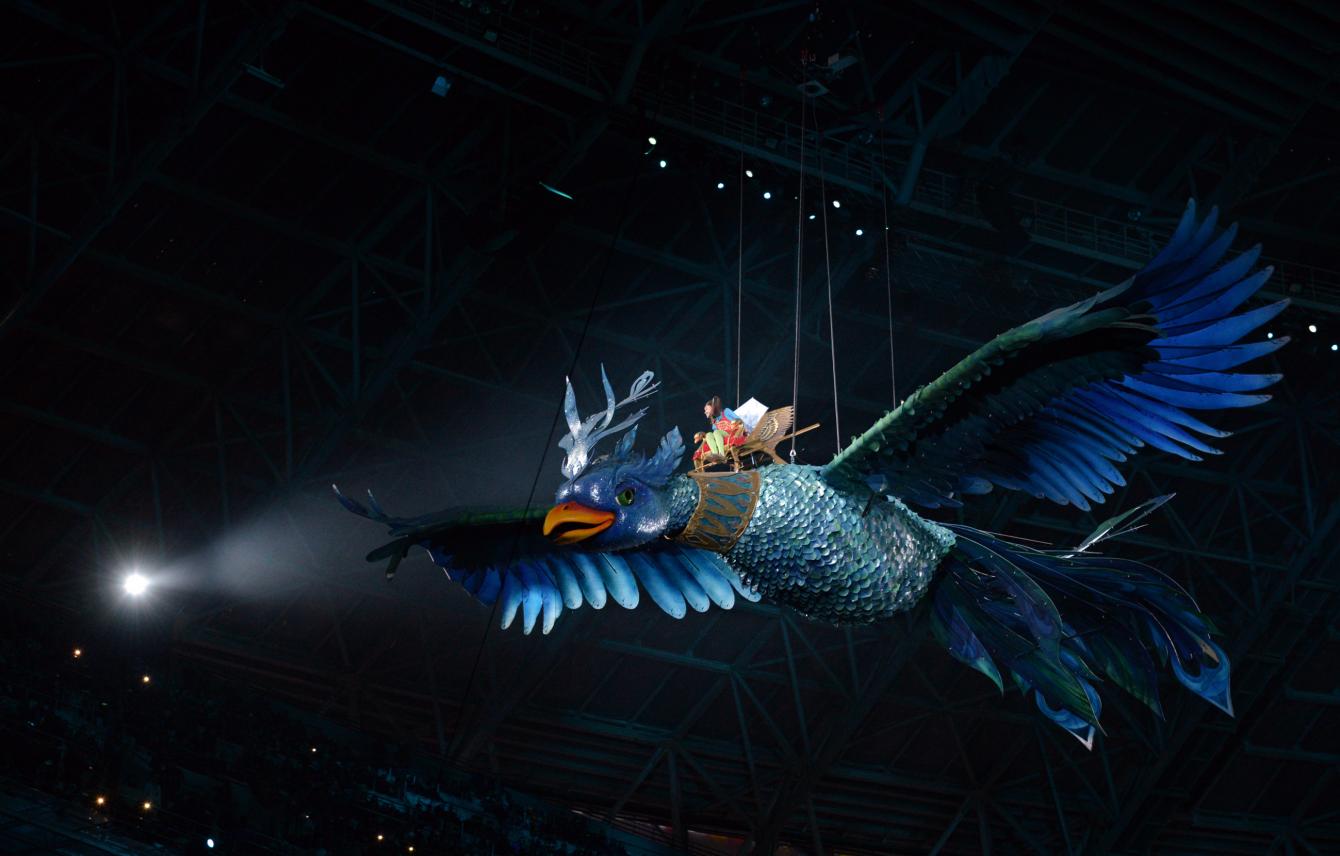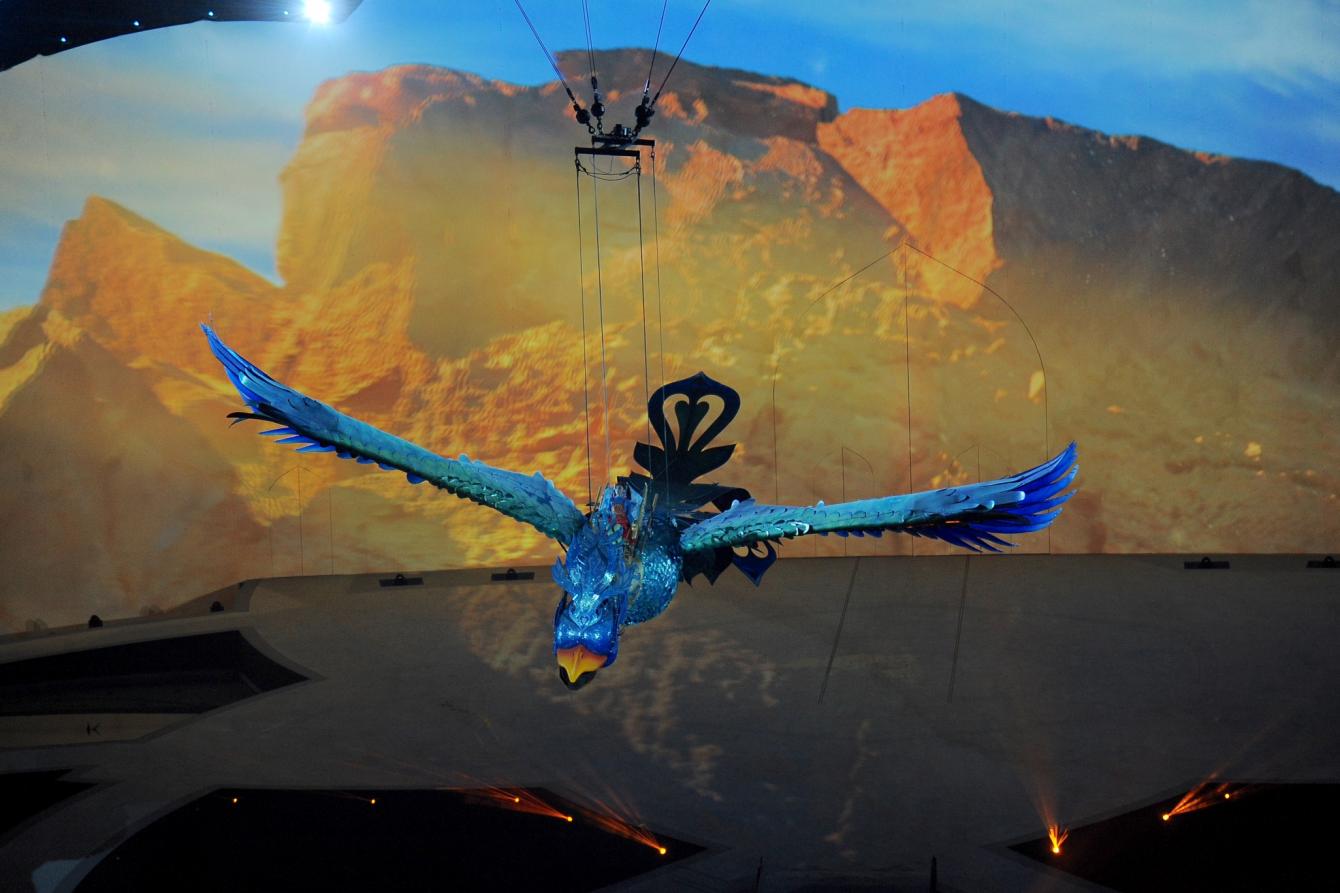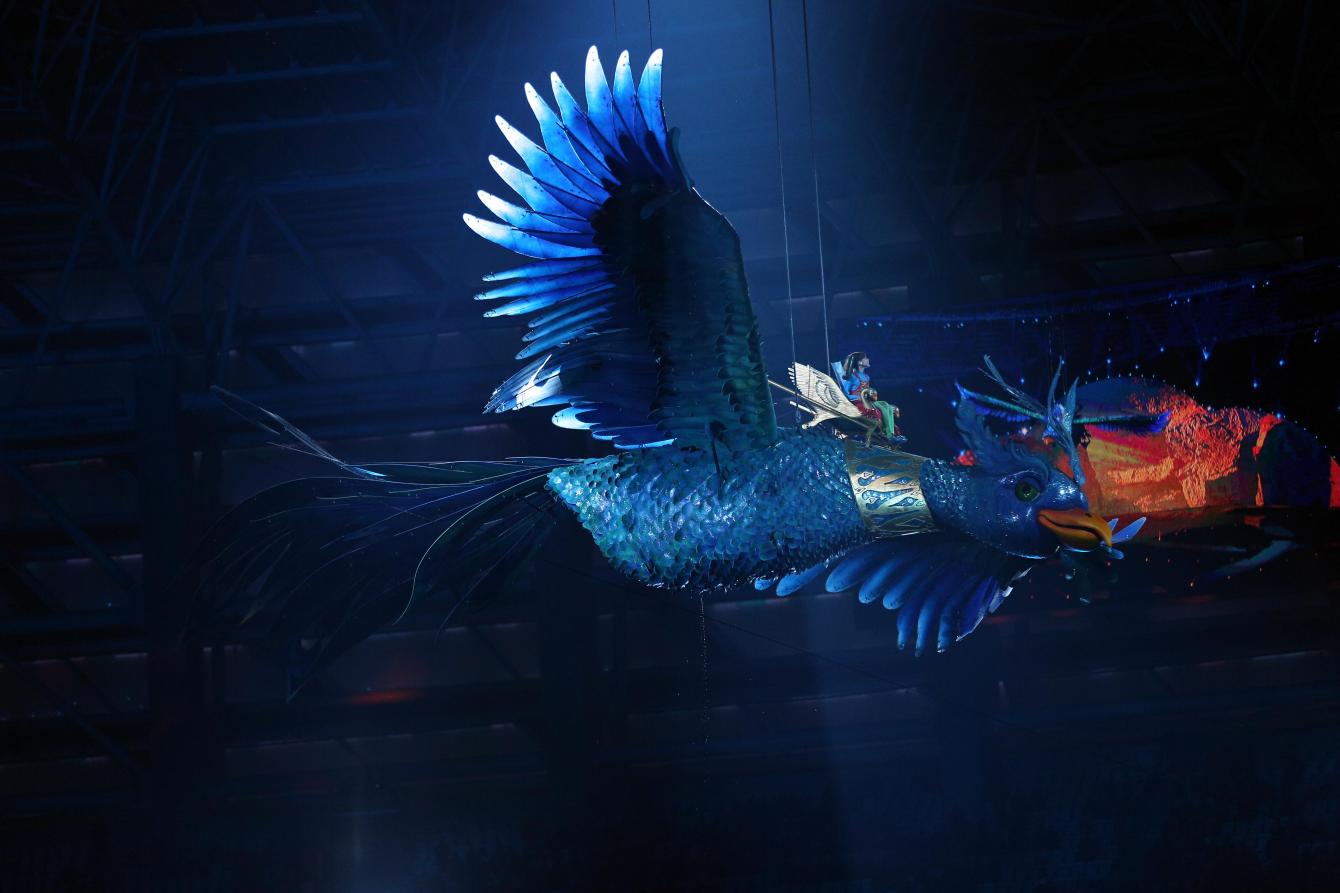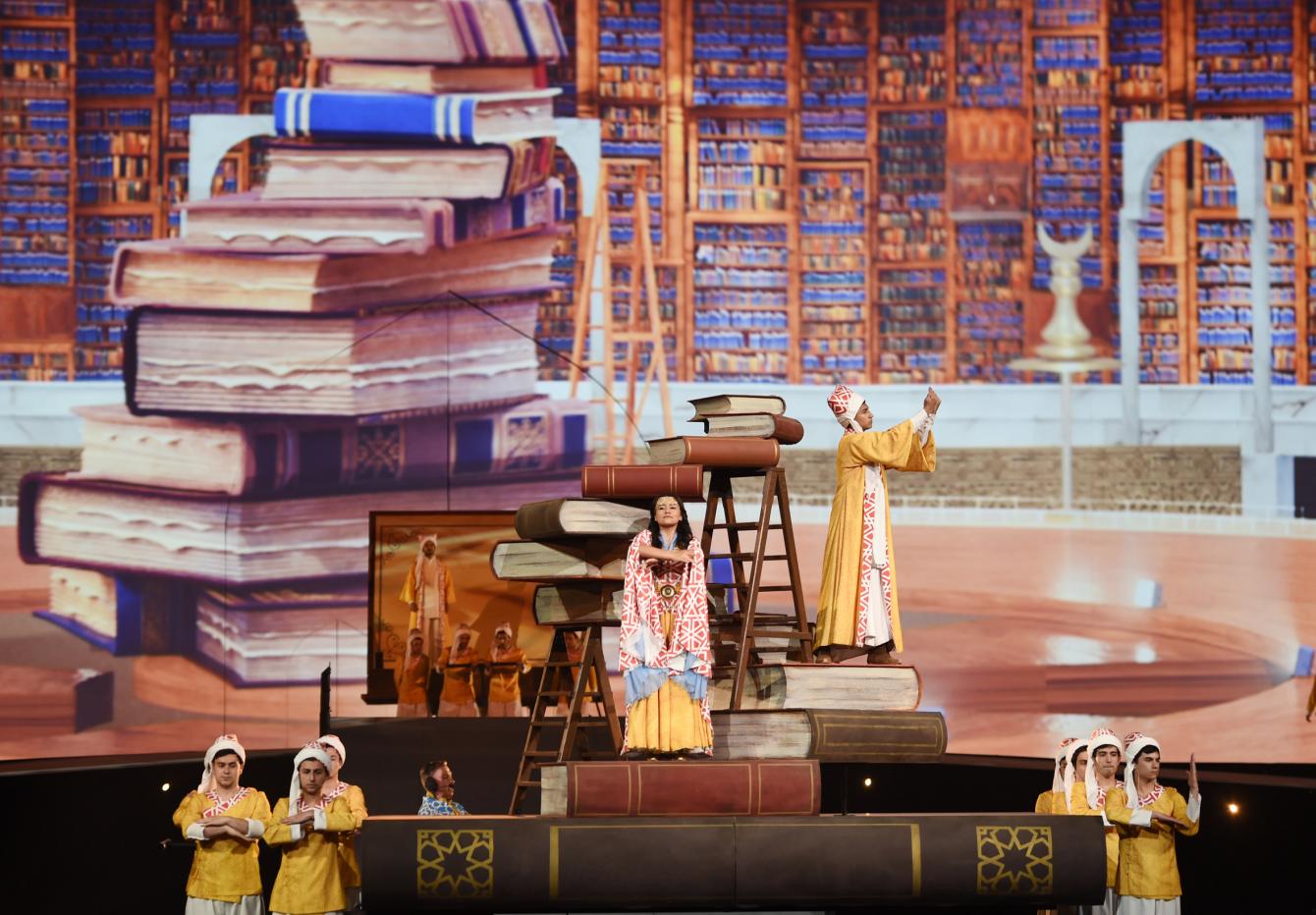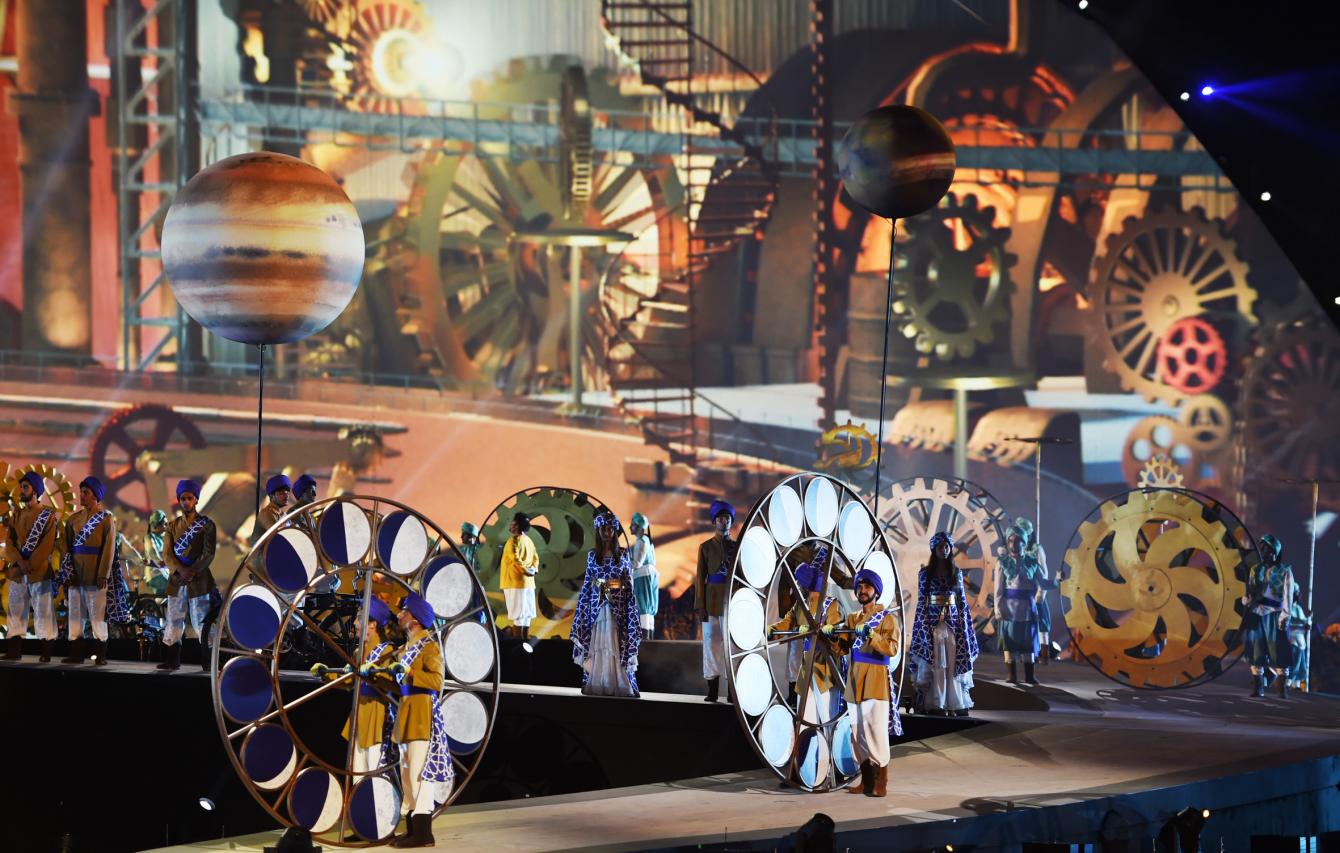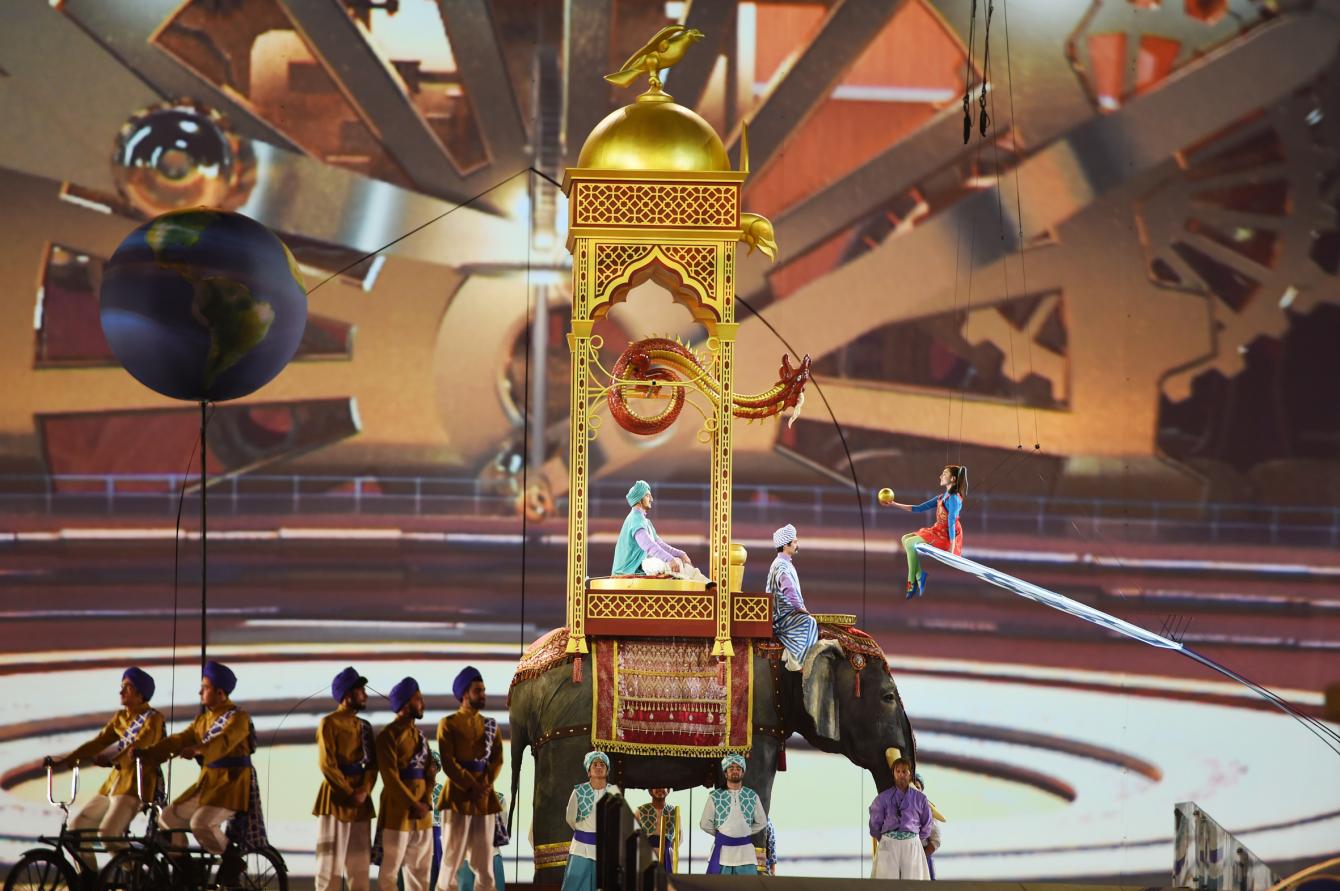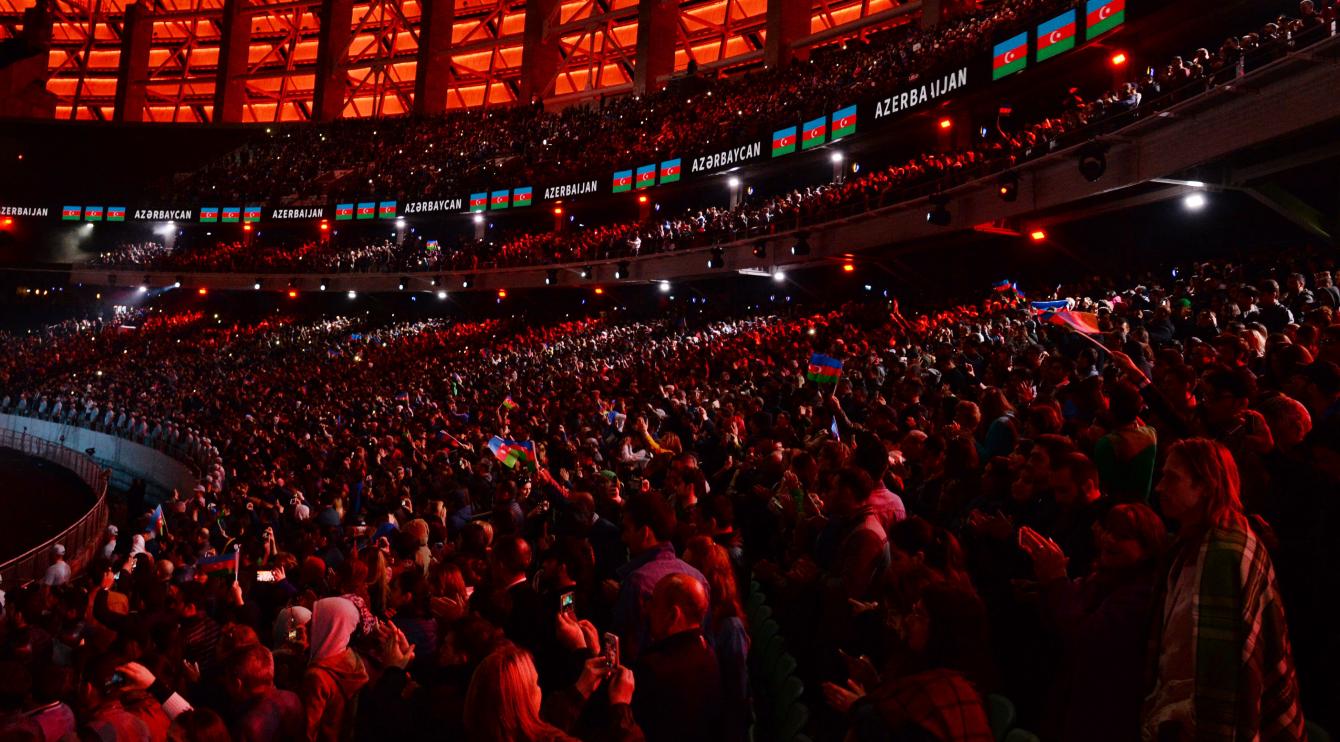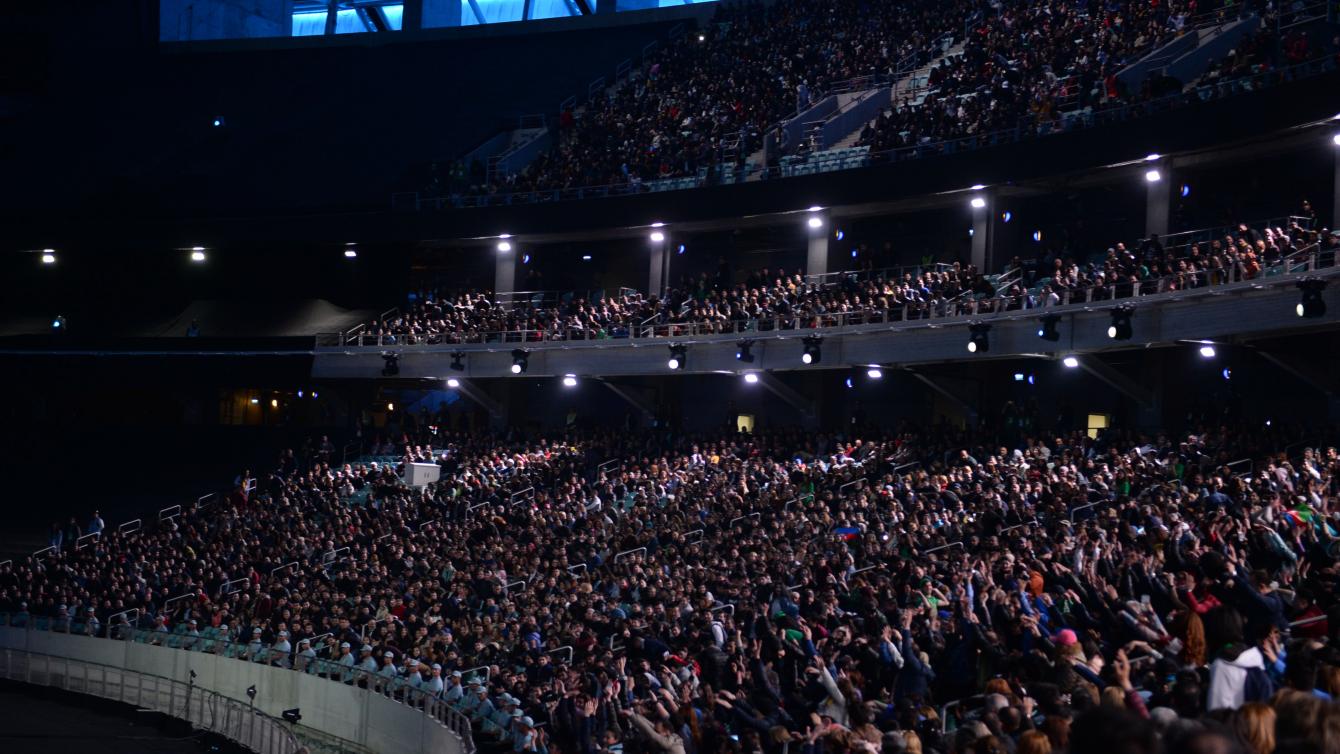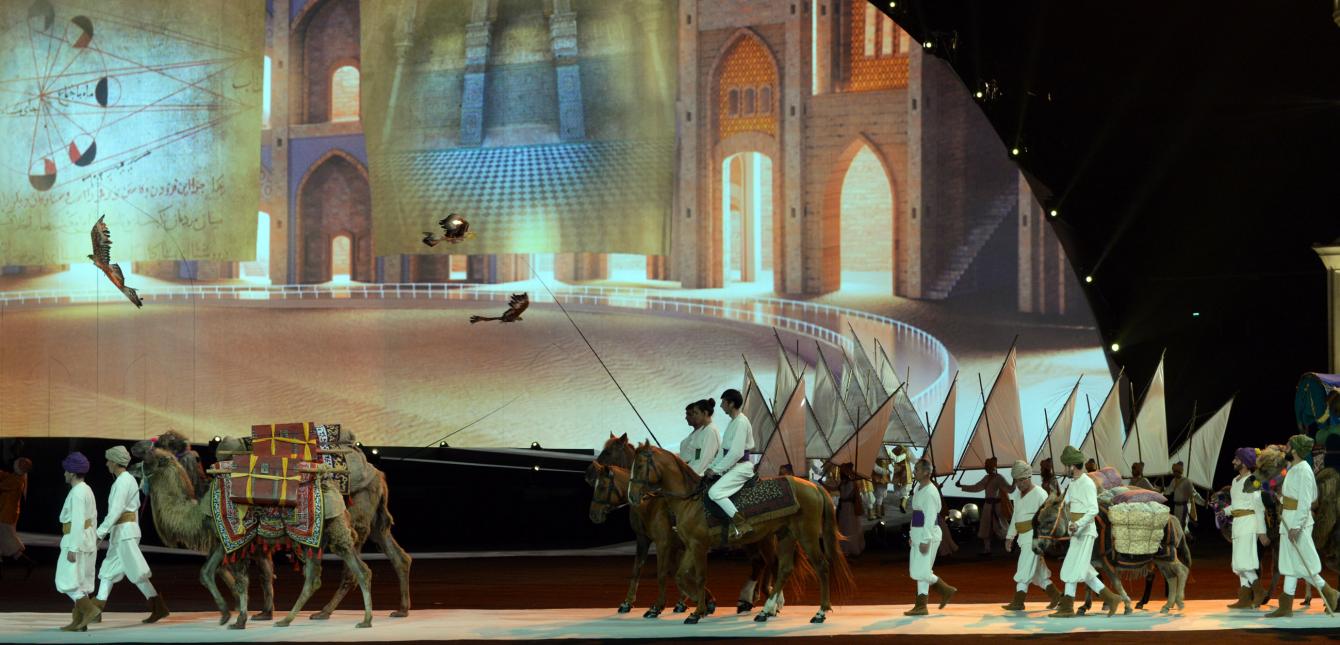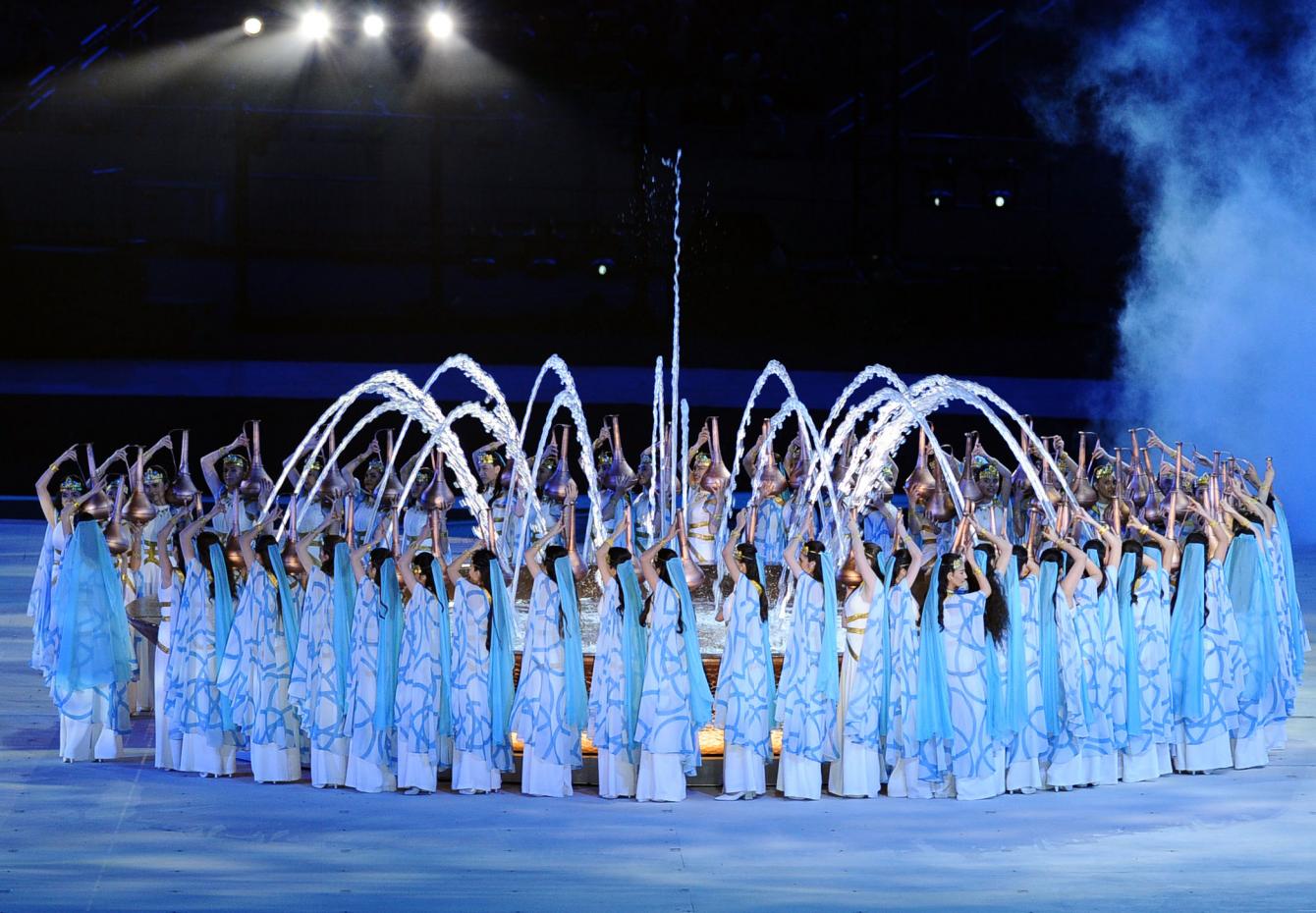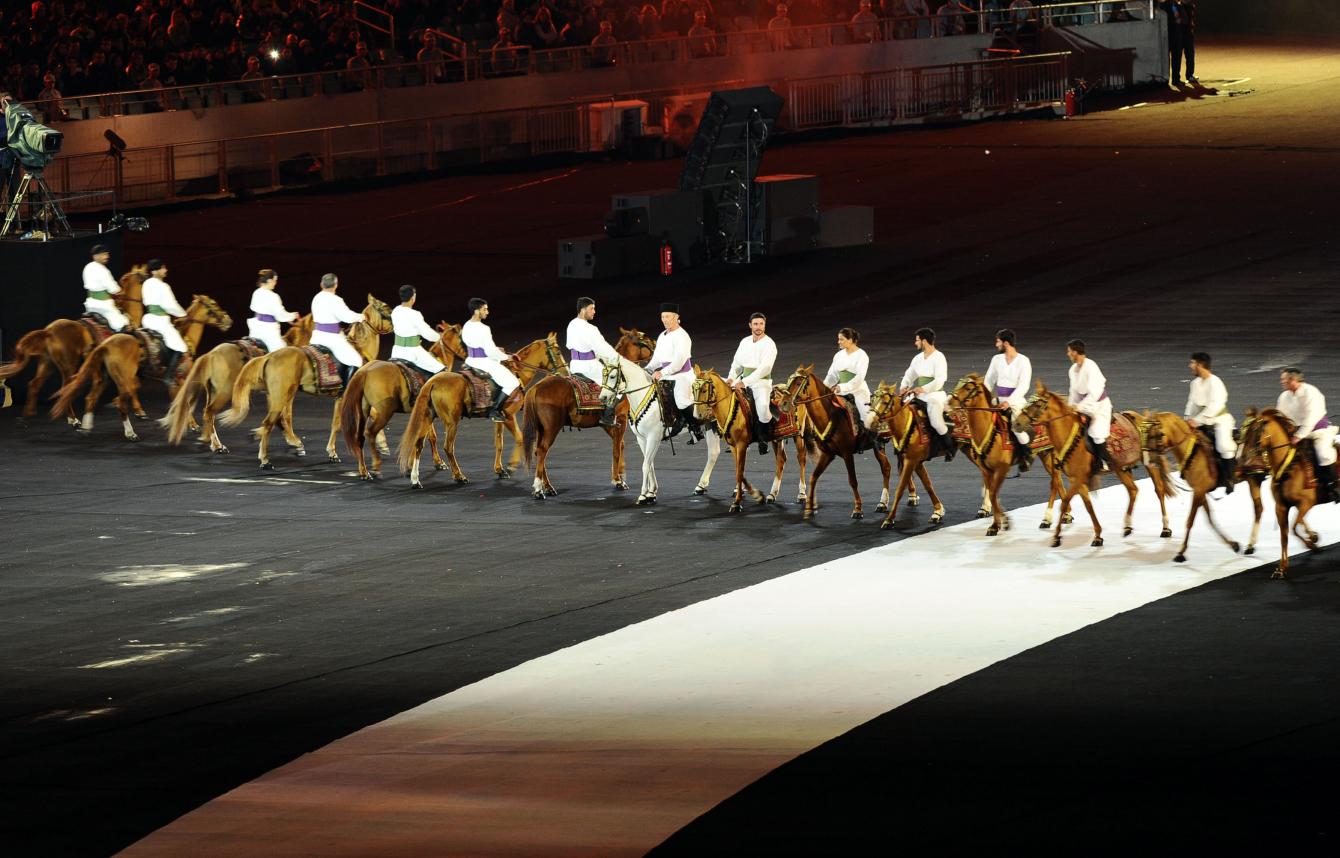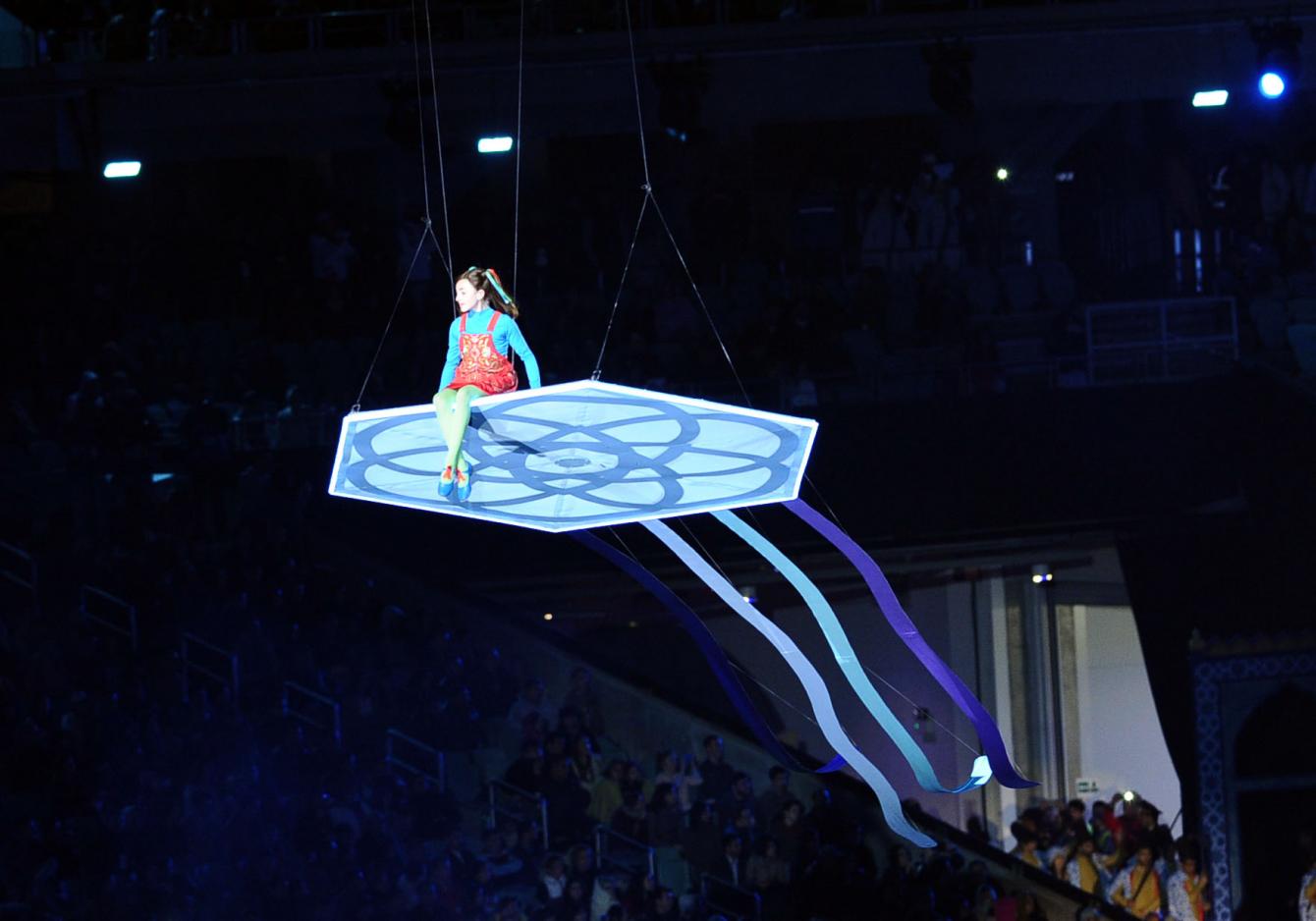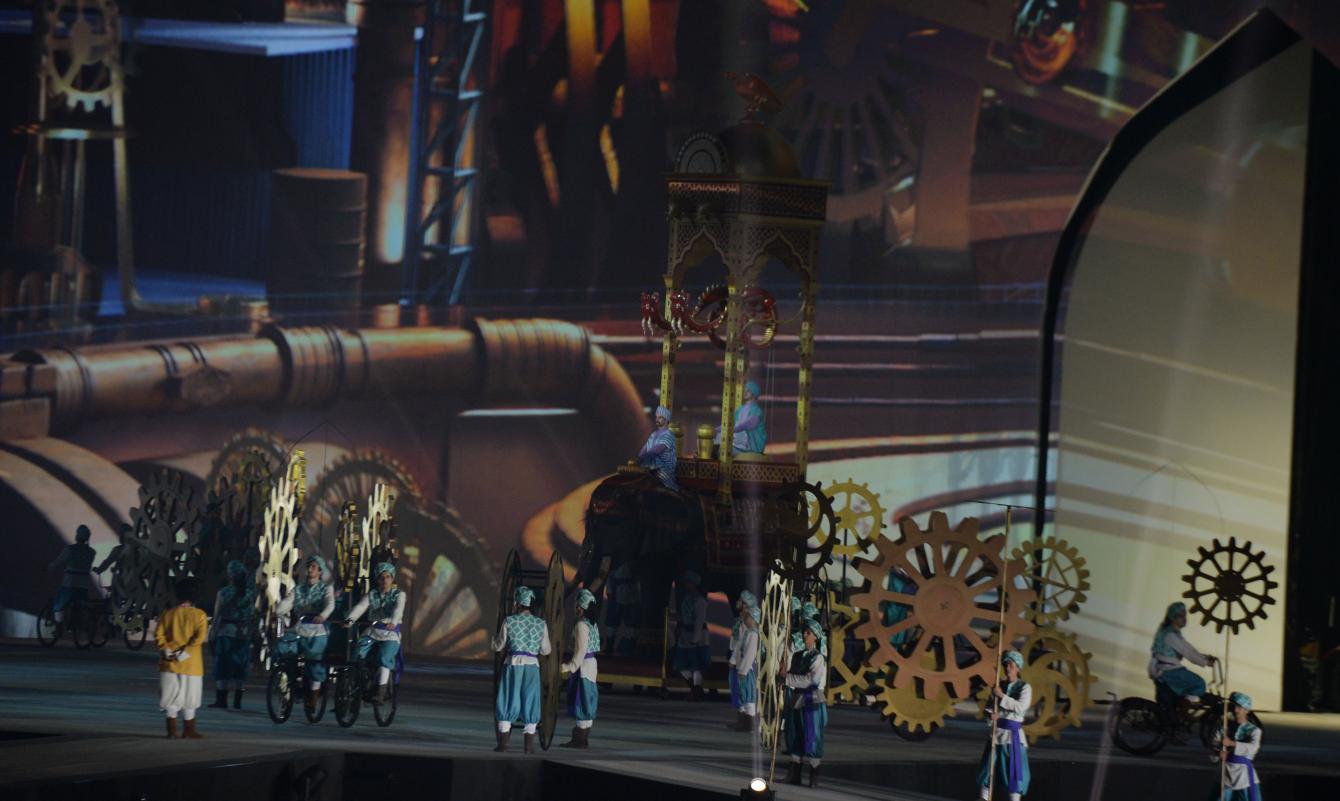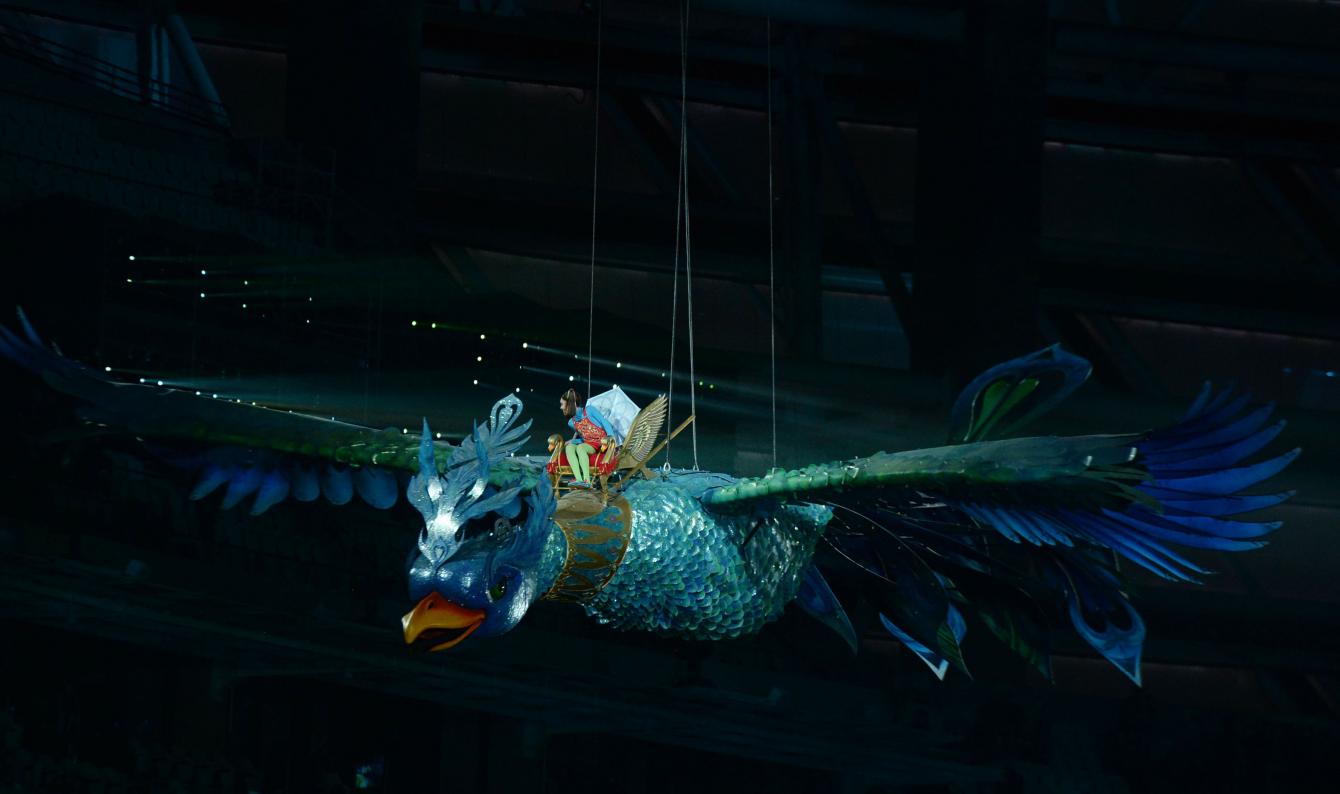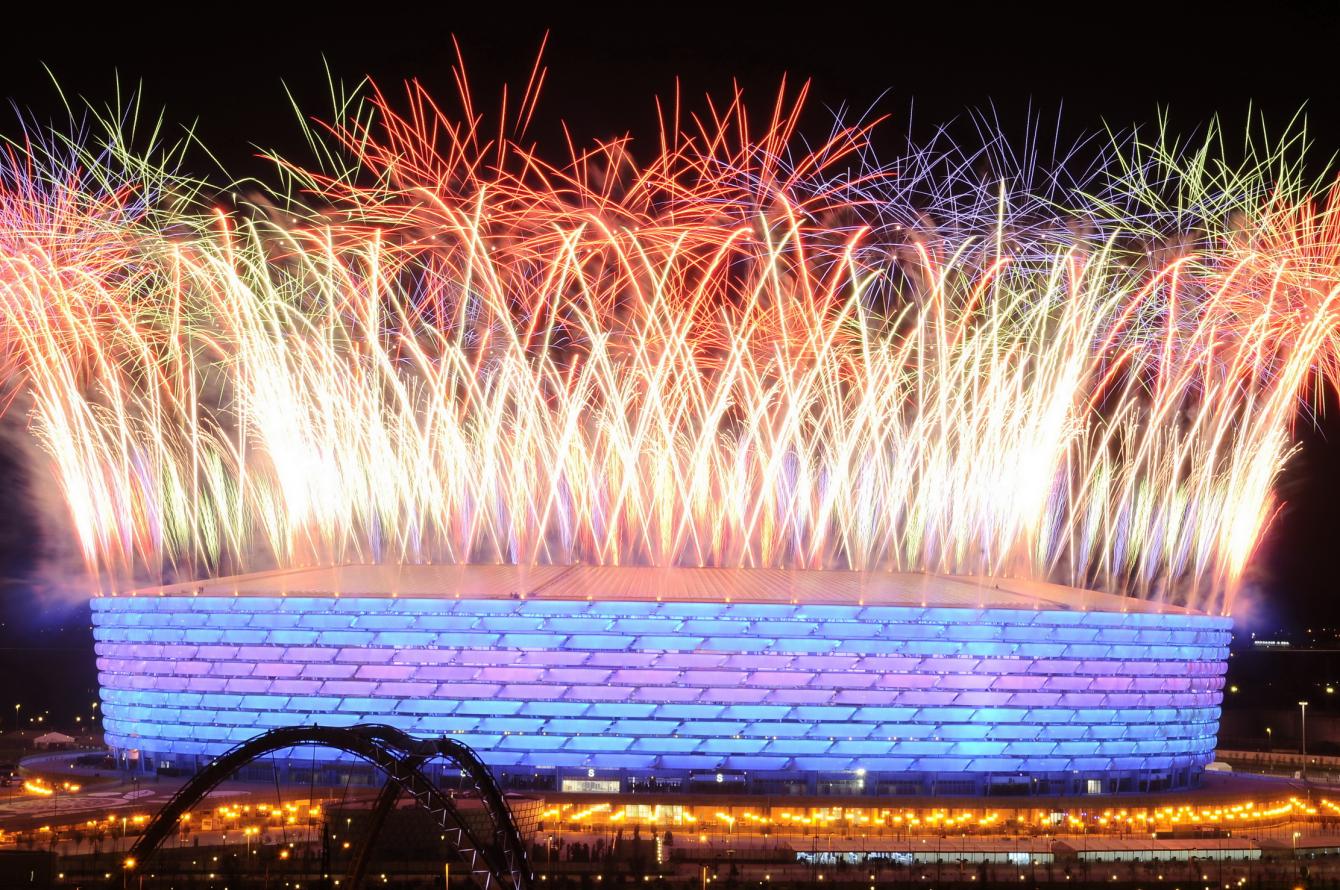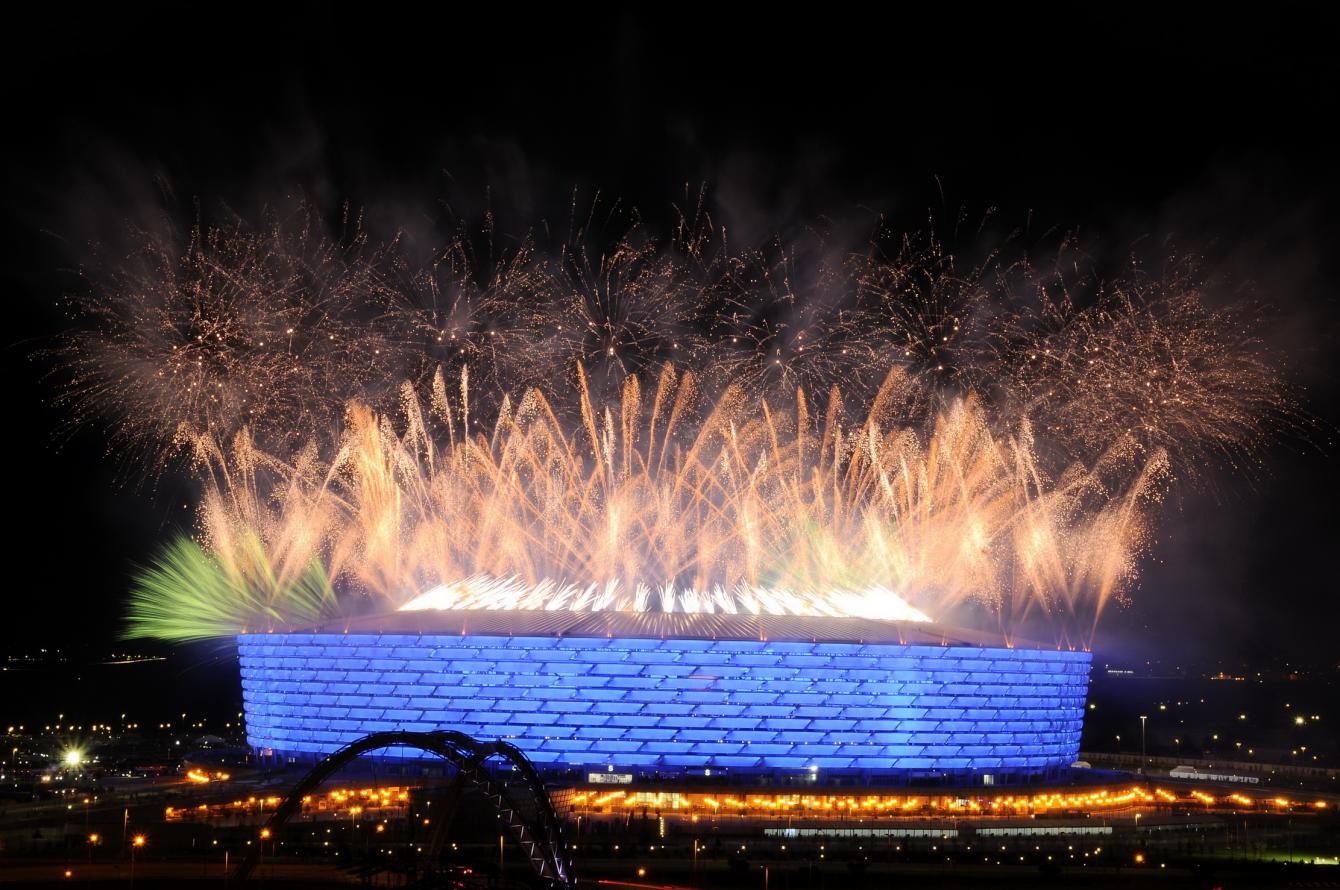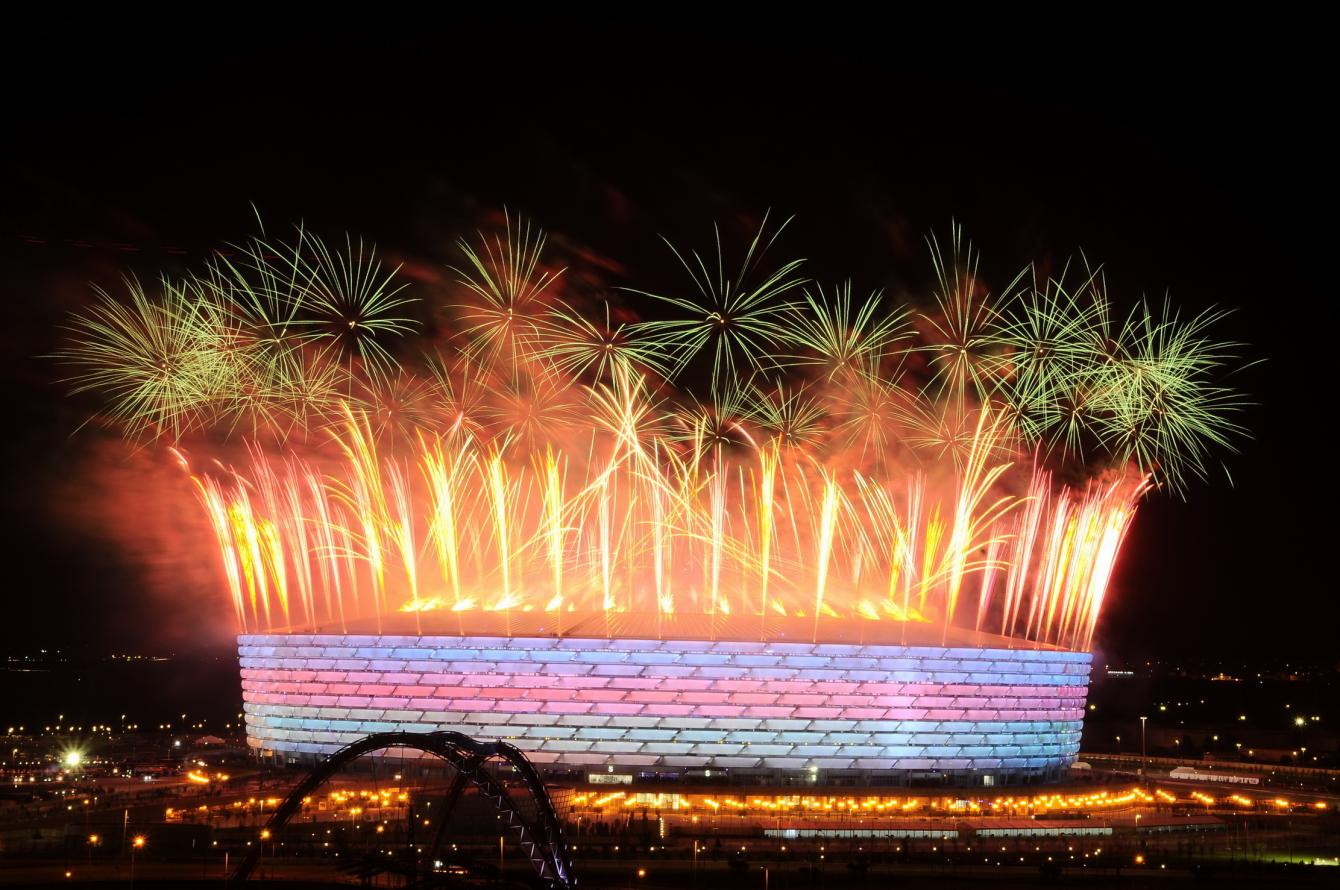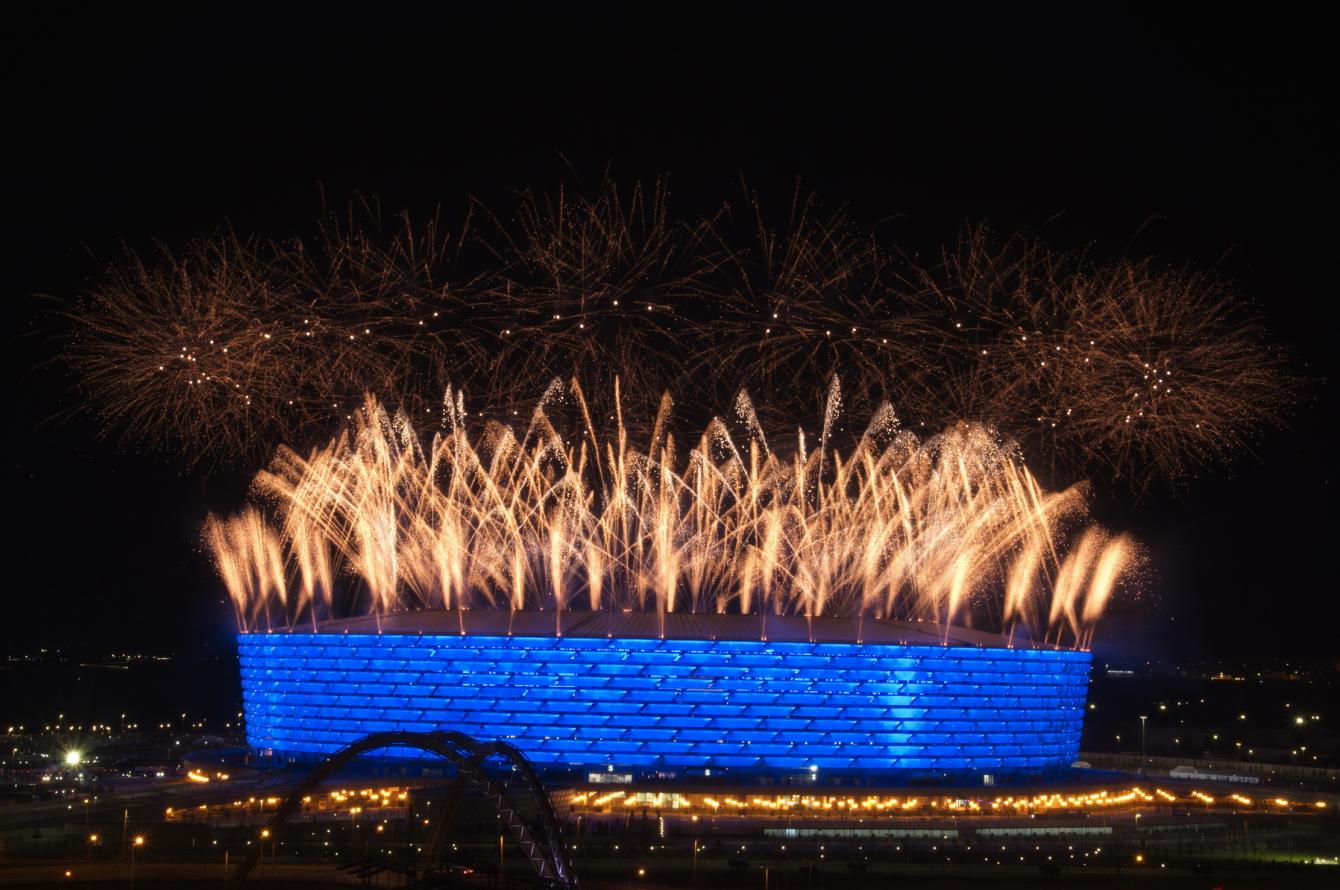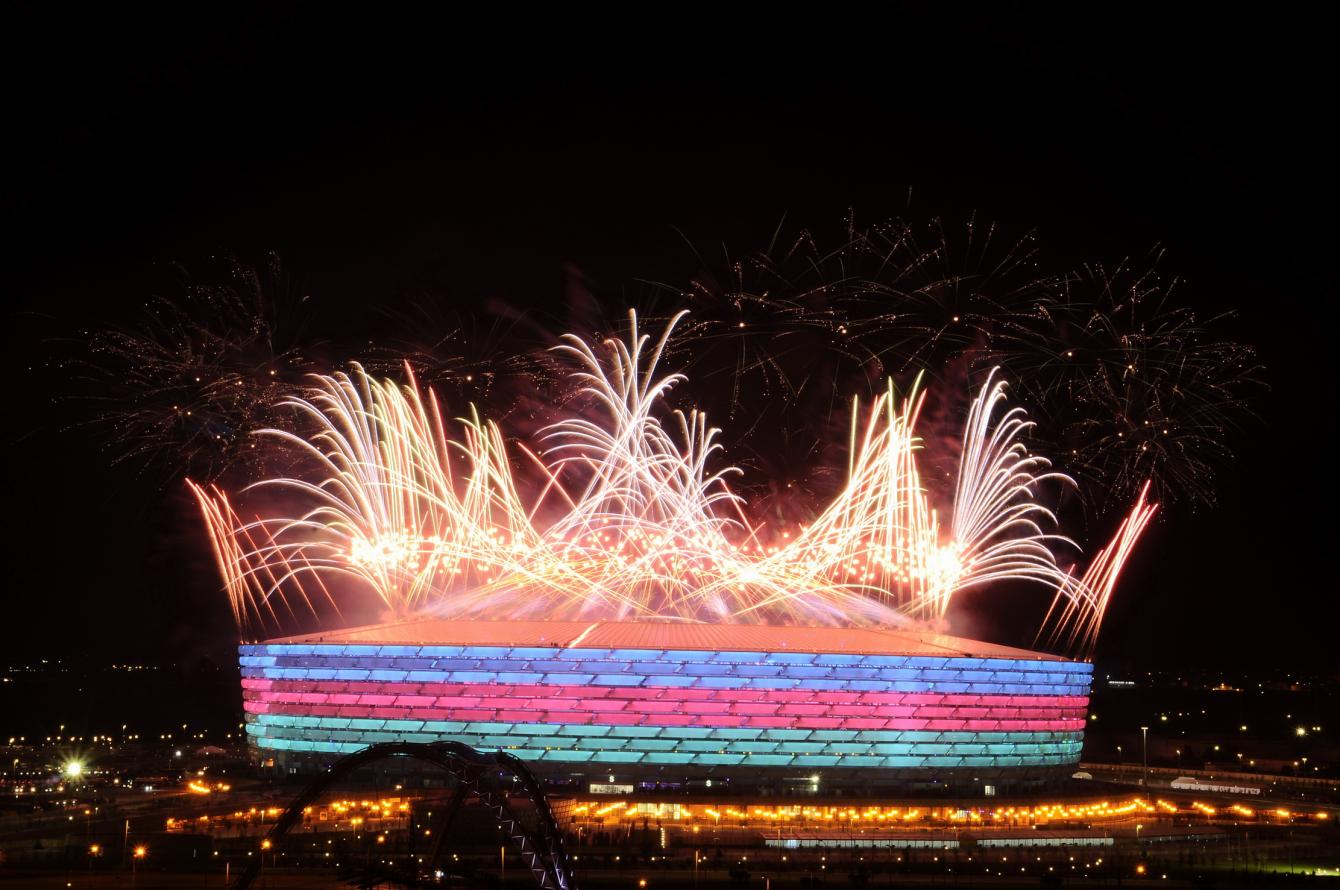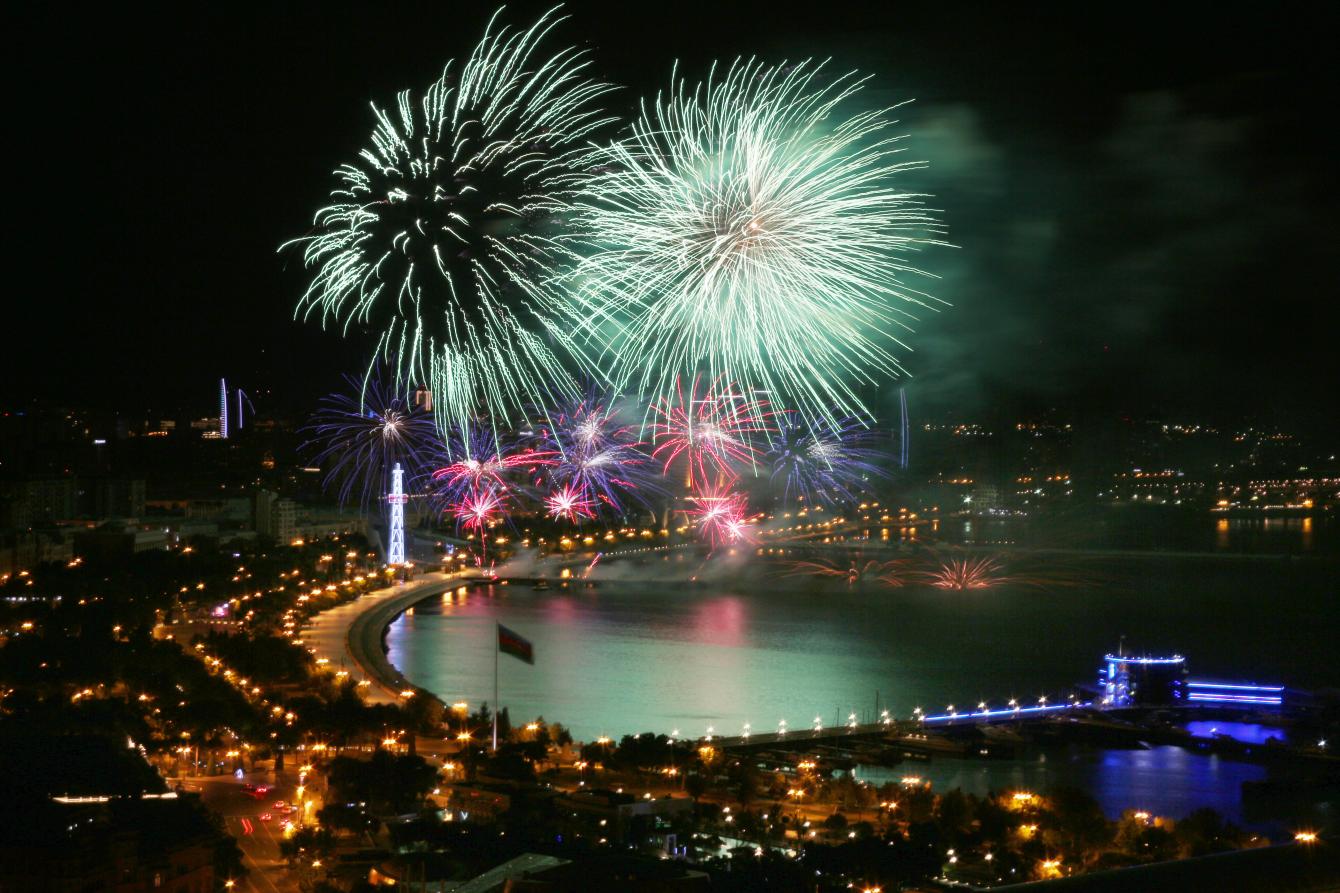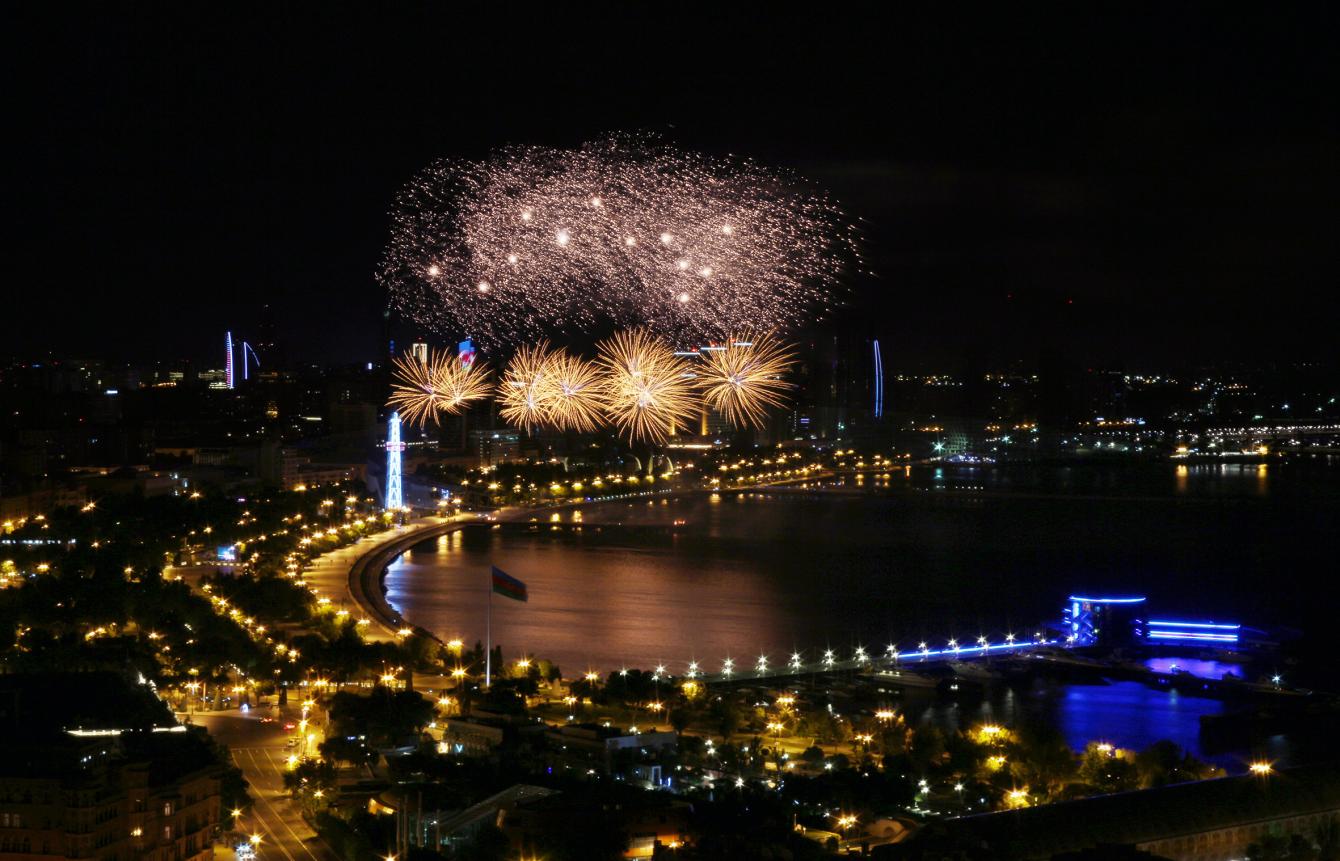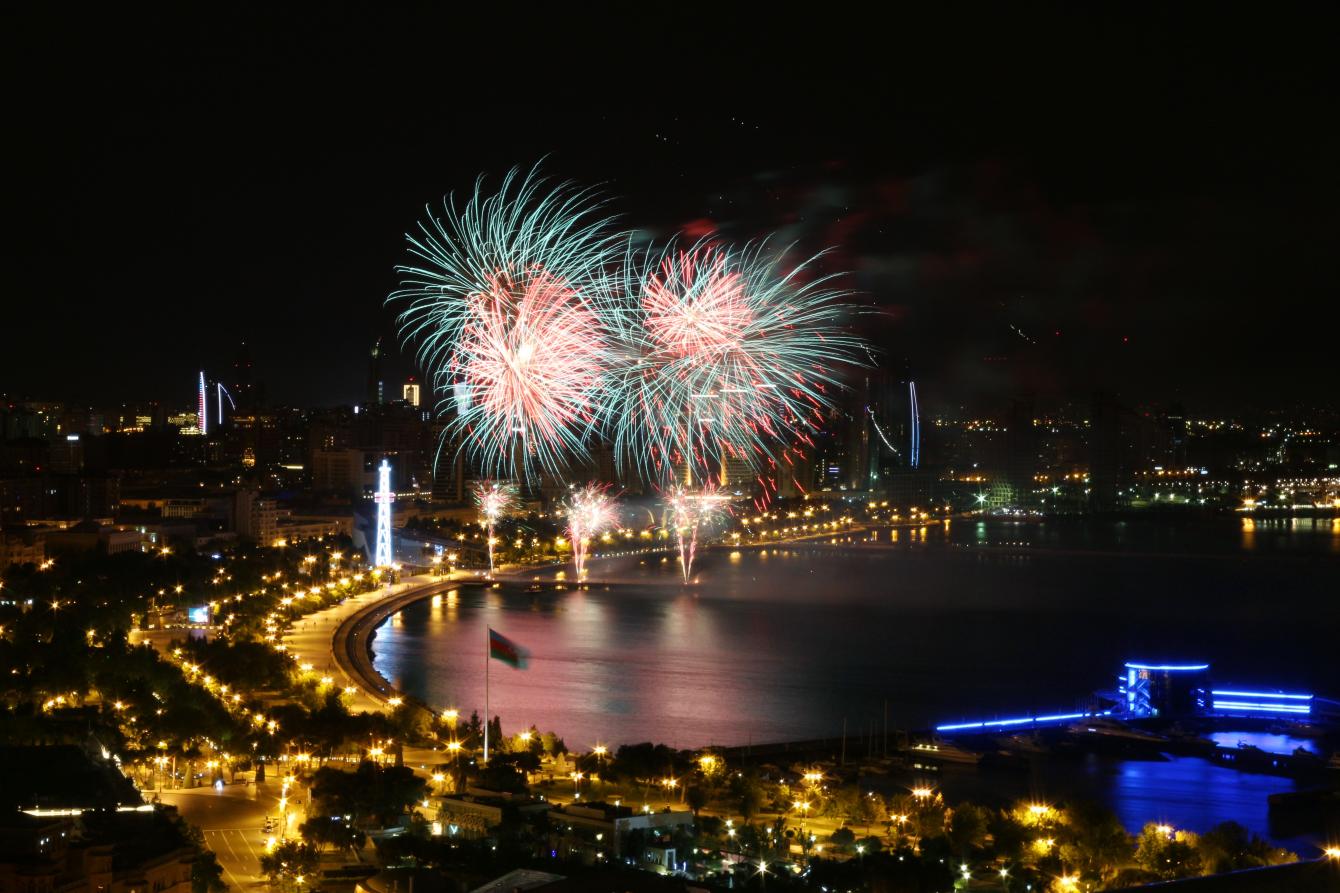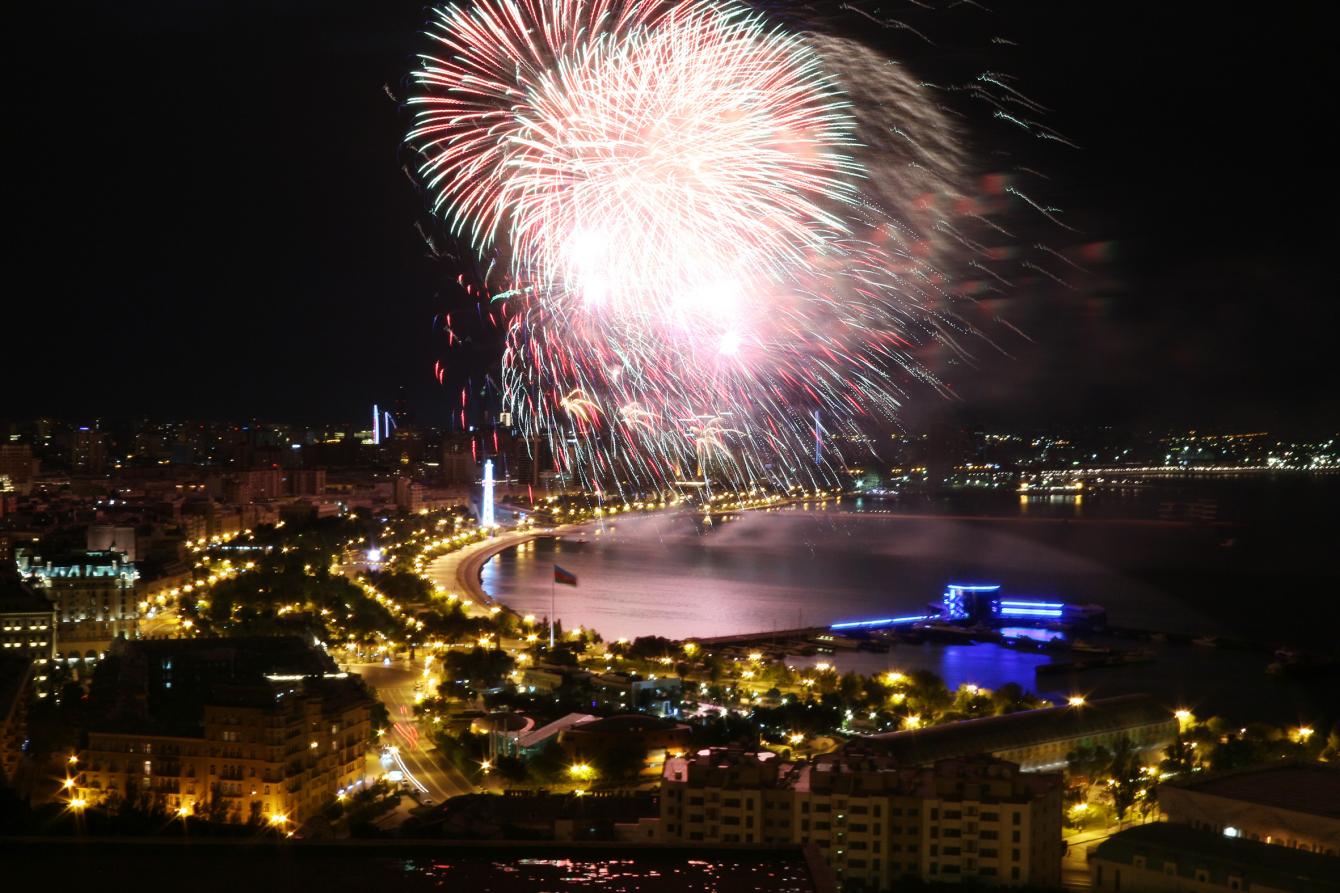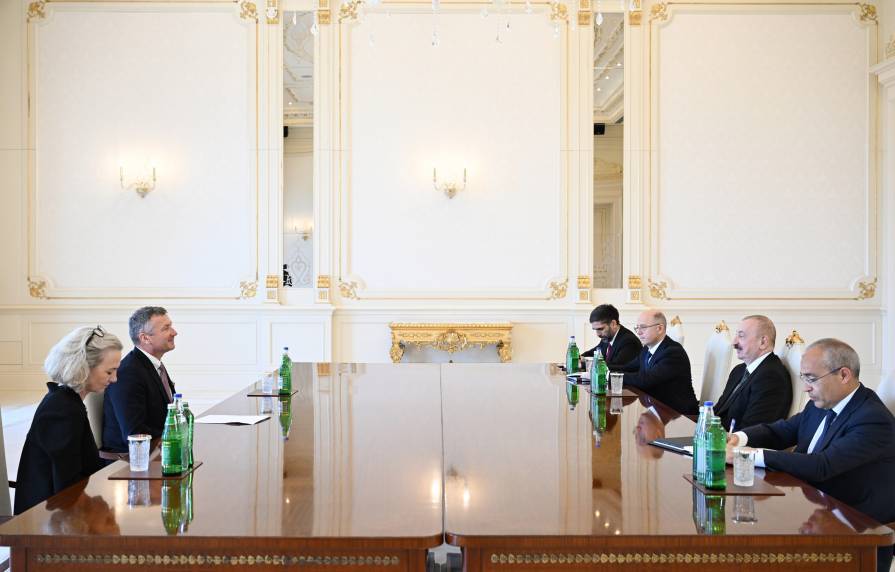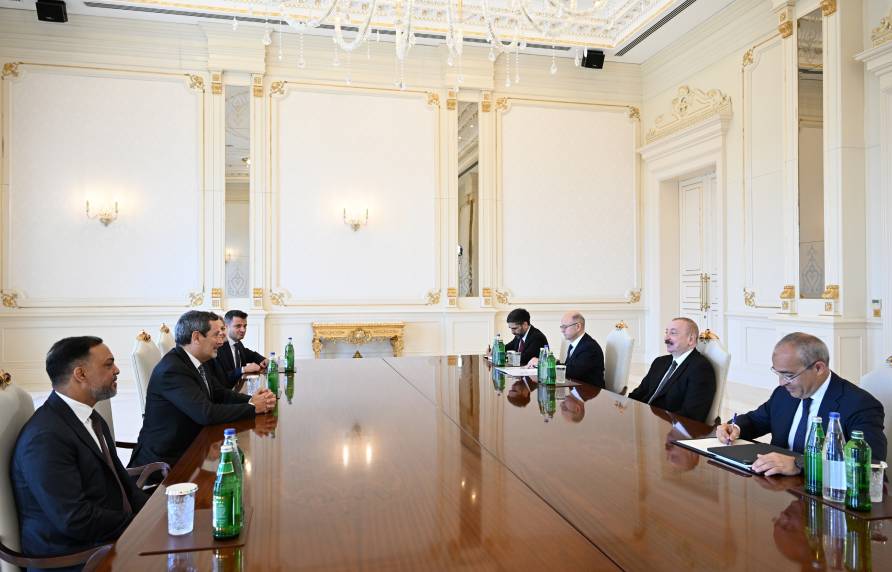The Azerbaijani capital of Baku has hosted the Opening Ceremony of another high-profile international sporting event – the 4th Islamic Solidarity Games.
The ceremony took place at The Baku Olympic Stadium, which has been transformed into an enormous theatre space equipped with a state-of-the-art projection system.
Seated in the VIP section at the stadium were President of the Republic of Azerbaijan Ilham Aliyev, first lady, chair of the Baku 2017 Organising Committee Mehriban Aliyeva, Secretary General of the Organisation of Islamic Cooperation Yousef bin Ahmed Al-Othaimeen and other officials.
In July 2013, Baku was announced as the host city for the fourth Islamic Solidarity Games – an exciting multi-sport event uniting the Islamic world.
Athletes from more than 50 Islamic countries will come together from 12 to 22 May 2017 to represent their nations over 10 days of competition across 20 different sports.
They include 24 disciplines (Athletics and Para Athletics, Aquatics: Diving, Aquatics: Swimming, Aquatics: Water Polo, Basketball 3x3, Boxing, Football, Gymnastics: Artistic, Gymnastics: Rhythmic, Handball, Judo and Blind Judo, Karate, Shooting, Table Tennis, Taekwondo, Tennis, Volleyball, Weightlifting, Wrestling: Greco-Roman, Wrestling: Freestyle, Wushu and Zurkhaneh) in 16 state-of-the-art competition venues across Baku.
The Organising Committee was set up by decree of President of the Republic of Azerbaijan Ilham Aliyev. The committee is headed by First Vice President of the Republic of Azerbaijan Mehriban Aliyeva.
The Azerbaijan Islamic Solidarity Games Operations Committee (AISGOC) is organizing and running the Games in cooperation with the Islamic Solidarity Sports Federation (ISSF).
Azerbaijan has hosted a number of major events in the past few years. In 2015, the inaugural European Games and the Chess World Cup were held in Baku. The following year, Azerbaijan hosted the World Chess Olympiad, Arena Polo World Cup, UEFA European Under-17 Championship and AGF Trophy World Cup 2016 Rhythmic Gymnastics Finals.
Looking ahead, in the summer of 2017 the Azerbaijan Grand Prix will see Formula 1 cars racing through the streets of Baku for the second year running; and later in the year, the Women’s European Volleyball Championship will be held in the city. In 2020, Azerbaijan will host the European Karate Championship, plus three group stage football matches and a quarter-final of the UEFA Euro Championship at the Baku Olympic Stadium.
Baku 2017 Islamic Solidarity Games launched the Journey from the Caspian, which started with a ceremony at the Stone Chronical Museum on April 5. During the launch ceremony, 16 children from across Azerbaijan were presented with a copper Baku 2017 Water Vessel, containing water from the Caspian Sea, which they took back to their home towns and cities. In doing so, they brought the spirit of the Baku 2017 Islamic Solidarity Games to the people of Azerbaijan.
Over the course of its journey, which exceeded 3,000 km in 37 days, the Journey from the Caspian visited spectacular water locations across Azerbaijan.
In his article headlined “The strengthening of Islamic Solidarity is a challenge of time”, which was published in the OIC Journal, President Ilham Aliyev highlighted the importance of the Islamic Solidarity Games: “Today the Islamic world needs unity and solidarity like never before. Therefore, declaration of 2017 as “The Year of Islamic Solidarity” in Azerbaijan is a goodwill message to the Muslim community and to the whole world. Major goals of “The Year of Islamic Solidarity” are to strengthen unity in the Muslim world and to show the whole world that Islam is a religion of peace and culture. I think that apart from being a sporting event, the Islamic Solidarity Games will be the days of unity and solidarity of the Islamic world.”
At the final meeting of the Baku 2017 Organising Committee, First Vice-President Mehriban Aliyeva said: “We are completely ready to successfully host the Games in our country. Our aim is to host the 4th Islamic Solidarity Games at the most decent level in Azerbaijan. There are all conditions for that. We have state support. The organizing committee has been working successfully. We have the team, the volunteers are ready. I’m sure that we would be able to make another important achievement in the glorious and rich history of our country.”
Baku 2017 Islamic Solidarity Games have four core values: Unity, Peace, Respect, and Excellence. The motto of the Games is “Solidarity is our strength!”
Prince Abdullah Bin Mosaad Bin Abdulaziz, President of the Islamic Solidarity Sports Federation, said: “I would like to thank the people of our wonderful host nation – Azerbaijan – and First Vice President Mehriban Aliyeva for her leadership as Chair of the Baku 2017 Organising Committee. Azerbaijan is passionate about sport, and has shown unwavering commitment to hosting an event of the highest standard. I have no doubt that these Games will be a credit to the hard work and commitment of Baku 2017’s organisers and volunteers, and that our athletes will be provided with the perfect conditions in which to excel.”
Azad Rahimov, Minister of Youth and Sport of the Republic of Azerbaijan, Chief Executive Officer of Azerbaijan Islamic Solidarity Games Operations Committee, said “this evening’s Ceremony will be an unforgettable celebration of unity and solidarity, as Azerbaijan honours its heritage while continuing to build a reputation as a centre for international exchange and major sporting events, including the Azerbaijan Grand Prix this summer and UEFA European Football Championship matches in 2020”. “The Baku 2017 Islamic Solidarity Games are the culmination of over 20 months of careful planning and preparation, and we are ready to host thousands of athletes at 16 state-of-the-art sporting venues.”
Catherine Ugwu, Director of Ceremonies and Executive Producer, said: “These Islamic Solidarity Games in Baku come at a critical moment in world history. A time marked by uncertainty and discord, when our differences seem to divide rather than unite us. Tonight, our Ceremony seeks instead to focus on what brings us together, as nations and as people.” “Ours is a universal story of peace rooted in the culture and traditions of Azerbaijan. A timely reminder of the enormous contributions Islamic civilisation has made to everything we see and do today. A tale of solidarity and hope filled with optimism for our collective future. Thousands of people from across the world have worked many months to make this Ceremony a reality – I’d like to thank them all for their creativity, passion and commitment.
My heartfelt gratitude goes to the President of the Republic of Azerbaijan, Ilham Aliyev, the First Vice President of the Republic of Azerbaijan and Chair of the Baku 2017 Organising Committee, Mehriban Aliyeva, and the Minister of Youth and Sport, Azad Rahimov.”
Nathan M. Wright, Artistic Director, said: “At the heart of our Ceremony is a little girl from Baku, Mina. We follow her on a journey of discovery, guided by her friendly kite. Along the way she learns about her identity and heritage, her beliefs and dreams. By the end, her hope for the future is all-embracing, her joy an inspiration. Mina’s story is a celebration of the power of community and unity. A wish, for a better world living in peace and harmony.”
The stage design – an interlaced pattern of circles forming a central hexagon in tribute to the extraordinary geometric designs characteristic of Islamic art – features two minarets, each 28m high.
The vast screen (85m wide by 35m high) was filled with rich video content developed over many months – from hyper-real animations to stunning cinematic sequences.
More than 5,000 people from 31 different countries have helped make the Baku 2017 Ceremonies a reality, including production staff, technical crew and cast.
The Opening Ceremony was brought to life by 2,200 volunteer performers from Azerbaijan. They are joined on stage by more than 40 animals – horses, camels and donkeys. The music heard in the Ceremony – performed by more than 100 world-class musicians – featured works written by more than a dozen Azerbaijani composers, including the legendary Uzeyir Hajibayli, Fikret Amirov and Gara Garayev.
In a video, a flying kite led us from the Old City through Baku to the Stadium. It caught the attention of a little girl, Mina, and her friends, who chased it through the city all the way to the Stadium.
People in the stadium saw some of Baku’s iconic landmarks: the Flame Towers, Maiden Tower, Philharmonia Garden, the Heydar Aliyev Centre and, finally, the Olympic Stadium.
Inside the Stadium children were holding kites with numbers counting down from 10 to one.
Once the countdown was complete, the stadium welcomed officials and guests – President of the Republic of Azerbaijan Ilham Aliyev, First Vice President and Chair of the Baku 2017 Organising Committee Mehriban Aliyeva, Secretary General of the Organisation of Islamic Cooperation Yousef bin Ahmed Al-Othaimeen, and others.
700 volunteer performers filled the stage as Eldar Mansurov’s “Yalli” was played. They held reflective hexagons to create a series of shapes. They were joined by 10 male dancers from the Azerbaijan State Ensemble, who performed with 7-metre-long silks.
The cast formed a crescent moon and star and the Baku 2017 logo. The cast flipped their hexagons to reveal the flag of Azerbaijan.
In the Islamic calendar, a crescent moon marks the start of each new month. These Games signal a fresh chapter in the long history of Islamic solidarity and cooperation.
The national anthem of the Republic of Azerbaijan was played.
The flag of Azerbaijan was carried by eight and raised by three servicemen of the National Guard of the Special State Protection Service.
Fireworks shot from the Stadium roof in the national colours of Azerbaijan.
A video on the screens showed the Journey from the Caspian Launch Ceremony, and children collecting water from locations of great natural beauty across Azerbaijan.
The children of Azerbaijan entered holding copper vessels, and poured the waters of Azerbaijan into the large copper bowl on stage.
Almost 40 days ago, waters from the shores of the Caspian were sent throughout the country by the President of the Republic of Azerbaijan Ilham Aliyev to bring the Games closer to everyone. In return, crystal waters collected by children from lakes and rivers, waterfalls and springs across the land are united here tonight. The Journey from the Caspian visited 16 locations visiting 5 lakes, 1 reservoir, 3 rivers, 1 spring, 3 waterfalls, and the Caspian Sea.
The Parade of Athletes began. Teams entered the Stadium in English alphabetical order. The host nation, Azerbaijan, concluded the Parade. Each team was led into the Stadium by their flag, a man holding a placard designed to look like an Islamic armillary sphere – a tribute to the distances the athletes have travelled round the globe to be here tonight – and a woman carrying a Baku 2017 Water Vessel.
Teams of Afghanistan, Albania, Algeria, Bahrain, Bangladesh, Benin, Brunei Darussalam, Burkina Faso, Cameroon, Chad, Comoros paraded first.
Then came Côte d’Ivoire, Djibouti, Egypt, Gabon, Gambia, Guinea, Guinea-Bissau, Guyana, Indonesia, and Iran.
Teams of Iraq, Jordan, Kazakhstan, Kyrgyzstan, Lebanon, Malaysia Maldives, Mali, Mauritania, and Morocco entered the stadium.
They were followed by Mozambique, Niger, Nigeria, Oman, Pakistan, Palestine, Qatar, Saudi Arabia, Senegal, and Sierra Leone. A friendly country for Azerbaijan, Pakistan has sent 125 athletes to the Games. Saudi Arabia has a large squad of 188 athletes.
The next teams to enter the stadium were Somalia, Suriname, Syria, Tajikistan, Togo, Tunisia, Turkey, Turkmenistan Uganda, United Arab Emirates, Uzbekistan, and Yemen. Turkish athletes were given a rapturous applause from spectators. Turkey has the second largest squad at the Games, which includes a total of 337 athletes.
Finally the host nation, Azerbaijan, concluded the Parade. Natig Shirinov and another 19 drummers performed as Team Azerbaijan entered the Stadium. Azerbaijan`s squad at the Games includes 425 athletes. The flag bearer was five time karate world champion Rafael Aghayev. President Ilham Aliyev and first lady Mehriban Aliyeva applauded the Azerbaijani athletes. The drummers played on to close the Parade.
The ISSF flag was carried into the Stadium by 10 Azerbaijani sporting champions. They were: Namig Abdullayev, Freestyle Wrestling Olympic gold medallist at Sydney 2000; Irada Ashumova, Shooting Olympic bronze medallist at Athens 2004; Nazim Huseynov, Judo Olympic gold medallist at Barcelona 1992; Elnur Mammadli, Judo Olympic gold medallist at Beijing 2008; Farid Mansurov, Greco-Roman Wrestling Olympic gold medallist at Athens 2004; Zemfira Meftahatdinova; Shooting Olympic gold medallist at Sydney 2000; Movlud Miraliyev, Judo Olympic bronze medallist at Beijing 2008; Niyamaddin Pashayev, Taekwondo World Championship gold medallist at Jeju 2001, Rafiga Shabanova, Handball Olympic gold medallist at Montreal 1976, Lyudmila Shubina, Handball Olympic gold medallist at Montreal 1976.
The flag wass then handed to 10 members of the armed forces and raised by three additional members. The ISSF flag flew beside the flag of the host nation – the Republic of Azerbaijan.
One athlete and one referee from Azerbaijan then took oaths on behalf of everyone participating in the Games, pledging honour and fair play, honesty and integrity. Oath takers were Radik Isayev, Taekwondo Olympic gold medallist at Rio 2016, and Fuad Aslanov, Boxing referee, Olympic bronze medallist at Athens 2004.
First Vice-President of the Republic of Azerbaijan, Chair of the Baku 2017 Organising Committee Mehriban Aliyeva was invited to the stage to deliver a speech.
Speech of Mehriban Aliyeva
Your Excellency, Ilham Aliyev,
President of the Republic of Azerbaijan,
Your Excellency, Dr Yousef bin Ahmad Al-Othaimeen,
Secretary General of the Organisation of Islamic Cooperation,
Distinguished members of the Islamic Solidarity Sports Federation,
Your Excellencies,
Athletes of the Islamic world,
Ladies and gentlemen,
Dear guests,
Welcome to Azerbaijan!
Welcome to the Baku 2017 Islamic Solidarity Games!
Dear friends,
Representatives of more than 50 countries are celebrating tonight in Baku the Opening Ceremony of the 4th Islamic Solidarity Games.
Having you here is a privilege. Azerbaijan sincerely welcomes you, our brothers and sisters!
I would like to thank the Islamic Solidarity Sports Federation for entrusting Baku to host the fourth Games.
The Baku 2017 Islamic Solidarity Games are a bright new chapter in Azerbaijan’s dynamic development, and another landmark event for the international sporting community.
Our deep investment in sport has secured a lasting legacy of world-class skills, facilities and infrastructure.
Tonight we bring the Islamic world together! Azerbaijan is proud to undertake this noble mission!
We are an ancient nation, rooted in millennia of culture and strong Islamic traditions. We are also a young, modern and rapidly-developing country. Last year, Azerbaijan celebrated the 25th anniversary of the restoration of its independence.
Our nation’s multicultural history is a cherished part of our open, tolerant society. We are proud to be a part of Islamic history and heritage, to share Islamic values.
The creative elements of these Games – from the medals our victorious athletes will win to the spectacular Opening and Closing Ceremonies – are inspired by our rich culture.
Azerbaijan, the Land of Fire, is also a land of crystal waters.
Our unique lakes and rivers, waterfalls and springs, our Caspian Sea have for centuries been the source of our life.
From the Caucasus Mountains to the Caspian Sea, this life-giving element – so central to our shared Islamic heritage – forms a celebrated part of our country’s natural beauty and identity.
Over the last five weeks, water – the symbol of the Baku 2017 Islamic Solidarity Games – went on a great Journey from the Caspian.
It demonstrated Azerbaijan’s extraordinary landscapes to the world and inspired everyone it touched with a message of peace and friendship.
Dear friends!
I would like to greet all our wonderful young volunteers. We are proud of you!
Your enthusiasm and dedication, your generosity and spirit make these Games possible. And I thank you with all my heart!
Athletes of the Islamic world, what a pleasure it is to have you here as our guests.
All Azerbaijan stands with you and wishes you great success.
These are your Games. And for the next ten days, our land is your home.
I stand before you tonight filled with pride for all we have achieved as a nation.
I am moved by the dedication of our people to progress.
We can all be proud of what we have accomplished together.
Azerbaijan made history two years ago, bringing together an entire continent for the first ever European Games.
Now we unite the world’s Islamic community from four continents in Baku at the fourth Islamic Solidarity Games.
2017 is declared as the Year of Islamic Solidarity in Azerbaijan.
Baku 2017 and the power of sport have brought our nations together in the Islamic spirit of friendship, peace, tolerance and mercy.
Our Games will send an inspirational message out far beyond the borders of Azerbaijan: solidarity is our strength.
Athletes of the Islamic world,
Ladies and gentlemen,
Dear friends,
Welcome to the Baku 2017 Islamic Solidarity Games!
Welcome to Azerbaijan!
X X X
Secretary General of the Organisation of Islamic Cooperation Yousef bin Ahmed Al-Othaimeen addressed the ceremony.
Speech of Yousef bin Ahmed Al-Othaimeen
Excellency, Mr. Ilham Aliyev, President of the Republic of Azerbaijan,
Excellency Mrs. Mehriban Aliyeva, First Vice-President of the Republic of Azerbaijan, Chairperson of the Organizing Committee of the 4th Islamic Solidarity Games,
Excellencies, Heads of Delegations,
Honorable Delegates,
Distinguished Guests,
Ladies and Gentlemen,
It is indeed an honour to address the opening of the 4th edition of the Islamic Solidarity Games, here in Baku, in the Republic of Azerbaijan.
I would like to express my heartfelt gratitude to the people of Azerbaijan and my appreciation to HE Mr. Ilham Aliyev, the President of the Republic of Azerbaijan and his government for their efforts in organizing this magnificent session that, we are sure, will contribute to the promotion of sports in the OIC countries and will support youth in the Islamic world.
My profound thanks and appreciation goes to HE. Mrs. Mehriban Aliyeva, First Vice-President of the Republic of Azerbaijan, Chairperson of the Organizing Committee of the 4th Islamic Solidarity Games, for her tireless and sincere efforts towards the advancement of youth and the promotion of sports.
The holding of the 4th edition of the Islamic Solidarity Games, here in Baku coincides with the declaration of 2017 as the Year of Islamic Solidarity in Azerbaijan, is not only a testament to Azerbaijan’s commitment to the cause of the advancement of youth and sports in Member States, but also its active participation towards strengthening multiculturalism as well as inter-cultural and inter-civilizational dialogue and propagating knowledge of the Islamic values globally through Sports.
Excellencies,
Distinguished Guests,
The Islamic Solidarity Games is among the biggest sports events in the world as it gathers almost 4000 athletes from different countries with diverse cultures. This represents a manifestation of Islamic solidarity in action. It reflects the true spirit of Islam, the Religion of peace and tolerance. It strengthens the bonds of unity, harmony, friendship and peaceful coexistence among people, regardless of their culture and differences.
Excellencies,
Distinguished Guests,
The Islamic World is facing critical challenges such as the growth of violent extremism, radicalization, Islamophobia and the marginalization of segments of our societies. Strong and healthy societies are built by strengthening the skills and potential of their youth. In fact, it is through sports that we function better. Islam attaches great importance to sports and physical and mental wellbeing.
The Organization of Islamic Cooperation attaches and will continue to attach great importance to youth and to sports. The 13th Islamic Summit, held in Istanbul in 2016, adopted the OIC Ten Year Program of Action (OIC-2025), which gave special attention to the issues of youth and sports in the Islamic World.
These games are also the first after the adoption of the OIC Strategy for the development of sports in OIC Member States (2017-2025) by the 3rd Session of the Islamic Conference of Youth and Sports Ministers held in Istanbul, on 5-7 October 2016.
I am confident that further cooperation between OIC Member States through their National Olympic Committees, the Islamic Solidarity Sports Federation and the OIC General Secretariat would be strengthened and will achieve the aspired goals of youth in the Islamic world.
Thank you.
X X X
President Ilham Aliyev declares the Games open.
Fireworks exploded from the Stadium roof, spelling out ‘Baku 2017’ and lighting up the night sky.
A woman entered through the doors on to the stage, holding a copper water vessel. Earlier this evening, she led the Azerbaijani team into the Stadium. She was joined by the other 56 water bearers from the Parade of Athletes. Together they represented the 57 members of the Islamic Solidarity Sports Federation.
The women poured water into the bowl, which became a beautiful fountain. The Islamic world was symbolically united.
Mina, a little girl from Baku, was playing in Philharmonia Garden with her grandfather. He completed the kite she’s holding by adding a fourth ribbon to its tail.
She explored the beautiful park, sharing laughter and light with everyone and everything around her. Happy, she wonders how to bring peace and harmony to the whole world.
Her grandfather explained: to change the path of our future, we must first understand our past. And so he sends Mina on an exciting journey of knowledge and discovery, with the kite as her friendly guide.
120 cast joined Mina in Philharmonia Garden, including 20 members of the Azerbaijan State Children’s Philharmonic.
Mina’s grandfather was played by Nuraddin Mehdikhanli, a renowned stage and film actor and People’s Artist of the Republic of Azerbaijan.
A huge projection screen, measuring 85m in width and 35m in height was lit by 130 projectors.
It took 12 months to create the projections, ranging from hyperreal animations to stunning cinematic sequences.
Mina magically flew far from Baku with her kite, across the ancient land of Azerbaijan to discover the age-old petroglyphs at Gobustan.
Soaring over glorious landscapes, with eternal fires that burn from the ground at the Ateshgah Fire Temple and Yanar Dag, Mina entered the world of myth to meet the simurgh, a fantastical bird of many colours that she helps to hatch from its egg.
Mina left with a beautiful feather – a gift from the grateful simurgh. If the little girl was ever in danger, burning the feather would bring her wondrous new friend to her side in an instant.
Four aerialists hanging from large spiral structures flew with Mina. 70 women performed with feathers. 20 performers do amazing acrobatic fire tricks.
The crescent moon rose over the Caspian and the mesmerising voice of Alim Qasimov – legendary mugham singer of Azerbaijan and the world – rings out from the top of a minaret.
This was the call to prayer. It drew Mina towards the Heydar Mosque, a magnificent place of devotion and tolerance where all denominations of Islam can pray together in unity.
Hundreds more people, holding lamps, were drawn in by the power of Islam. The flames of their faith flickered and swirled before Mina’s eyes like stars in a galaxy.
A film played on the screens showing people of all ages from across the Islamic world going about the rituals of daily life. It was about water.
Water has a great power, to cleanse. In Islam, it forms an essential part of prayer, a path to purity of body and spirit. We are all different, but the rituals and knowledge we share bind us together.
Wherever we come from or go, whatever our colour or gender, however old we are or young, water is a universal connection. It reminds us, across great distances and in all our diversity, that we are united in our beliefs and our humanity.
Filming for the Ceremony took place in three locations: Azerbaijan, Australia and the Philippines.
Mina traveled back in time and across the world to come face to face with intrepid travellers, ornate domes, enchanting poets, the universe beyond our planet, and ingenious mechanical devices. These were among the treasures of the Islamic Golden Age when extraordinary advances in human civilisation were made in areas such as exploration, architecture, literature, astronomy and invention.
570 people performed in these scenes called Knowledge. More than 40 animals – horses, camels and donkeys – appeared in this section. Trained for three months to perform in the Ceremony, they were looked after in stables built specially for them at the Stadium.
32 bicyles were used to move some of the larger scenic items on and off the stage. Fikret Amirov’s ‘One Thousand and One Nights’ was heard throughout this tribute to the Islamic Golden Age.
Mina’s journey began in a bustling caravanserai – a place where the flow of commerce, culture and knowledge spread across a network of trade routes covering large parts of Asia, North Africa, Europe and the Middle East.
Over 70 performers, a large trade wagon, live horses and camels, and puppet eagles and hawks brought the scene to life.
Elements drawn from the cultural heritage of every nation participating in the Games all played their part in this celebration of the Islamic Golden Age. They appeared on stage as characters, scenic pieces, props and costumes, as well as on screen.
Mina arrived on stage on a white horse. 16 horses performed in unison, creating a pin-wheel and crossing paths. Mina, carrying her kite, interacted with the caravanserai traders and travellers. She stopped to admire Azerbaijani carpets and musical instruments.
Flying through the air on her loyal kite, Mina had much to learn.
During the Islamic Golden Age, people loved to travel and learn.
Seafarers developed maps and course-plotting instruments, and became master navigators – important for both discovering more about the world around them and building strong trade routes.
One of Islam’s greatest astronomical contributions was the perfection of the armillary sphere. It was used to tell time, predict sunrises and sunsets, survey land and calculate the height of buildings. It was the equivalent of a medieval calculator.
Islamic architecture is utterly distinct: a skyline of minarets and domes. We see a large blue dome on stage tonight, framed by our two minarets.
Smaller domes and arches featured exquisite fretwork – interlaced geometric designs common throughout Islamic architecture.
A large spiral of books represented the House of Wisdom, an intellectual powerhouse in Baghdad during the 9th to 13th centuries that played a major part in the spread and development of knowledge.
Al-Farabi, a renowned 9th-century polymath, was standing on the book spiral.
He spent most of his life in Baghdad and established logic within Islamic culture, which earned him the name ‘the Second Teacher’, Aristotle being ‘the First’.
A giant model of the solar system was created on stage with the sun, the earth and moon, and five more planets.
Mercury, Venus, Mars, Jupiter and Saturn were visible to the unaided eye and therefore known to astronomers during the Golden Age, before the invention of the telescope. Uranus and Neptune were discovered in the 18th and 19th centuries.
Bicycles on stage celebrated the quadrant.
The quadrant was one of the most important astronomical and navigational instruments used by scientists and scholars in Islamic culture. It was used to determine the height of a celestial body above the horizon.
Large wheels showed the phases of the moon.
90 cogs featured here in honour of the mechanical inventions and turbine technologies of the Golden Age.
A variety of highly-accurate astronomical clocks for use in mosques and observatories were constructed during the period, including the first geared clock.
By the 11th century, mills operated throughout the Islamic world. The invention of water turbines meant many industrial tasks were mechanized.
The Elephant Clock appeared, carrying two performers, and all the action froze.
Mina, sitting on her flying kite, dropped a ball representing the moon into the serpent’s mouth and the Elephant Clock activated.
The serpent tipped down to reset the mechanism.
A sudden sandstorm swept everything from the stage.
24 female dancers from the Azerbaijan State Ensemble performed in cloaks during the sandstorm.
Mina was left feeling lost and afraid for the first time on her journey. But she had the feather of the simurgh and in a flash of flame her fantastical friend appears, flying down to her aid. Mina was lifted high into the sky to safety – above the storm, above the clouds, up among the constellations.
The simurgh’s wingspan was 15 metres. It weighed 750 kilograms. There were 785 little lights, like stars, on the simurgh’s body.
Gold-dust shimmered off the wings of the simurgh. In the end she disappeared into the starry sky.
Everything she has learned about her culture and faith, her heritage and self had Mina bursting with joy – all thanks to the beautiful kite, her constant companion on this adventure.
As the pair danced together in friendship, Mina thought of her grandfather. She missed him. The time had come to head home.
Three puppeteers brought the kite (and its tail) to life.
Flying through Baku with her kite, Mina saw her birthplace in a new light.
Beyond the pretty city parks where she played, Mina found many beautiful buildings, old and new. Proud historic palaces and towers at the city’s heart, as well as architectural masterpieces of the modern day – places of culture and commerce, thrilling sport and entertainment, cutting-edge enterprise and learning.
Her future was here. Home for Mina was a place of hope.
Mina flew above 700 performers holding kites. Hundreds of thousands of tiny hexagon kites fluttered down over the audience.
Catherine wheels on the ground and in the air ignited and spun, as fireworks lit up the night sky above the Stadium.
Overflowing with the light of all she has learned, Mina wanted to share the shining spirit of the kite with the world. And there was more than enough inspiration for everyone.
150 kilos of confetti in the shape of tiny hexagon kites falls over the audience.
And so we were back where our story began, to the quiet of Philharmonia Garden.
Mina was happily reunited with her proud grandfather. Together with her grandfather once again after her long journey, Mina set her kite free to fly out of the Stadium.
Ten days of worldclass sport was about to begin, with over 2,800 athletes of the Islamic World competing across 20 sports for more than 1,500 medals.
Fireworks over the Baku Olympic Stadium.
Fireworks over the Caspian Sea, along the Baku Boulevard.

